#and it would cause too much confusion and inconsistency to allow the other characters within this collaborative context to be drawn that way
Explore tagged Tumblr posts
Note
Hey Jackal sincere question, is the quad all black werewolf thing something you don't like others in general doing because of its black trauma symbolism, or is it mostly just in this context with this dog person? Just curious!
It was with Dog specifically since we were collaborating. June’s Gévaudan form in her narrative is a representation of Black trauma and is a concept I came up with for Strawberry Moon. With us collaborating, I wasn't comfortable with the narrative inconsistency of using the visuals outside of that. Essentially in that image you had a white woman in a sexy pose infront of a woc that was drawn with a narrative representation of Black trauma, and that was what I was taking issue with.
Not to mention, Lacey had already been compared to June multiple times at this point since Dog and Ependa copied her design and tried to deny it. This felt like she was testing my boundaries with how much copying she could get away with and in one of the worst ways.
#ask#the black silhouette and quad stance is not a representation of Black trauma in traditional werewolf media#but the way I draw it / the intention/within the context of my narrative it is#so when we were collaborating doing that are then makes a narrative inconsistency#and that's just not good#especially with a heavy and sensitive topic like that#we either had to agree to make it a June specific thing since she was the only Black character#or be ok with all the characters being drawn in that way#and it would cause too much confusion and inconsistency to allow the other characters within this collaborative context to be drawn that way#i hope that makes sense!
22 notes
·
View notes
Text
Weirdly enough Red Robin is the series I’d be most scared to review, because for obvious reasons I imagine more than any other character it’s the Tim fan base (I won’t say fandom, because I feel like that gives a different connotation nowadays. and it’s a bunch of chill, un-interactive but very passionate, chaps) that follow me.
And I’d just get sooo many people giving me nit-picks, and telling me stuff I already know.
Cause I can say anything against Teen Titans 2003, New 52, Rebirth, and Wonder Comics stuff cause that’s the generally agreed upon stuff that you can complain against for Tim. Cause like, to not play dumb to it, this whole Bat-Family fandom acts like there’s freaking laws to abide by if you don’t want a bunch of batty (not a pun, not even saying not a pun in sarcasm lol) fans and stans down your neck. Normally involving certain characterizations or comics that, honestly, aren’t even usually the more accurate ones, but the contradicting ones that don’t make a lick of sense, and that’s not even talking about the straight up fanon ones.
Not to say I wouldn’t get why it’s the Red Robin series that’d get people to give me crap out of all the Tim stuff, because I do. It’s a lot of peoples entry to Tim, and it’s pretty heavy implications of suicidal ideation, and more so obvious mental breakdown journey across continents means a lot to people. I can get why, and if it wasn’t those characters in it, I’d think it was great too.
Also I know for a fact people would act like I’m just bias for 90s Tim, and point out Timmy’s in a teddy bear hoodie in my header. Cause it’s the most weakest defense someone could possibly make cause they’re lacking an actual point. Like they know everything a fucking ‘bout me, when they don’t, I’m just allowed to think my own stuff, and I’m allowed my dang comfort art, so blah blah blah. I’ve proved myself enough. I don’t need some random dismissive guys random approval or not, but man can it be annoying when someone thinks they’re smart about it.
Like basically put, it would be very exhausting to go through the many different series and years of comic book content to explain why I think the way I do, when all the other person has to say is “I like this series a lot, and it means a lot to me, it’s story about depression, and plus it’s Tim being at the button of his sanity so-- And I think this person is stuck on 90s Tim” cause like I freaking get it, and acting like cause I prefer a different Tim comic means my opinion isn’t valid, is the most childish thing ya can really do. Like I love 90s Tim the most for a reason, and I started reading Tim as Red Robin first, ya ninny.
But to just be honest, it is an incredibly flawed series that has overall, in the long game, soiled the character of Tim Drake, and directly influenced the New 52 and beyond depiction of him. Not to give Lobdell an excuse, I just find it really odd that people getting praising it as the peak of Tim content when it’s even caused some really freaking toxic fandom beliefs.
When some of the most important scenes in the series are so botched that it has genuinely made people despise other characters when I don’t even think they were portrayed well for that to make sense. The messy inconsistent writing as it went between two different writers causing some absolutely terrible characterization for Tim that isn’t even always consistent within the series itself because FabNic is just awful, and how forgettable most stuff after the first story is.
That first story I can understand the love for it. But people treating the whole series as a whole like it’s a great journey of long-term story development just feels like a real bad describer for it. Because to me by the end of it’s run it caused Tim to be put in the terrible spot that he’s only now escaping from little under a decade later. As well as only really starting cause people in the company didn’t like Tim and the characters around them as much as you’d hope.
In total, I honestly feel like if it wasn’t released during a time were the common tastes were very edgy and emo-esque, as well as around the time the online fandom spaces were only really then being formed in a way that was practical for casual interaction and discussion, and being the only series titled “Red Robin” therefore people seem to think it’s Tim’s variation of “Nightwing”, when it’s honestly not, it wouldn’t be a series that highly regarded.
I’m not saying the whole thing is a pile of shit, cause it’s also frankly not. There’s some powerful stuff in there, and some moments that really do hit super hard in ways that don’t feel superficial. Cause another thing people don’t seem to understand that when I say his characterization isn’t good in it, does not equal me saying “He is not the same exact character he was 15 years before the series came out”, it legitimately just means I feel they took the character to places that felt more forced than genuine, or just had him stuff that goes against what he’d do for the sake of just being edgy as if it’s deep, even during his circumstances and it created people having a false understanding of who Tim is at his heart, that made it incredibly difficult for Tim to get a good story for basically a freaking decade.
It’s a series I want to review because I have genuine things to say about it, but when ever I do say anything about it I feel like I see several sub-posts that are almost undeniably about me (hasn’t happened for a while cause I don’t really bother talking about stuff I don’t like anymore, cause life's hard enough, and I’ve seen the worst end of a lot of people from it) trying to downplay me, because they got defensive about it, rather than actually trying to process what I meant by things instead of just assuming it cause it’s touchy for them.
Like I’ve openly shit on Damian’s most popular series’, and accepted fandom malarkey, because I legitimately think they’re overhyped as could be, not that great, and only have the popularity they do through bandwagoning and going along with things. And I did that while knowing how defensive the Damian fandom is, and how quick they are to just leak out nasty assumptions or outright suicide bait you (yes I remember someone tried to defend me by suicide baiting someone else, but fuck them too, I never defended them or asked them to. idgaf which fandom does it. i’m clearly not on anyone's team. this isn’t a fucking sports game).
I’ve even straight up shit on pretty much every single Jason story except Under the Red Hood, while defending some Robin Jason stories, and I haven’t even got crap on me for that, which is honestly strange. Surprisingly just got told “Ya know what. Fair point. I can accept that. I don’t agree, but I can accept it.”. Which given what I have been shown of the Jason fandom I expected much worse, but they’ve honestly been really chill with me. Me and the Jason fandom has been actually some of the most pleasant interactions I’ve had outside my own bubble.
The majority of Steph’s existence as a character I’ve criticized and gotten crap on it, but honestly I found the response of countless anons going “YEAH MAN I AGREE WITH YOU” and going way harder on her than I ever did to be pretty dang annoying, and even more annoying cause people kept thinking I said stuff I freaking didn’t out of it. So every now and again people will just straight up lie about me to my face. Like you try to talk to someone that’s been preparing to talk to you by fighting an imaginary version of yourself. It’s pretty difficult if I had to be honest. Talking ‘bout bias’s like I didn’t write TimSteph fan fictions before I realized they weren’t that great and didn’t work, while realizing that I honestly didn’t think Tim was into girls in-general.
But, to get back on topic, with the Tim fandom it’s less like, open faced attempts to make you feel like a garbage human being, and more just straight up rudely dismissive as quite often the ones I’ve seen do it try to portray themselves as some calm knowledgeable unbias source of Tim knowledge.
And there’s a different sensation of annoyance at that.
Like what is the point of trying to pretend to be some source of knowledge and for a few comradery, while also being a dismissive person that first has to make others seem lesser.
And there’s some that I’ve seen do it that I don’t even think are dicks honestly, and have no problem with it, cause it’s just so innocently “I just really like the series and still think it’s good”. That I’d be confused why people would think I have a vendetta against everyone else. I’ve never been like, straight up offended more than once over the specific topic of Red Robin. But it is a thing that makes me like “I’ll get so many people giving me crap over having a different opinion for this won’t I”. And get some people trying to validate just being a bit of a fucker to me for no good reason.
So like, may or may not write a Red Robin review, but I might not cause despite quite a few people in the Tim fandom being quite chill about it, there’s quite a lot of people that are low-key toxic about it, and a lot of bad fandom things came out of it as well.
23 notes
·
View notes
Text
my most controversial tangled opinion is that the sundrop/moonstone lore isn’t confusing, it’s just a soft magical system in a story that wanted a harder one.
what i mean by this is: there are zero theoretical limits on the powers of the sundrop and moonstone, but their actual established powers are nebulous and controlled by vague concepts (“faith” and “feelings”) without any hard explanation. this works as long as the magic is a mysterious quest object and its actual use is largely incidental, but once cass takes the moonstone, the magic becomes a central component of the plot and the system fails.
for those unfamiliar with the soft/hard magical system distinction, in the most general terms, a hard magical system is explained—it has defined rules and limitations so the audience can understand How It Works—while a soft magical system isn’t. neither is better than the other per se, but which type works best for a given story depends a lot on how the magic is used in the plot.
to give an example, bending in avatar: the last airbender falls into the “hard” category. bending is a martial art with a strong spiritual component; there are four types of bending, each tied to one of the four nations; with one exception, benders can only bend a single element, and the exception is explained and given his own set of rules, like the requirement that he must learn the four types of bending in a particular order. even the last-minute introduction of a fifth type bending is logical within the context of the universe: humans learned the other four types of bending from powerful magical creatures, so the lion-turtle’s ability to gift energy bending to aang follows the established rule for how humans acquired bending abilities in the first place; and aang himself has long been established as valuing and prioritizing the spiritual aspect of being the avatar, so it makes sense that when he entreats the spirits for a way to defeat ozai without killing him, the spirits basically go “sure, here.”
and of course, we the audience need to understand these rules, because bending is integral to the plot and to the way characters solve problems. if the characters in atla were constantly pulling new powers out of their butts to deal with the problem of the week, would that be as satisfying a story? characters do discover new powers (katara’s healing, toph’s metalbending, iroh’s lightning redirection, hama’s bloodbending), but when that happens the series is quick to establish how those powers fit within the framework of what we already know. we see this happen in fanworks too, because the audience understands the underlying mechanics and we can extrapolate new powers that fit within the defined rules, eg: could a sufficiently skilled and motivated firebender manipulate the electrical signals of the brain? taking control of a pre-existing electrical discharge and manipulating elements inside the human body are both possible, so i don’t see why not.
now back to rta.
the magical system in the series is very soft. for the purpose of this discussion, we’re going to focus on the sundrop, moonstone, and zhan tiri, because those are the core pillars of the magical system—the assortment of enchanted artifacts that pop up are sort of tangential and irrelevant here.
let’s start with what we know.
the sundrop and moonstone are two halves of an ancient cosmic power (hereafter ACP). the ACP was destroyed by an unknown calamity, the two drops fell to the earth, and they have been longing to reunite ever since.
whether this “longing” implies a degree of sapience or if it’s simply an attractive force like a pair of magnets is never specified, but based on the way the two forces behave i think the magnets explanation makes more sense.
the sundrop and moonstone are said to be inverses of each other. the sundrop heals, the moonstone harms. simple enough.
...but the moonstone also has a secondary protective ability, which it gifts to rapunzel in the form of her unbreakable hair. and the moonstone has the black rocks, which seem to exhibit both the destructive and protective/invulnerable facets of the moonstone’s power.
and the the sundrop also has a secondary destructive ability in that it. explodes.
so...
sundrop heals ↔ moonstone harms sundrop destroys ↔ moonstone protects
now this internally contradictory set of powers for the drops does make sense when you remember that they were originally just one thing. the ACP was theorized to have basically unlimited powers of destruction and creation, so it makes sense for its two halves to exhibit that duality within themselves as well.
if we consider the wording of the four incantations (and the events of BVA), we can kind of get a sense of what else the drops might be able to do:
i think there’s a strong argument to be made for understanding the healing/decaying capabilities of the drops as temporal manipulation. the sundrop doesn’t “heal” so much as it reverses time so it’s like the damage never happened (“make the clock reverse!”)—which incidentally would explain how gothel stayed fertile for two thousand years a lot better than “healing”—and the moonstone’s decay does the same but in reverse, so fast forwarding rather than rewinding.
they both alter/manipulate fate (“change the fates’ design”/“end this destiny”). this may be a metaphorical reference to the temporal manipulation thing, or it could be that the tangled universe truly is deterministic and the drops powerful enough to literally change fate.
a case can be made for a third dichotomy of sundrop faith ↔ moonstone will. by which i mean that the sundrop runs on belief/faith while the moonstone runs on feelings/willpower. the sun incantation focuses on hope (“and let our hope ignite”) and eugene having faith in rapunzel in LAF is what allows her to activate the sundrop nuke even without the incantation. meanwhile, the moon incantation focuses on willpower (“bend it to my will”) and in BVA, the moonstone is shown to react intensely to cassandra’s feelings and is also able to manipulate the feelings of other people (meaning that, presumably, the sundrop could also inspire faith).
...but notice, here, how much of this is postulation. very little of this is explicit textual information; instead, i’m drawing connections between the lore given in LAF and the things that we see the sundrop/moonstone do on screen in an attempt to line up what we see with the loose, vague framework of “two halves of a broken whole that are opposites/complements of each other.”
and i really think this is what people mean when they say the sundrop/moonstone lore is “confusing.” unlike in a hard magical system like atla, the series dedicates no time to explaining how it all works. it’s just There, and while we can make some extrapolations based on what we see, it’s not really a system that is meant to hang together in a coherent, rules-based way. and—unpopular opinion—that is FINE. hard systems are not innately better than soft systems.
do i personally have a preference for hard systems? yes. are hard systems in vogue in modern fantasy? also yes. does that make soft systems inferior to hard systems? no. can i suspend my disbelief enough to enjoy a fantasy story with a soft system? absolutely, yes, though no force on earth can stop me from picking over it with a fine-toothed comb to develop a personal theory on how it all works, or from breaking it down into its component parts and then building a hard system from scratch for my own fanworks like i did with bitter snow.
but—the key thing is—it’s not confusing if you go into it with the understanding that the magical system is soft. the nebulous vague what you see is what you get thing is a feature, not a bug.
the same goes for zhan tiri. i’ve already expounded at great length about her canon lore and i’m not going to get into it again, but suffice it to say: she’s some sort of powerful ancient shapeshifting demon with nature-based magic, a side helping of dream/mind-based magic, and a penchant for deceit and manipulation. and again, the underlying mechanics of any of this are not explored, because rta has a soft magical system.
but farran, you said rta needed a harder system, so why are you now saying that soft magical systems aren’t bad?
i did say that, yes, but it’s not because soft systems are bad. it’s because soft and hard systems are different tools used to accomplish different things, and rta as a series tells a story that, ultimately, would have been better served by a hard system rather than a soft one.
let’s start with cassandra’s control over the moonstone. in RR, she uses its powers instinctively and effortlessly. then, she loses that ability, and zhan tiri tells her that it’s because she needs to focus on her rage because that’s what the moonstone responds to (this is an obvious lie ziti uses to get cass to wallow in her anger, but the basic principle that the moonstone responds to emotion appears to be sound). and then, in BVA, cassandra’s fear about attacking rapunzel causes her to spontaneously manifest a completely new ability that sends magical fear-empathy rocks all the way to corona where they start giving people nightmare visions and petrifying them.
that’s huge! we had no idea the moonstone could do something like that. but then they go away and cass never uses them again. why? who knows!
next, zhan tiri (off screen -_-) evidently tells cass that it’s not actually a matter of trying harder to master the moonstone’s power, she needs to use the moon incantation to unlock it. this is inconsistent with what we’ve seen before (RR and BVA proved that she could access the full range of the moonstone’s power, she just doesn’t know how), and could be explained by zhan tiri lying again... except that when cass recites the incantation it works as-advertised.
and “mastering the moonstone’s power” turns out to be... black rocks and lightning, but bigger and more elaborate. that’s it. there’s no expansion on the withering incantation, or the empathy-rocks or petrification abilities introduced in BVA, it’s just black rocks and a light show. and black rocks shaped like dogs that one time in plus est.
the same thing happens with the sundrop. it glows and it blows things up and it heals things and that is all it does. it just does it... bigger, and flashier, after rapunzel recites the sun incantation.
and when zhan tiri acquires both of the drops, something that we are told grants her the (undefined) “ultimate power,” she... uses them to make rocks, but they’re golden now. what do the golden rocks do? who knows! and she uses the decay incantation, which works exactly as it did when rapunzel used it except faster and bigger and not uncontrolled.
and then she’s beaten by whacking her over the head with a frying pan and tricking her into clapping her hands together, which blows her up. and then rapunzel takes the unified drop and revives cass everyone before letting it fly off into space. yay!
but... do you see the problem here? why so many people felt so dissatisfied with the lore surrounding the drops and zhan tiri in season three? people say it’s “confusing,” but i think that describes a symptom, not the root of the problem. a good, well-utilized soft magical system doesn’t cause confusion; it blends into the story and doesn’t call attention to itself. it’s like... lighting. it’s just there and it just works and it enriches the story but we don’t question it.
whereas a hard magical system is an actual component of the narrative, almost like a character in its own right in the sense that we understand what makes it tick. there are rules, and we understand the rules, and because we understand the rules we can make predictions about what influence or role the magic will have in the plot. to use atla as a very simple example again: when iroh teaches zuko how to redirect lightning, we can predict that this ability will become a vital form of defense against azula and ozai. atla sets up lightning bending, then sets up a defense against lightning bending, and we don’t need to wait around for it to happen to understand that this is going to become Very Important later.
now compare this to rta season three. a whole episode is dedicated to establishing that the moonstone is connected to cassandra’s emotions in a pretty significant way. after bva, there was a lot of speculation about how this fact would play out in the events to come; speculation about other types/colors of rocks and what effects they might have; speculation about how this would tie into cassandra’s emotional arc; speculation about how zhan tiri’s manipulation might interact with the moonstone’s emotion-based magic. and... absolutely none of that happened, because that was rules-based speculation built on the assumption that rta’s magical system had definitive rules. and that was an assumption made because, in s3, rta’s soft magical system started to behave as if it were a hard one. ie, it jumped into center stage and went “look at me! i’m important.”
except it was still a soft magical system with no definitive rules, so any rules-based speculation was impossible and pointless. it is like trying to build a house out of beams of light. you can make a house shape, but if it rains you are still going to get wet.
and i made this mistake, too! i also made the assumption, after BVA, that answers were coming and we could expect the magic to continue to develop into, if not a hard system, at least a hybrid one, and a lot of my speculation after that point came from a place of expecting answers (and trying to unravel the answers on my own before the series showed them to us).
but rta’s magical system just was not built that way. it wasn’t set up to play this central role in the plot, it didn’t have definitive rules, it didn’t have a preexisting framework that could be used to expand and elaborate on characters’ abilities in a naturalistic, predictable way, so... as is often the case with mis-used soft systems, the magic just got vaguely Bigger whenever the narrative called for escalation, and the “ultimate power” ended up being completely underwhelming because it was just More Of The Same, But Make It Yellow.
as... a point of comparison here, because i’m struggling to articulate what i’m driving at, let’s consider my take on the sundrop/moonstone lore—the hard magical system i created for bitter snow.
1) magic is drawn from a powerful magical entities (deities, demons, spirits).
2) magical abilities are based on the abilities of the patron.
3) the sundrop and moonstone are artifacts belonging to/created by a solar deity (huma) and lunar deity (turul). they are basically teeny tiny shards of those deities that fell to earth when it was still a molten lump of raw material and then molded it into a world capable of supporting life. the drops themselves can serve as direct conduits to huma/turul, and both have extensive root systems; the sundrop’s roots support the outer crust of the earth, while the moonstone’s roots (the black rocks) form the inner core.
4) the magic of the sundrop is restorative, and it also “casts” a shadow in the form of destructive magic. the restorative/destructive magics are always equal (hence the “shadow” metaphor). the restorative magic heals, creates and nourishes life, offers strength. the destructive magic is the opposite: it destroys, it kills, it weakens.
5) the magic of the moonstone is transformative. it takes the sundrop’s “shadows” and refashions them into the black rocks. it adapts, it moves, it alters things. it is neutral, centered, and stable in comparison to the sundrop’s intense extremes.
6) both huma and turul (and by extension the drops) are also connected to zhan tiri, as all three formed very early in the beginning of the cosmos. like huma and turul, zhan tiri’s magic is centered around change; hers is corruptive. zhan tiri’s magic manipulates strengths into weakness, and weakness into strength. it gives by taking away. it feeds.
7) to put these three types of magic into more concrete terms: let’s say alice, bob, and carol all break their arms. alice calls on the power of the sundrop to heal herself, and her arm is instantly and perfectly repaired, but some destructive, uncontrolled magic is unleashed into the world to balance the scales. bob, meanwhile, calls on the power of the moonstone, and it transforms the broken arm into solid stone; the pain is gone and the arm is no longer broken, but it is also no longer, strictly speaking, a human arm. and finally, carol entreats zhan tiri for healing, and zhan tiri sets the bone but also infuses it with her own magic, so it festers/grows into a well of power for carol.
now, if we apply these rules to a plus est en vous type of situation where zhan tiri claims both of the drops for herself, what does that look like? it’s the power to instantly unmake and re-make the entire cosmos. it’s the power to transform the entire world and everything on it into stone or ice. it’s the power to cure every disease and heal every injury suffered by every living thing on the planet instantaneously, and to inflict those same sufferings on everyone and everything with a snap of your fingers. it’s, literally, limitless. (it also fuses zhan tiri, huma, and turul into a single entity called jinarche but that is a little beside the point for the purpose of this discussion.)
and... how do you beat a creature like that? well. you sort of can’t, on paper, but in practice the overwhelming shock of the fusion of that much power into a single being would cause a few minutes of intense disorientation and that creates a window of opportunity to break the fused power apart again... but this isn’t a “win” scenario either, really, because when you do that it is going to cause an explosion of power violent enough to shred the entire cosmos so it is basically hitting the reboot button on the whole universe.
so, operating within the bitter snow magical system, the key to defeating a zhan tiri who wanted to acquire the sundrop and moonstone (and fuse with huma and turul in the process) would be to stop her before she gets her hands on both drops. because of the framework created by this hard system, the plot of this alternate plus est en vous is all about preventing zhan tiri from acquiring the drops, because the second both of them are in her possession it’s game over even if you manage to kill her. you either get an unkillable, omnipotent god or you get the entire universe self-destructing. the stakes are that high.
*deep breath*
with this in mind, let’s wrap this back around to canon. when zhan tiri takes both the sundrop and moonstone, what... are the stakes?
in TOTS, when zhan tiri revealed her plan to take both drops for herself, did the stakes feel high? we are told at several points that the drops have the potential to destroy the world, but does the stinger at the beginning of TOTS feel like an “oh, shit, the literal planet is at stake here” moment?
does zhan tiri in plus est feel like a super-powered demon who has just acquired the ultimate power of creation and destruction? no! the golden rocks and turbo-charged decay incantation don’t even feel like an escalation over the cassandra vs rapunzel battles in CR and earlier in plus est—in fact, frankly, they feel like a downgrade by virtue of being less flashy!
the series has given us no frame of reference for what the ultimate power looks like while simultaneously providing no internal scaffolding on which to build that kind of escalation. this is the biggest downside of a soft magical system—it’s really damn hard to keep raising the stakes if you don’t have the basic framework of “here’s what the rules are, here’s the limitations.”
back to bitter snow: neither zhan tiri, turul/the moonstone, nor huma/the sundrop on their own are powerful enough to rip the whole universe apart. zhan tiri is the most individually powerful of the three, and while she could probably destroy the planet if she really put her mind to it, that would take centuries to come to fruition. it would be a matter of planting the right seeds, worming her magic into the right cracks, growing and feeding and hollowing it out from within, and then hitting the pressure points at just the right time. it is only in combination that these three become strong enough to just unmake the whole cosmos in the blink of an eye. this kind of escalation is possible because i know what the limits are.
in a soft magical system version of bitter snow, it’d be more like “well zhan tiri is really powerful, the sundrop and moonstone are pretty powerful too, if you put them all together they’d all be... like, Really Really Really powerful.” because the whole point of a soft magical system is that it’s vague. it’s not supposed to have this level of clarity and precision in how it works. this doesn’t make escalation impossible, just super difficult, because it’s so easy for escalation or new powers to come across as plot contrivances (BVA) or deus ex machina or purely aesthetic in nature like the gorgeous and dramatic fight in CR or the golden rocks zhan tiri uses. and from an audience perspective, there is literally no way to guess what might happen next because there are No Rules. you can predict character beats and plot developments, of course, but you can’t make accurate assessments about the magic.
and when you’re using a soft magical system in this way, where escalating stakes based on magic use are integral to the plot, you are basically inviting your audience to go “hey, wait a minute, how does this work...?” for the same reason audiences try to analyze and understand why characters are acting the way they do.
and that’s why rta’s magical system ultimately failed. not because it’s confusing, but because it was too soft for what the story wanted to do with it.
#rta#farran rambles about worldbuilding for thousands of words again#only semi-coherently rip i have a lot of thoughts and only a vague idea of how to articulate them#anyway!!!#tldr: rta has a soft magical system#soft magical systems are NOT bad#but rta used magic in a way that would have BENEFITED from a harder system
111 notes
·
View notes
Text
The Witch Class Analysis
Witches are one of the most well-known and recognizable figures across countless pieces of mediums of media. From the tales parents tell their children in the dark to frighten them, to the pieces of art depicting old, ragged women in dark dresses, pointed hats, and whose skin is boiled and green. They are something that has been around for centuries, though often are left to either be whispered about in hushed tones or written into the skins of trees with the finest of ink. Witches are those who have a reputation for being ruthless, conniving, tricky people who only exist to bring torment and loss to others. They are the voices who sing so lovingly from the darkness of the woods, luring away the yearnful hearts of adults and the curious minds of children. They are the ones who live where no man dares to tread, whether it is in the darkest of woods or the marshiest of bogs. They defy all odds, as well as go against every last expectation the society they are born into. Witches live to be rebellious, to be their own person, and to achieve what cowards are far too afraid to even imagine. Do not think for a second that the Witch Class is exempt from any of this stigma, either, as the people, characters, and fanbase themselves have proven that Witches are still those highly polarized figures. Many have heatedly debated as to whether those attached to the Class of Witch are good in their intentions, or if there is always another motive at foot - if they are serving and bringing everyone along towards a higher purpose.
If you think the easiest solution is to merely walk up to a Witch and ask them what their intentions, motives, and/or reasoning is, then you are someone who will be sorely mistaken. As bubbly as a Witch’s personality may be, they are still people who value their privacy from time to time. For some Witches, it is a fun game of surprise when they reveal a part of their personality no one else had ever suspected for them. However, for others, it is often a type of dagger hidden within their boot - and if the need so arises, the Witch is one with such an agile spirit that their foe won’t even have time to blink before that dagger has flown its way at the foe. Witches are not capricious, though; quite the opposite, really. While some may try to claim that Witches are unpredictable, their identities ever-shifting and inconsistent, this is rarely ever the true case. The fact of the matter is that when a Witch is not talking to others, they allow themself to become lost in their thoughts - their own mindscape - wherein they will be plotting their next move, rehearsing what to say next, how to respond and continue whatever their situation is in that moment.
Witches are those who enjoy making plans, just as much as they enjoy daydreaming about the end goal of all their efforts. A Witch may daydream about overthrowing the unjust government they are in, and how they will be recognized and loved as a hero for countless years to come afterward. No matter how outlandish a Witch’s daydream or goal in life may seem, there will often be no way to ever properly talk a Witch down from even attempting to achieve their dream. In fact, it is often wise to try and not stop a Witch from doing anything, as it will often only lead to one being put onto a long list of grudges - something Witches can be quite infamous for having. A person could try to preach from sunrise to the darkest of dusks to a Witch as to how unlikely, or even impossible, their dream is; however, this will only often make a Witch dig in their heels and attempt to find even more ways for them to make it come true. Although Witches are not miracle-workers like that of a Time-bound, they are still those who often manage to prove that there is no such thing as impossible. There are no rules or laws to a Witch, but rather just simple barriers, obstacles, and suggestions put forth by those far too afraid to step out of their comfort zone.
As mentioned earlier, Witches are those who often have large personalities - especially ones that dip a little more into the extreme level than anything. There is very little one can do when a Witch is in such a mood, even if that extreme feeling is one of negativity. If one seems to find themself in the presence of a Witch at their worst, or at least seemingly slowly descending into such a state, then chances are it would be far wiser to give them the space they need until all negativity has subsided. Even for the most bleeding-heart individuals who may wish to try and help a Witch who is struggling emotionally, do not be far too surprised if you are met with gnashing teeth with venomous, hissed words slithering out from between them. Indeed, a Witch at their worst is never a pleasant sight, for when a Witch has truly gone off the edge there is often very little someone can do to bring them down from such an elevated state.
Now, this may make you confused, or even question how this can be possible. After all, Witches are more often than not kind-hearted people, if only slightly trickster in their jokes and japes and may occasionally jostle a few elbows here and there. While that is true, this is often because one has only seen the very surface of the Witch themself. It isn’t that Witches hide who they are really out of any malicious intent, but it is more often so that they can gain the trust and attention from others, perhaps even going as far as to make a friendship or few with those they meet over time. The reason why Witches often put on these facades of joy and kindness is that they are often afraid as to how people will perceive them - especially if it is in a negative fashion. If one wished to go deeper, one could even say that a handful of Witches are even afraid of themselves and/or what they are capable of when it comes to their extreme bouts of negative emotions. Chances are that most, if not all Witches have one or few people they have hurt in some fashion, whether it is directly or indirectly. When one becomes friends with a Witch, it should most certainly always be kept in mind that there may be days, or even weeks, at a time where there will be the potential of becoming harmed by the Witch you so dearly love and care for.
For those experienced in the way of Witches and how they may act, these occasional bouts of intense emotions are merely another facet in their life and relationship with the Witch. However, what these people may also be just as quick to announce is how truly devoted a Witch can become to any type of relationship they find themself within. Due to the fact they are often brushed off or viewed through intimidated, skittish glances, the Witch is someone who most likely has some rather tough luck when it comes to relationships - or even maintaining them. Nevertheless, though, it can be seen time and time again that Witches are those who are more than willing and ready to throw themself into all crooks and crannies of companionships they may encounter in their life. Which is to say, when a Witch falls, they fall hard - platonically, romantically, or otherwise. As hectic and nasty a Witch can be when they are in a rather negative mood, their good, more positive moods can oftentimes be just as boisterous and rowdy - if not more so. A Witch’s personality can often depend on what they think of a person - how they perceive them - but even if you are to find yourself on the naughty list of any Witch, chances are that some of them may allow for you to try and redeem yourself to them. Do not mistake this as them fully forgiving you for any harm or grievances you may have put them through, however, as Witches are most definitely ones who can hold grudges until they day they die. If there is an afterlife, then it may be quite likely they will continue to hold on to such feelings, as well.
On the outside of a Witch’s life and social circle, Witch’s can often present themselves as rather mysterious figures of an unrecognizable nature. As outward and bubbly as a Witch may show themself to be, their personalities are still ones that could arguably fall into a type of metaphysical uncanny valley. It’s easy to see that there is always some subtle force causing them to act and look the way they do, and as such, many outsiders may be quick to go about and label a Witch as two-faced, deceptive, or any other nasty trait. Although there most definitely are Witches out there who put on these loving and caring facades to trick others, there will be just as many Witches who merely are hoping to play the game properly so as to win the ultimate prize - friendship, companionship, and, ultimately, love. While their semi-obvious facades may be off-putting to others, more often than not will Witches find themself in the true traveling company of souls left with great weight on them, who have their own demons not yet conquered, and who may eventually give the Witch a taste of their very own bitter, twisted medicine that the Witch occasionally delivers to others. As dedicated and loving as a Witch may present themself to be, this is something that can often land them in hot water. Oftentimes when this happens, it is simply best for those in support of the Witch to allow things to unfold with little to no outside influence. As hard as Witches are known to fall for those who show them love and care, they are just as capable of falling like that of a nuclear bomb - and when they hit the Earth after falling from their Cloud Nine, it is often a good idea to find the nearest bunker from the emotional fallout about to happen. No one involved in such a travesty can escape completely unscathed.
However, do not mistake these moments of destruction as a hint to the Witch’s powers. For it is the Witch that has the powers of being able to manipulate their Aspect, or manipulate through it - oftentimes in an Active manner. This power, along with their personalities and facades, is often why Witches are judged and scrutinized by the people in their life. There are many ways in which the powers of a Witch can manifest, whether it is with their Aspect or not. As quick as Witches are to put on their bubbly, unassuming facades so as to gain the trust of those around them, they are just as quick to try and use their words, the emotions of others, their very own actions and goals to manipulate the world and people around them. For better or for worse can easily depend on the Witch and what their exact goal in mind is, but nevertheless, if the Witch ever so wishes to gain something they want or execute a plan they have in mind but are missing one crucial person or detail, it is highly likely they will find one way or another to twist and squeeze it out of the source it comes from. People may fear any Witch they encounter in life, but it depends on what they exactly fear in regards to the Witch as to whether that fear is well placed or not. For instance, it is not the uncanny facade of the Witch one should fear, but rather how easily a Witch could get away with any terrible act of violence if they so pleased.
None of this is to say that all Witches should be feared - goodness no. What has been written and stated here is merely to highlight how truly powerful Witches can become, whether they are aware of this or not. Granted, they will never become anywhere near as powerful as a Page could become, but they still are figures that one should always think twice about, especially if any plans would involve double-crossing or harming the Witch. Witches are smart and clever people, perhaps far more than even they may believe. They are the ones who are naturally equipped with their Aspect, and they are well aware as to how they should go about using it to their advantage. Depending on the Aspect, this can be seen in the form of, say, a Witch of Rage being able to twist or win any argument by becoming overly aggressive - oftentimes in a physical or otherwise intimidating behavior that will show itself to be a pattern in the Witch of Rage’s life. However, it could also come in the form of a Witch of Mind who merely uses all of their skills in philosophy and grand-thinking to prove how others are wrong, that they know what they are doing, and also how to create and execute the most perceivably brilliant plan out of anyone. Witches are not to be trifled with or oftentimes even questioned in what they are aware of, even if their plans or actions are morally questionable at times.
When it comes to their friends, Witches will often use their powers to try and aid, help, or even benefit their friends - even if it means bending the rules of their Aspect or whatever environment they have been placed within. Life has felt like a near-constant uphill battle for the Witch, and as such, it should be of no surprise that they are often the ones who will be more than willing to try and make things far easier for those they love and trust. These acts of heroism and spoiling will often be accompanied by the Witch’s rebellious nature - as they are often ones to simply sit down and shut up when ordered, commanded, or even threatened to do so. With this rebellious nature, it may come to some surprise that with the powers of a Witch, they are often known to weaponize their Aspect to its utmost greatest capability. This can often be observed by a Witch manipulating their Aspect - twisting, turning, folding, molding, shaping their Aspect into whatever they want it to be. A Witch of Light could manipulate their Aspect so as to prevent important, life-altering information from falling into the wrong hands. On the same note, though, they are also someone who could turn that information into a source of insecurity, destabilizing the very foundation of the group they find themself within. If a Witch saw it better to make their Aspect into a source of chaos and anarchy, it will be a tough time trying to convince them otherwise.
Even seemingly harmless Aspects such as Space, Life, Hope, Breath, and more could become some of the most devastating forces in a group of players - if only because something - a broken heart, a false truth revealed, betrayal - a switch being flipped inside the Witch brought them to go and manipulate, to change, their Aspect into something it never should have been. Witches are powerful players for they have just as much power and capability to be the most powerful allies one could ever make, yet are often only a few missteps - a few more shoves - away from falling off the deep edge and becoming some of the most foreboding, dominating entities one could ever imagine. After all, Witches are the ones who often feel their emotions in great extremes rather than a subtle gradient. One other thing to keep in mind when it comes to the Witch’s powers of manipulating their Aspect is that it can come in one of two forms - a Witch can either manipulate the external instances of their Aspect, changing the properties, make-up, form, source, target, what have you. On the other hand, they could manipulate it on a far more internal level, and it should not be surprising to be told that this does mean the internal nature of the Witch themself. If a Witch cannot use their words to get what they want, to change the course in which they seek to mold into something different, if someone is far too stubborn as to not listen to the Witch - then there will be very little one could do to prevent the Witch from reaching into one’s own mind, heart and soul, and pulling them into a dance of strings and puppeteering. Witches are not fools, they are not capricious, they are not flighty. A Witch is always fully aware as to what they are doing, and what they want out of every step they take, every word they say, and every gesture they make. Witches are aware of themself and who they are - who they want to be.
As for the power of being able to manipulate through their Aspect, this is a skill that often takes far more practical, along with a personal, active approach than the Witch may like. After all, there will always be the kind-hearted Witches - the ones with a far higher moral code than others. However, the ability to manipulate through something as bold and rigid as one’s own Aspect is quite possibly the strongest power a Witch could ever acquire. In order to manipulate through their Aspect, the Witch must allow themself to become fully engrossed in the ins and outs, flaws and perfections, ups and downs of their Aspect. They have to fully dedicate themself to their Aspect - become one with it - if they are to ever wish to manipulate through such a core part of who they are. For some Witches, this task will be of no big deal - especially if they have an Aspect that seems far more “practical” to approach and manipulate through. Of course, that means there will be just as many Witches - if not more - who will find countless struggles in their journey to unlock this power and become fully aligned with their Aspect. Although they will never be on the same level of embodiment as their counter-part of Heirs, or of the Master Classes, the power that will come with this process is often enough to justify the trials that the Witch will inevitably have to go through. As for what these trials entail entirely often depends on the Witch and their Aspect, but the end game will forever be the same.
Once the Witch has become one with their Aspect and knows all of its angles, perspectives, and properties, they will finally be able to manipulate through it. This can once again be a far more personal, internal means of manipulation, as well as an external - perhaps even metaphysical - approach. As for the internal approach of this power, this could come with the Witch being a near master with their words, as well as their actions. While before they had a fairly good chance of being able to prove a point or win over some people with their words, these Witches are almost guaranteed to get their way in any situation they find themself within. These are the Witches whose Aspect often revolves around people than anything else, though more importantly how their Aspect affects the people than anything else. By being able to manipulate through such Aspects, the Witch could quite easily sway the minds and opinions of even the most stoic, rugged minded of people in their life, perhaps even going as far as being capable of convincing others that their entire identities and philosophies are wrong and flawed.
As for the Witches who have the Aspects that reflect a far more metaphysical and/or external factor, they are the ones who could be argued to embody the role of a puppeteer than anything else. They are the Witches who pull the strings from behind the curtain, orchestrating all that they can from within - or rather through - their Aspect. It is because of this under-the-table method of manipulation that their actions often go unchecked, unquestioned, or even unnoticed. By the time anyone may come to realize who is the one to have built up the crescendo of a song they find themself within, it will always be far too late as the Witch is allowed to wander off before any consequences can come knocking on their door. It could be argued that these are the Witches with the most corrupt, twisted, or even shallow morals out of any of their fellow wicked siblings, but it once again truly comes down as to why the Witch would do these actions - what their motives are. In a way, it could be argued that, if one were to present a question that embodied the entirety of Witches, it would simply be one question - “Why?” Granted, if one wanted to dive deeper into a far larger question, perhaps it would show itself as “What is their motive”, “Why are they doing this”, or “What is their end game”. Nevertheless, though, one thing is for certain: there is simply no way to know when it comes to a Witch.
Witches are a Class that has quite a split audience. They are those who are loved, adored, and admired by their fans and friends, and yet they will often have just as many, if not more, people who will hold great scorn and fiery judgment for them. Whether it is because of the fear of uncertainty, the discomfort that comes from their uncanny overly joyous attitudes, the opposite in regards to how explosive and loud their negative emotions can be, or their occasionally gray and questionable morals, the Witch is one who undeniably will have collected a few rivals and enemies throughout their life. Nevertheless, the Witch is one who will try to hold their head up as high as they can while still being mindful not to accidentally look down at people past their noses. As rambunctious and rebellious Witches can be at times, and how they may fail to contain their composure when put under a lot of emotional and/or mental stress, it could be argued that most Witches are simply people trying to do what they feel is right - both for themselves and the people they care for.
Having a Witch as a friend may appear to be both a blessing and a curse at times, but it could never be discounted that when one has a Witch as a brave and loyal ally, it is often best to always follow in the Witch’s footsteps. Which is to say - always looks on the brighter side of things, even when the world, or even friends have turned around and hurt you in one way or another. The Witch may be a polarizing figure to have in a group, and yes, they most certainly will bring trouble to the table every once in a while, but they are still the people who have seen and experienced what it means to be an outcast - to be different and judged by the rule followers in society. Although their powers may sound scary, and their words may occasionally hide daggers and venom within them, the Witch will always be someone who has a passionate soul, and a kind heart ready and willing to dish out countless love to those in need, and those they deem fit. A Witch is one who will always remain loyal unless proven wrong in their placement - so hold on tight to any Witch you may know and may even have the privilege of calling them a friend. Hold on tight and treat them right, for as kind and caring as a Witch can be, the warnings of their vicious and cruel nature should never be taken too lightly, either. Witches are no fools, after all.
30 notes
·
View notes
Note
would you have any tips on how to write the batfamily members accurately / in-character? im a roleplayer & i plan on rping as some of the characters but im afraid that i'll make them ooc since a lot of dc's storylines are v confusing & inconsistent so i wouldn't know what's accurate / what isn't. ) :
The nature of comic canon means that this is a common worry. My first advice: don’t stress too much about it. A lot of writers in the fandom don’t actually read comics, or only read those about their one favorite character. I even saw a successful batfam writer say loud and clear that they don’t like comics once, and tbh? You’re here to have fun, if reading the canon material feels like homework, why would you bother?
Now if your fun implies you writing canon-complying characters, my second advice... don’t stress too much about it. There isn’t one and only "accurate" or "in-character" portrayal with comic book characters. Comic canon is a loooong succession of various continuities, writers, intents, retcons, and interpretations. Even if you could read every comic DC has ever published (good luck with that lol), you’re gonna have to pick and choose your canon at some point because it’s impossible to make everything match semi-coherently. Every time I say "this is ooc", I mean "this is ooc to me based on my personal understanding of X character". And I’ve enjoyed some of these "ooc" writings a lot in some fanfics, cause the story was well written and the author’s portrayal made sense within their story’s context— at the end of the day, that’s all that matters.
Now that that’s out of the way, if you want to write canon-complying-ish characters, the first thing I’d watch out for are "fanon legends". Aka ideas that circulate commonly in fanon but have few or no canon basis, or are built on shortcuts of the canon materials. I have a fanon vs canon post that mention a few of those, but I’m not the only blog that did one— have another by @theflyingwonder for instance.
Generally speaking, watch out for anything that summarizes/flatten any character to a couple of simple traits— this is what can actually bring your writing down, more than whether your characterization is based off canon or fanon.
I was also asked for tips to write Tim; the answer was pretty rushed (like this answer here oops) but hopefully it can point you in a direction you like.
Theflyingwonder also did a post on how they write Dick during dialogues, they know the character pretty damn well and their writing feels close to the canon Dick, so it’s something by which I’d stand. I sense the direct inspiration from his speech pattern in the comics— even if you don’t want to spend months reading comics before you write fancontent, that’s something that can help you: hunt for specific canon sequences close to the one you’re writing, and note how the characters are acting/speaking. I can help if you’re having trouble finding sais scenes.
For instance if you’re writing a Tim&Dick bro moment, there are a lot of scenes between them in the batbooks you can take inspiration from. I’d say most Barbara&Dick interactions are characterized by their near-constant banter. For Cassandra’s speech pattern, you really want to know at which point of her "recovery" she’s at and glance at how she speaks (or doesn’t) in her solo. Small stuff like that can flesh out your writing and give it a "canon-ish" feel, without having to read hundreds of issues.
I hope it’s okay that I don’t have more specific writing tips for now. It’s been a long-ass while since I’ve actually written for the batfam, and again how each fan is going to write them "accurately" depends on their own chosen bits of canon. I could point out what feels right or what doesn’t, or what canon occurence is or isn’t a good illustration of X central character trait imo, if you have a specific character in mind (whole batfam posts can take months to write sorry). Best would be to compare that with other people’s opinions, and bestest to try and see if you enjoy comics enough to read a few and make your own opinion of it.
Please don’t be afraid of going into rp. You’re allowed to have fun in here without the fandom police dictating how you do so, and you don’t owe overaggressive canon-lovers anything. If someone spots ooc-ness in your writing, hear them out as long as they’re cool about it; if they’re rude they need to stop engaging with what they don’t like and let you have your fun. I wish you a very happy time in that fandom, Anon!
29 notes
·
View notes
Text
Acknowledgment of Contradiction And The Use of Character Foils - The Eighth Genius
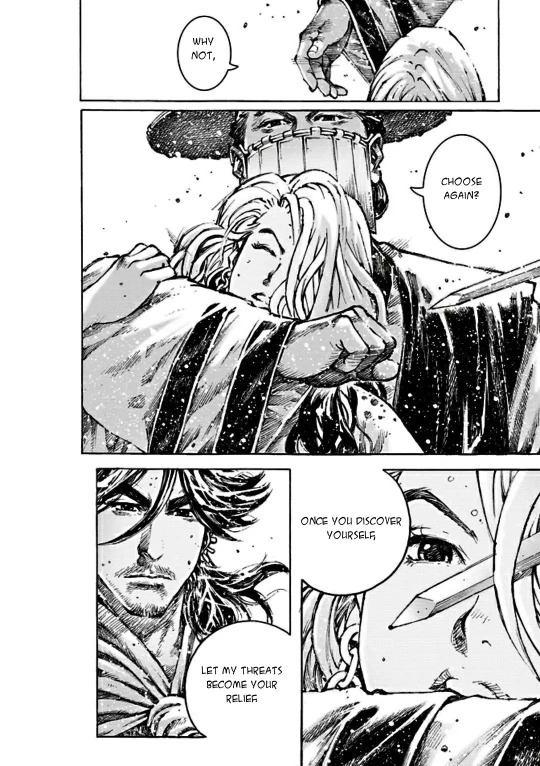
Note: that this analysis will also involve speculations to nail the point that it is centered on the character introduction and that this analysis also includes the opinions of not only me but other members of the community as well.
The first things first, let’s start with the definition of the terms that will be a subject matter in this text.
By nature, contradictions are the details that by themselves prove the wrong of a system that they inhabit, thus efforts are made to avoid them like a plague, as it is strongly believed that any combination of statements, ideas or features will crumble if it consists the inconsistent details – it is considered as an antonym of “confirmation” for a reason. They also tend to make perfect counter-arguments.
Ravages of Time argues that not only everything is consistent, but also from the point of view of the ones that are trying to assert the ideas, said ideas can be built on contradictions, can consist of contradictions, and said contradictions could be used to secure the system. It is still better to hide that fact from the masses to avoid the confusion
(Strangely enough, inconsistencies within the writing of RoT actually enhance its consistency)
A foil of a character, on the other hand, is a tool of the story-telling. It is certainly similar to the “contrast” in artworks, as it is supposed to highlight character trait by placing it near the opposite character train – common usage is the calm and pragmatic sidekick next to the hotheaded protagonist.
In idea, every character can foil any character in the story, so the key part of foiling is the interactions of the concrete personalities. In this analysis, I will explain as to how Ravages’ manages to connect the threads indirectly, through the organic mirroring of the circumstances and affiliations.
Let’s get started.
From the perspective of the governorship or leadership in general, “contradiction” and it’s acknowledgment was always one of the fundamental parts of The Ravages of Time – be it either Cao Cao’s campaign with the image of corruption, which was motivated by greed, for the greater good or selfless selfishness of Sun clan that was aimed at the fundament of the corruption that is the Han dynasty (ironically, against their contradictions) or Liu Bei’s fake image of a saint or even assassin Liu Da who seeks the comforting life through the court by going against himself to the point of forgetting it – everything is chained to the rulership, because that’s exactly what affects everything else.
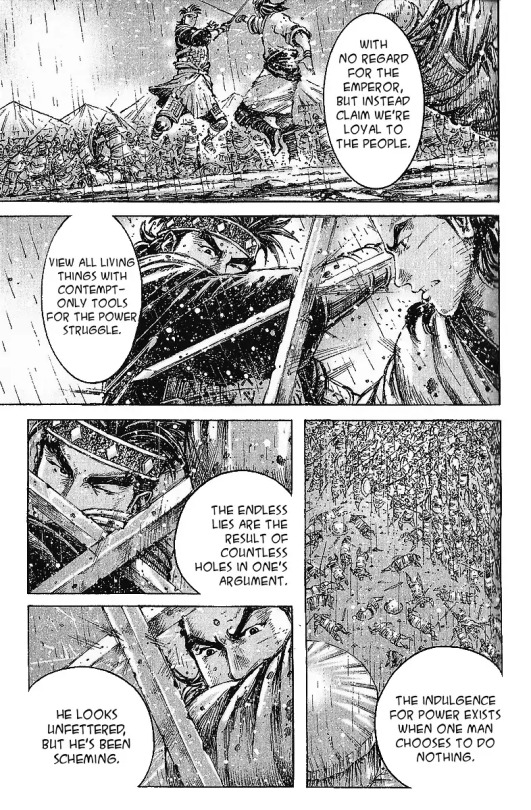
Full embracement of this exact idea – considering how coherent and varied it is with many sides, even when it comes to religion and politicians *cough* LOGH *cough* – is what allowed RoT to stand out among any other war and political drama. And despite the dense story-telling that spans more than 500 chapters, its brilliance is still being polished by not only showcasing the usefulness of this theme, but also the criticism through its shortcoming, which results in the cycle of never-endlessness (and, arguably, the placement of RoT above any competitor, but that’s but a mere meta-talk):
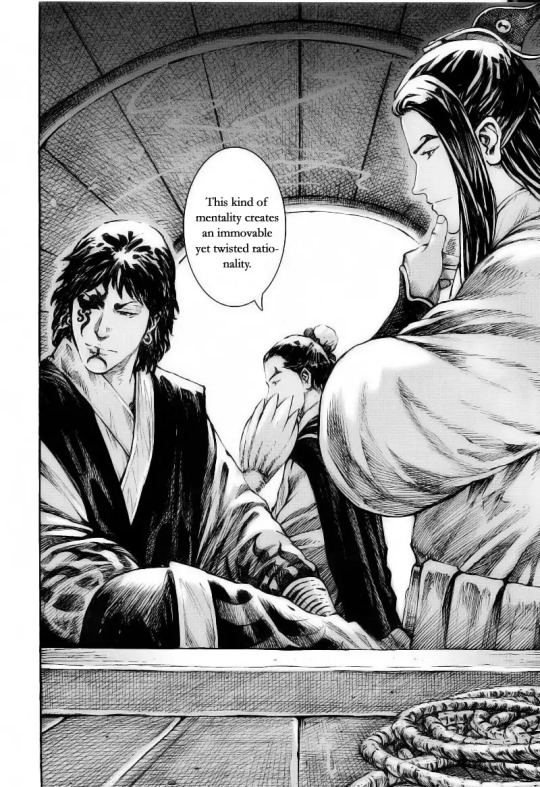
there's the floating text in 372 that appears to praise the down-to-earth approach (associated with Guo Jia) of seeing humans as being more crow-like (with its positive and negative connotations, both nurturing toward their own and vicious toward targets) rather than dragon-like (with associated images of nobility and grandeur), offering the suggestion that perhaps the thing about humans is that they aspire so much (and as it's insinuated, cause so much trouble in the process) without realizing their station and limits and how such ambition and greed are nonetheless part of how they are in the world
now it's not made completely clear how this monologue is connected to Guo Jia's stances, but perhaps one way to establish the link would be to assume that if Guo Jia doesn't have a lofty view of humans, he could embrace the path of ruthlessly carrying out the reforms one insists on (never mind if others accept them or see them as virtuous), hoping for the best that perhaps at the end of the day things could work out (and someone could pick up the pieces the morning after once he's gone and this is where Xun Yu is supposed to come in, the comfort after the chaos)
what Zhuge Liang takes exception to is the notion that the comparison of humans to crows (even if it's a useful corrective to the boastful comparison of humans to dragons) somehow justifies the brutality of the process of pacification... thus the counter retort that people are people, crows are crows (of course this too assumes that Zhuge Liang knows better about what it means to be human)
and this brings us to the 'immovable and twisted rationality' that Zhuge Liang decries (even if he concedes that some sort of peace that is to say the peace of a pacified population desperate for anyone to impose clear order and guarantee safety can be founded on ruthless subjugation as historically attested in the rise of empires and regimes)
Guo Jia (and by extension, Jia Xu and Sima Yi and others like them) wouldn't mind exploiting and perpetuating that rationality so long as there is a convenient path to quelling the unrest (which they see partly as a result of greed and ambition that form part of the human condition) and putting in place some sort of reform to help manage the chaos
on the other hand, Zhuge Liang still believes that humans can be guided and governed by virtue, that loyalty discourse can be used not simply as a cynical method to prop up the ruling order, but as a moral principle that prevents needless bloodshed (yet he finds himself in the compromised position of having to wage bloody crusades but under a righteous banner)
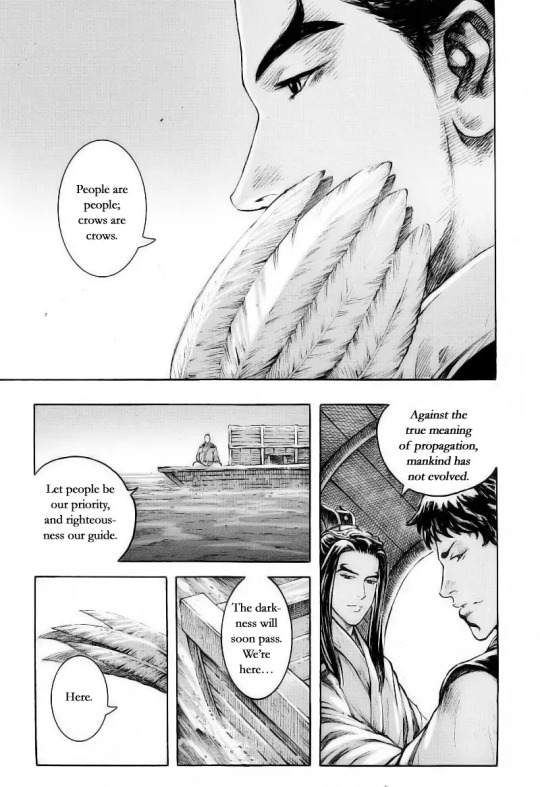
This basically serves as a set-up to what will RoT shift into and who will be the main actor of the following arc. So, in the same way as Zhuge serving as a foil to Guo Jia, the Eighth Genius is being introduced in his arc and the Eighth will even get focused in the following arc. In the Red Cliff arc Eighth did exactly what Zhuge was doing prior to active participation – judging the conflict and “reporting the weather” – and yet he fails to predict the seventh (well, at least, he waited longer). This dynamic will be further established at the end of the Four Commanderies arc and as of now, we need to completely dissect 8th’s introduction, to have a deeper understanding of what will their discord stand for. All in all, each and every sentence uttered by his mouth is quite worth the attention.
at this point, Zhuge Liang outweighs the 8th in terms of reputation and narrative placement (not to mention that throughout the series, Zhuge Liang has been the one guy most in touch with the rest of his classmates on the sidelines and the one guy the other classmates either admire or dread or want to compete against), though the 8th's status as a shadow counterpart to Liaoyuan Huo (because of the Zhao Yun angle) makes him parallel Zhuge Liang (who in turn serves as the mirror collaborator/nemesis to Sima Yi) in one respect in that both have strange ties to the eponymous duo of Ravages
in addition, the 8th parallels Sima Min (in being the last and shadiest on the list of 8 illustrious names) and possibly the 8th eccentric (assuming this member shows up and fits the pattern), and in terms of outlook he can be compared to Yuan Fang
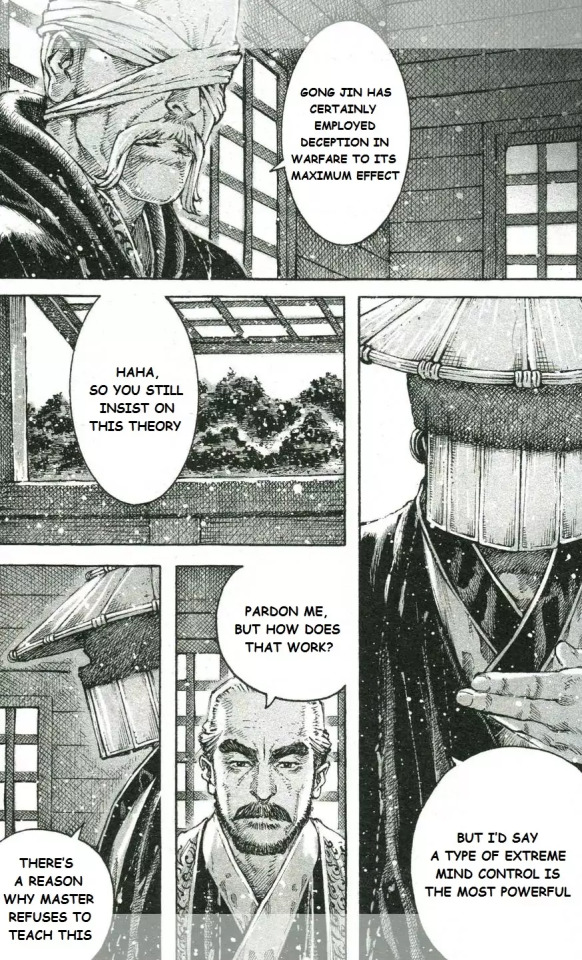
Another thing that we need to pay attention to in the Red Cliff arc, though, is Eighth’s interest in mind control (as we know, character introductions In RoT reveal a lot about the characters) – as Water Mirror says, to subdue the enemy without a fight is the strongest method of war, but the eighth insists that the method, that the evil cultists are so infamous for, is actually the most productive one (probably because avoiding the war merely keeps the people safe, but is not satisfying – it is not doing anything to enhance the condition of them, as it won’t save people from themselves), but even if one won’t give in to the temptation and derail from the bright path, these techniques are leaving everlasting negative effects on person’s mind.
So, if we were to speculate, the most likely theory is that the Eighth learned said methods, which ties to another theory of him being the renowned scholar named Zhang Song (that being said, I'd rather see Zhang Song as another character altogether (whether the 8th takes that alias later on or just cooperates with him/them since I'd rather see duplicated names than merged characters)), but let’s talk about later on.
But… why and when did he betray the expectations of his teacher? The first one is rather easy to guess. It is about his ideology of individualism – instead of waging meaningless wars with tons of unrecorded blood being spilled, which would also limit everyone else’s desires and freedom (represented by Fang-er), that comes from the natural craving to the anarchy of human nature, whenever it is caged in order, why not exploit and weaponized and control vices and viciousness of a person? Instead of forming a collective mindset, why not try to understand the mind of every single individual? Instead of relying on brainwashing through moral propaganda, why not have faith in inherent human selfishness?
Him being an assassin resonates to this idea very well, because he is doing everything on his own and is not commanding a mere group, collection of people. He is doing things alongside them, understands them, and is, in fact, closer to reality than other classmates. Sure, Zhuge, too, understands the nature of his surroundings, but he is still a man of principles and his viewpoint is stuck on that – growing colder to actually personal human interactions and yet he is the one who values a human life the most (this mirror’s to 8th’s apathy, despite him acknowledging the personal desires in an individual)
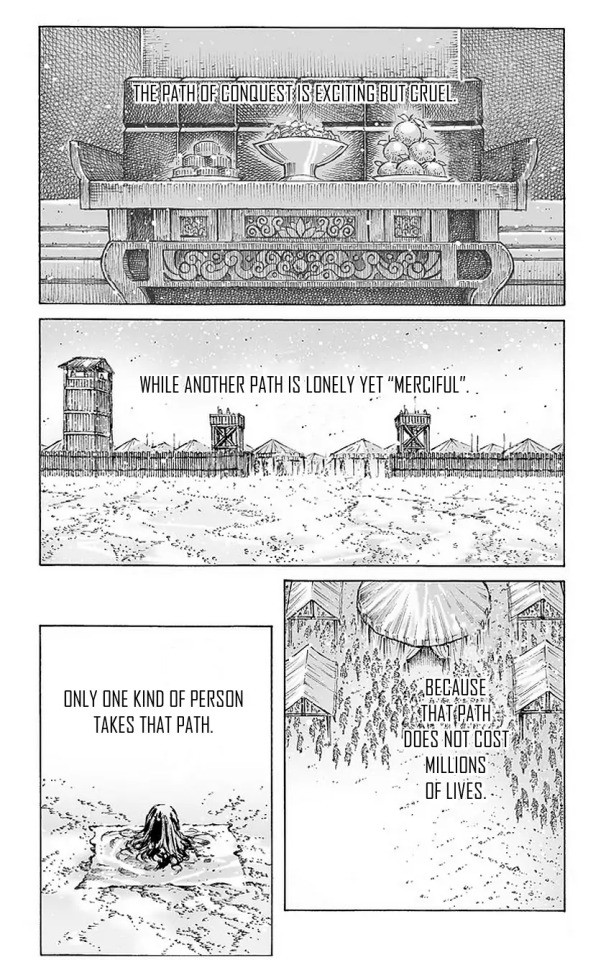
To be fair, he is more of an assassin than any other character with the same profession in this story, because he actually lacks identity as nobody knows who he is if he won’t reveal everything by himself and, funnily enough, he is free to hide his identity even if he were to choose a warlord (also, he does not really HAVE TO be devoted to any of them and choose as many he wants to choose for the sake of his plans, which would mirror 7th’s “devotion until death”) and he could attach to himself whichever identity he wishes. Lack of identity was fatal in the hands of Sun clan and lethal in the hands of Sima Yi, whereas they still had some kind of connections, so now imagine how peculiarly promising is 8th’s potential, who does not seem to have any attachments.

I may as well rightfully declare that his lack of identity has a gargantuan perk to counter the cynicism of history – Whatever he does will be judged by future generation’s own assessments, yes, but if 8th’s real identity remains unknown, no one will know to whom they are supposed to connect all of his actions that he committed with the identity of others, hence the perpetual inaccuracy of historical records. Akin to Yuan Fang, who is an original character of Ravages of Time (the difference being, that if Yuan Fang has an original identity, 8th can “grab” identities of actual historical figures and get away with it)
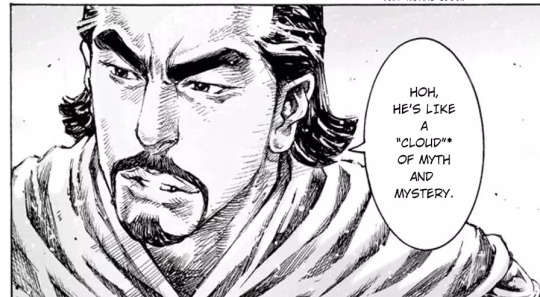
As the last student, of course, the similarity with the first student Yuan Fang (well, his “lord” was chosen instead of him, by being a son of Yuan Shao – that selfish romantic really had no chance to CHOOSE to live for himself with his loved one, huh?) is apparent. Aside of the fact that Fang was connected to the cultist, he was also trying to practice the art of survival, (which he did not manage to perfect, thanks to his daddy) and even being able to kill people by his own hands (as much of a prodigy as he is). But ironically, (which can also be considered as a contradiction) the simplest desires are the root for the grandest ambitions and at the end of the day, Fang proves this point of 8th that self-serving desires may even seduce someone to achieve grand visions, he is delving into the corruption, rather than taking care of “his” people individually. And, after all, 8th does not really resemble to romantics.
Well, it won’t be fair if I do not mention that Zhuge (by torturing people) and Zhou Yu (by being a sparring partner of Sun Ce)… and even Xun Yu (by slapping a wolfneck)… are more than capable of doing some things by their own hands.
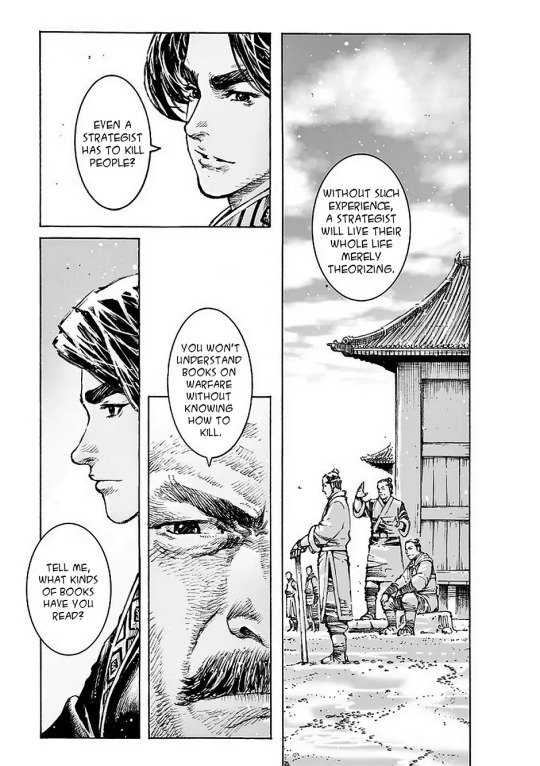
So far we can feel free to say, that 8th is not being seduced by desires (take a shot every time the eighth contradicts himself and yet never stops making sense) and he is a quite unemotional human being, considering that after the death of his oath brother he did not really look affected, remained perfectly calm and rational – basically took a duel out of respect and Yun’s lack of stamina. You could argue that he had his mask on, so it would have been hard to notice his emotions, but he instantly gave orders of retreat after the death of “the lord” and it was also implied that he does not really connect well with others.
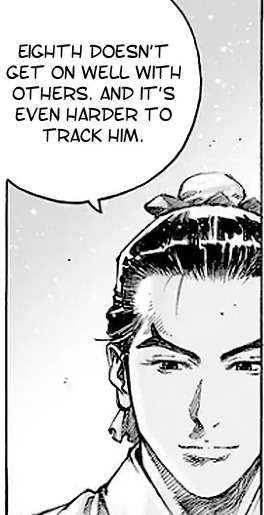
He wears the mask of a caring person, while Yun wears a mask of an uncaring person.
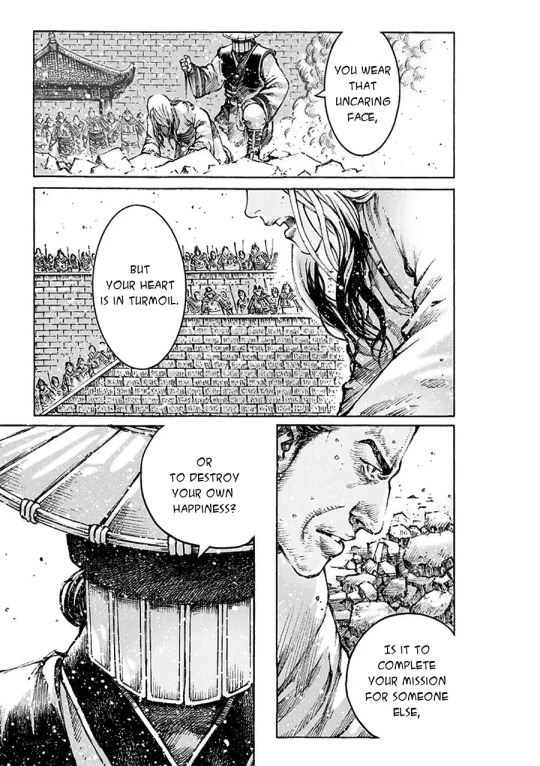
(Honorable mention of his ability to rapidly adapt to the situation – which should be coming naturally to a person who is a good judge of double meanings (pointed out by his hand signal first and then by “he discovered the secret of various books in the world”)
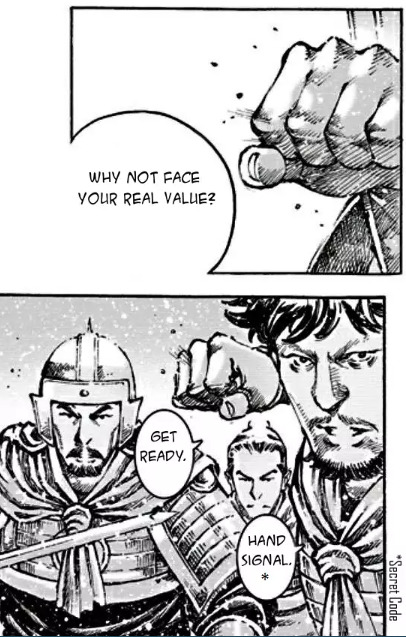
It is quite fascinating to see such a person to be aware of everything and be appealing. In some mediocre stories, he would have been extremely childish and overdramatized at it, lacking any kind of human decency. On the contrary, 8th respects his enemies, is quite affable, acknowledges the contradictions within the human nature and acts according to it, and does good deeds for others (“repair your shed”), even if not unconditionally – as he is a morally grey character, and not ham-fisted at that.
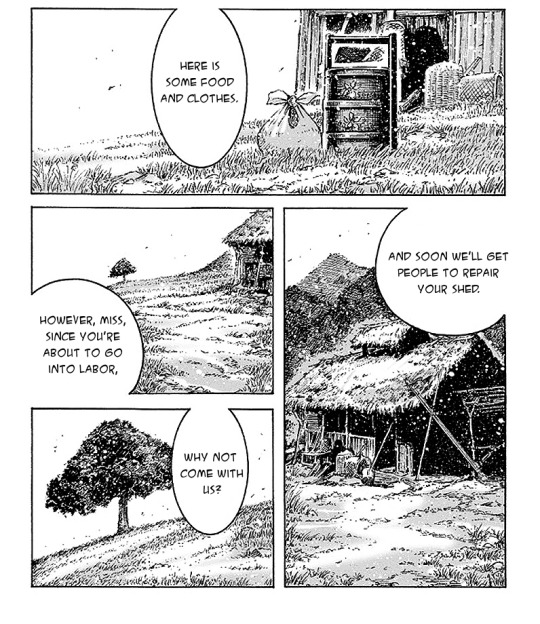
This brings us to another philosophical part of his views – the value. “Feel helpless all you want, it won’t do anything for you”, every individual has their own, but to attain said value they first need to realize what their defining uniqueness is by themselves, instead of relying on either someone else or heavens and then act on it, make use of it. They must make a choice whether they will be “childbearing” tools or… weapons. To me his reaction (or lack of thereof) to this line of his oath brother “undertake its duties when called to the office; retire otherwise” felt like he (oath brother) completely lost the value in his (8th) eyes, by not only being enslaved to the whore for naught all these years, but also clinging to the brother (when he could have just let the woman infiltrate Shu). This page here can also be easily interpreted as if someone should trade their own valuable people, but it can also mean that people should see the value in whatever they have, whether they be items or loved ones, and cherish them.
So, in short, you do not need to imagine yourself (self-delusion) as a god-emperor to give yourself the value and be content to live.
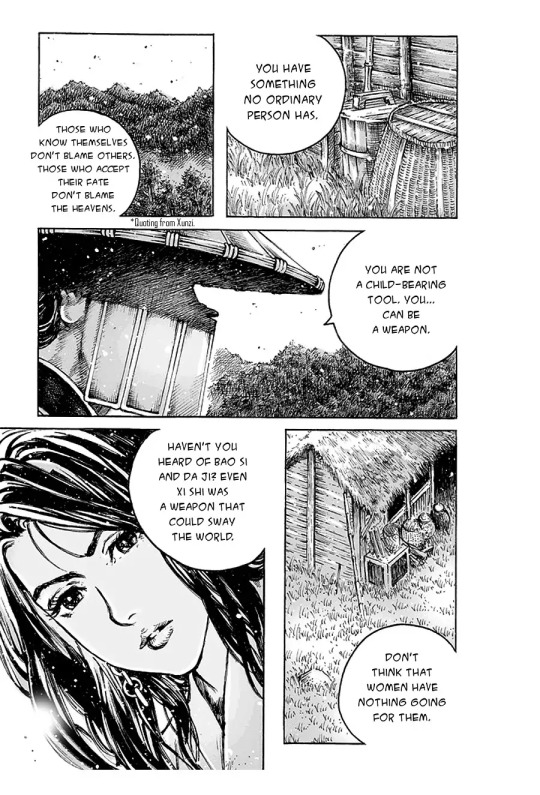
Above we discussed how 8th is encouraging and guiding others towards seeking the value in themselves, but that is not quite all, is it now. Sure, you find value in yourself and the people around you, but the said value needs to be defined by something. To apply 8th’s standards, the more benefit is from someone, the more is his or her value. And even if she was merely being traded for a lovesick man, she still had some value in her.
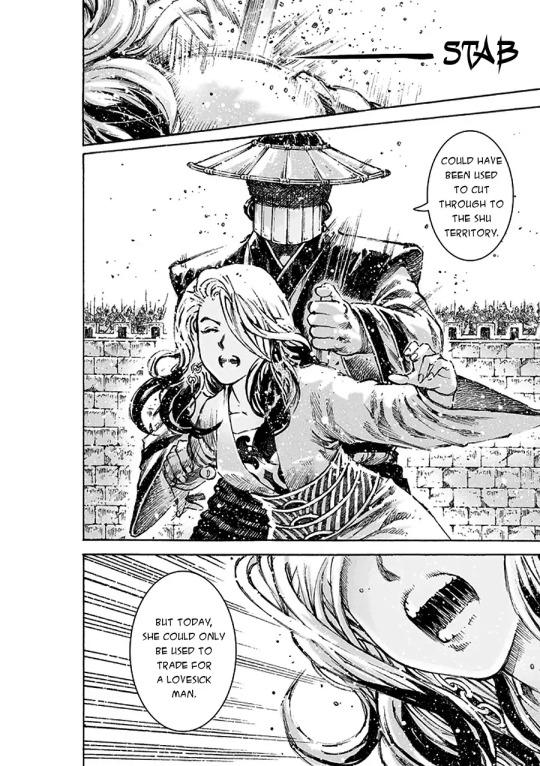
He is acting as if he does not view people as objects, Yun is acting as if he does not view her as a loved one (material value against the emotional value)
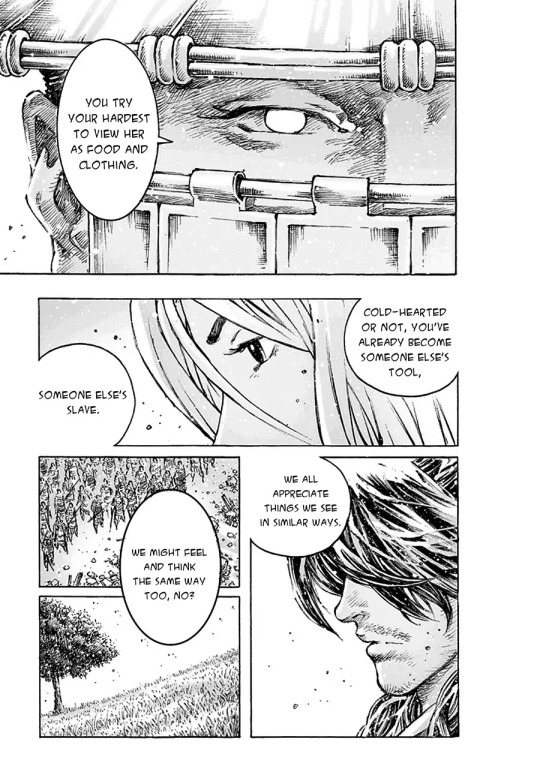
Infiltration of Shu is quite obvious with all of these details and that freely be interpreted as if 8th is focused on Shu, but we could also take it as a hint that he has tried and may still be trying to plant some moles in other factions as well.
In addition, he usually talks whatever is necessary without much care to his actual intent, which not only results in an interest rabbit hole but is also a very intriguing character trait and a means of manipulation. Reason for that being the fact, that most of what he is saying is actually… true. Yes, his words are self-serving. Yes, his words do not reveal what his actual motives are. Yes, he is purposely aiming at your most vulnerable topic. But he is the only one telling you the truth about yourself and he is the only one giving you the freedom of choice towards what you crave.
The beauty of the 8th Genius' dialogue with Zhao Yun to me is that, despite all of his words being self-serving, they were probably the most honest words Zhao Yun had ever heard. Even Liu Bei or Sima Yi never mention the fact that Zhao Yun has essentially been a slave all these years, who has given up on his happiness to fulfill the wishes of others. And yet here comes this unknown man who manages to get to the very depth of Zhao Yun's character in a mere couple words. And to make it even more beautiful, Zhao Yun faces these words that cut him to the core head-on, and not only acknowledges them but in the face of these truths and in the face of a final chance at his own happiness, he chooses again to remain a slave for the sake of someone else's desires. And that's what makes the 8th Genius so enticing to me. If he can get to the bottom of such an enigmatic character like Zhao Yun in his very first appearance, I can only imagine what he'll do later on.
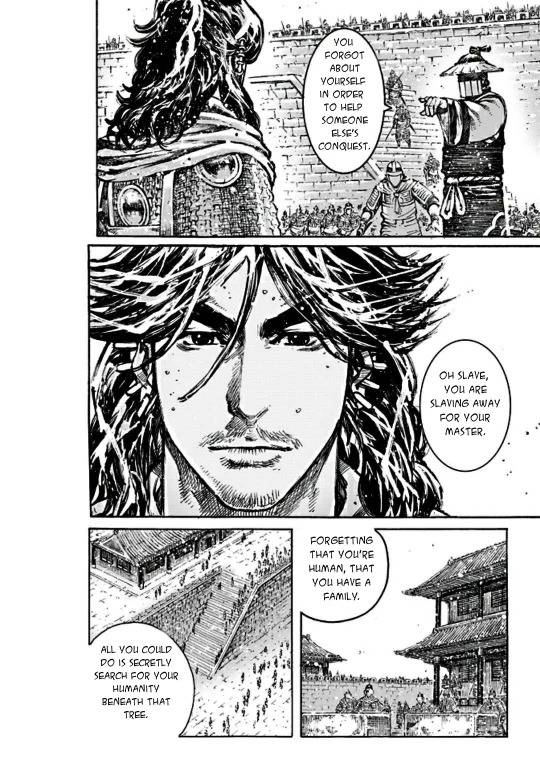
Though I have to note that the 8th isn't the only one to have confronted Liaoyuan Huo with a dilemma... Zhang Lei sort of did that in 293, Liu Da offered something similar in 384 (the difference I suppose is that whereas they challenged Huo to choose between 2 masters, the offer of the 8th, even though less genuine, is for Huo to choose between serving a master or walking away)
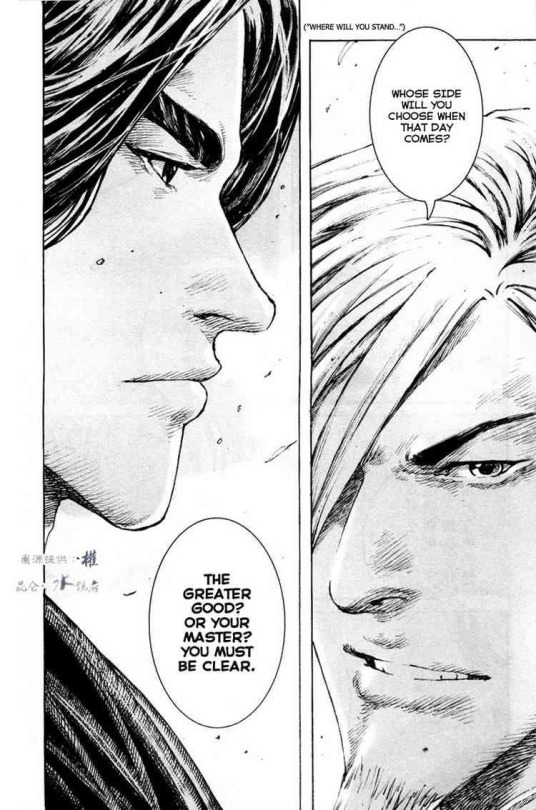
in another note, it's important to stress that if warmongering is the problem (especially if we consider that what usually happens when regimes wage war as a distinct form of mass conflict unlike popular uprisings and insurgencies is that pacified populations are coerced or cajoled into expending their labor and lives to feed machines of organized violence that mainly benefit a select few) it's not a matter of who wins or loses since the game itself is rotten regardless of goals and intentions
Alas, one other issue is that many cut ambitious conquerors (especially if they exhibit charisma and are on the winning side) some slack, while those motivated by ideology or principle (especially if they're losing) are selectively denounced as zealots for trying to push a program
And yet who doesn't like heroic tales…

That’s how the 8th stands out among his classmates mainly in terms of how his rhetoric focuses not so much on principles and ambitions (even Zhou Yu's attachment to the Sun clan involves sticking by some notion of continuity), but simple and personal desires and choices – which fits the narrative of the Four Commanderies and analogically makes it stand out among the other arcs. It is an arc, which highlights the how empty is the shell of people, who are getting defiled by their own egos or thorny roses, beneath the surface of their facade and how some of them stop, start listening to the voice of reason and thus develop into respectable men while maintaining their individuality. The unconventional part that elevates this arc into being a masterpiece is the fact that even protagonists may have a facade and in overall, not every facade is shallow or/and they do not serve solely the corruption.
Sure, I talk a lot about the comparison with Zhuge, but these details were brought from this exact arc that is not even focused Zhuge, but aside of masterfully crafted indirect hints, Four Commanderies put on a table way more than just that. The obvious one being the personal conflict with Zhao Yun, which I already mentioned:
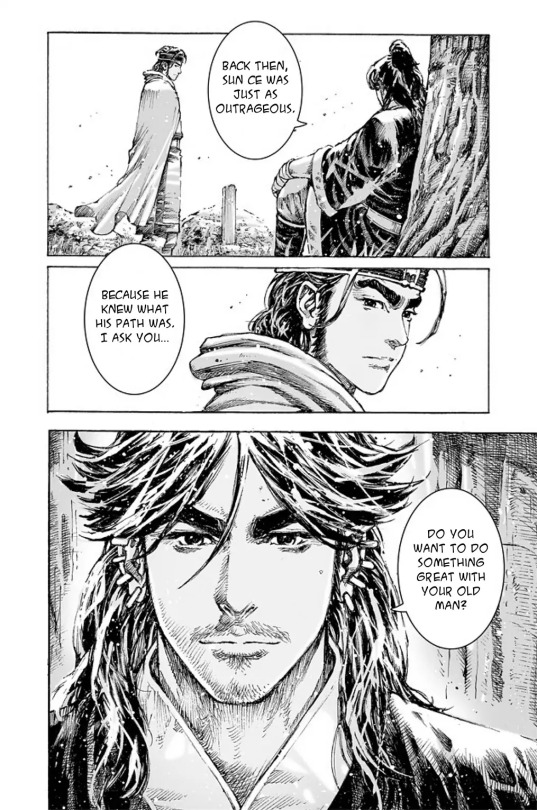
There 8th “asked” Yun to choose what’s his actual happiness, his own life or someone else’s path (that is burdened with failure) – little did 8th know that from Yun’s perspective it did not really matter what he would have chosen, because of how both of these choices are important for Yun as a person, how both of them are what he is craving for and how both of them are going to enslave. And he can’t even choose to not choose, because he would be going against himself in ANY case. As cold-blooded as he is, Zhao Yun got numb by making the best possible choice – “Three days. More than enough”. Truly, 8th failed at psychological warfare (and even if had an upper-hand in a duel, it did not really matter), but admitted that Yun made a right choice, without explaining himself – I think the existence of Zhao Tong made the choice correct. When a father and a son met, both of them found their “pieces of jade ornament that can be traded for cities” (note how Yun compared his son to Sun Ce – that was rather delightful for Tong, considering that no one was taking him seriously whenever he was comparing himself to Sun Ce). That was quite well symbolized by the lively tree near Yun. Usually, whenever a life-changing event happens in his life, he is near a dead tree.

After all, Zhao Yun is already used to selling.

So many lives that he cared about are no more, what’s one more.
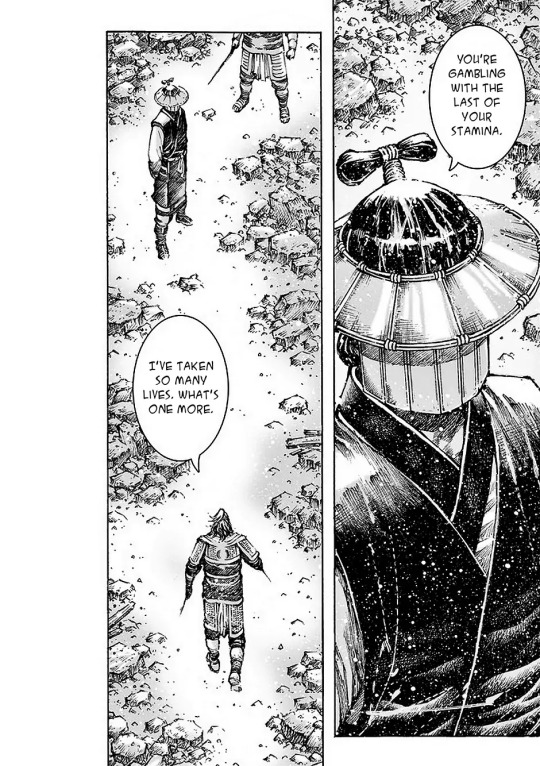
(And if I were to fanboy over him more – “Huo” did not really return after the warrior’s duel (named as “a path of no return”))
Briefly to come back to Zhuge, the one who basically pulls some strings behind Yun – when 8th mentioned the facade of the “greater good”, I was suddenly reminded of a saying by melancholy 7th about “benevolent realists” when he was talking about how people like to shield themselves with “FOR THE GREATER GOOD”, while in actuality they are masked egomaniacs. But if Zhuge says that people use “greater good” as a mere excuse (as he always dislikes the certain type of people), 8th remarks that these self-proclaimed paragons of virtue (such as 7th) are merely deluding themselves and the concept of “greater good” does not even exist.
In short, lying to others that you are a savior vs. lying to yourself that you are a savior

If you think that the introduction of this character is already great enough, you need to get prepared, because the revelation, that completely recontextualizes these events into something even more meaningful and profound, is yet to come.
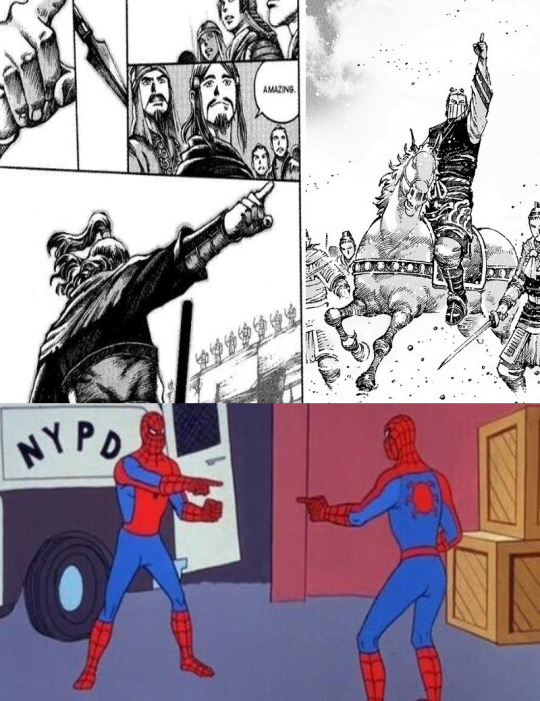
When Yun remembered the bits of 8th’s backstory from his memory, 8th pointed his finger to the sky, a call-back to that scene when Huo was named as Zhao Yun and that, as far as we know, cemented him as the perfect foil to Zhao Yun and now demands from us to re-analyze this precious arc of his as the mirrored life of Liaoyuan Huo from two respective points of view. Considering the fact that Ravages of Time is exploring the history and human condition as a theme, then it won’t really be a surprise if I would define “mirrored life” as if they were the alternative versions of how would Huo’s life continue if he were to choose different paths of life.
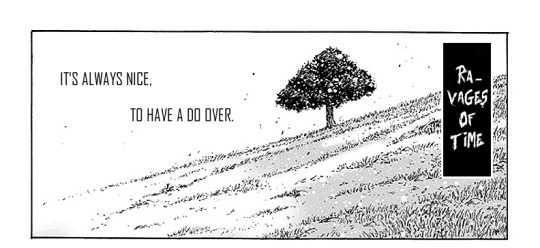
1) Zhao Fan’s case is rather easy to elaborate on. He represents the “pretentiousness” (by compensating his lack of masculinity and love from his loved one, through the pretense of just babbling hollow words (merely citing others), as he is not capable of doing anything else) against the “reality” of Zhao Yun (less talk, more action attitude of his and plus the playfulness that is hiding the coldblooded nature beneath the surface).
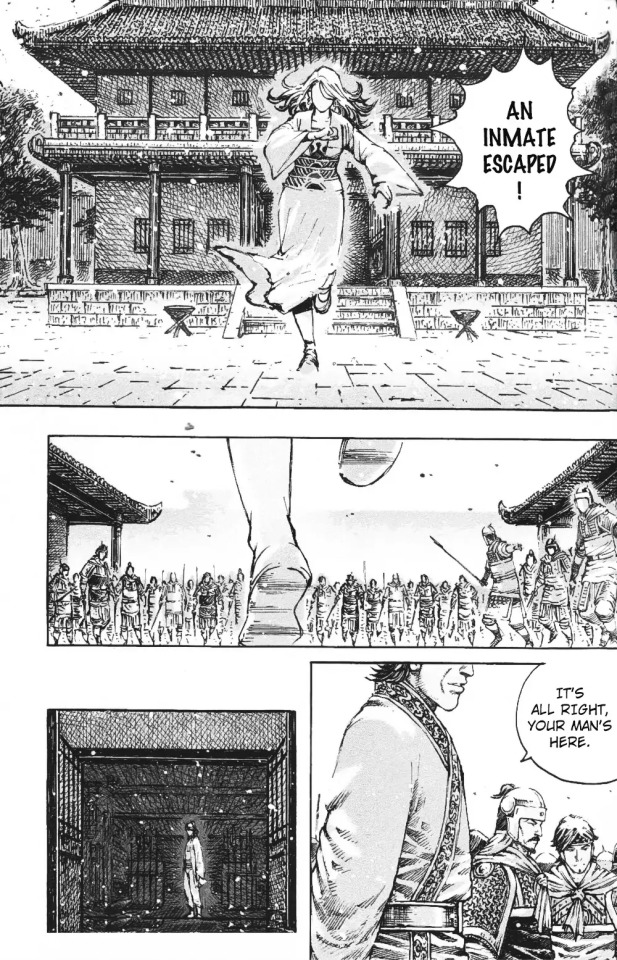
That pretentiousness would define Zhao Yun as well if he was not so hardened by the high amount of struggle he lived through and later be polished by Liu Bei. Huo would have been in his place if he were to come to his loved one instead of Xiao Meng. But that would come with its own negative consequence, as he would not have been loved.
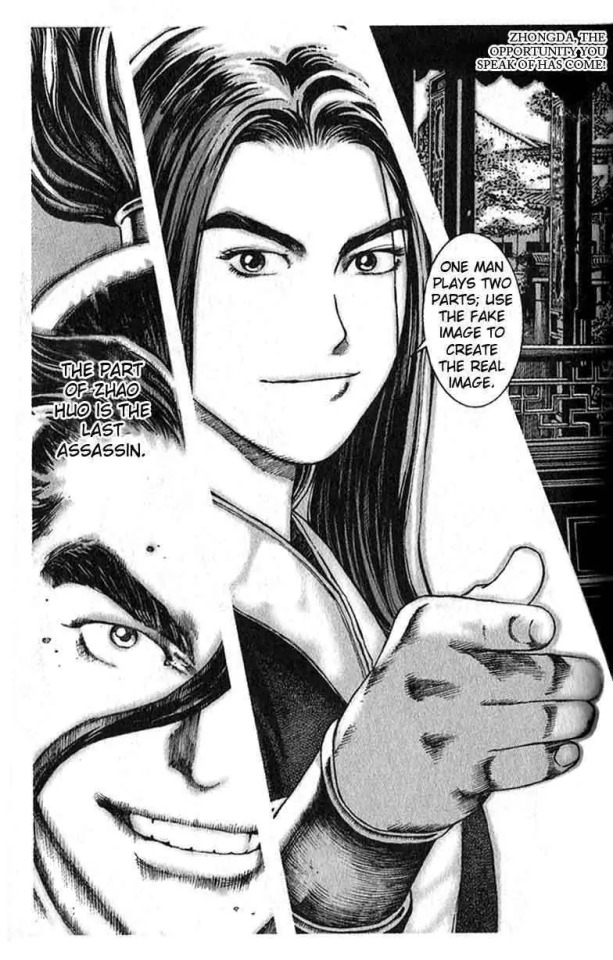
2) 8th’s case is a bit complicated. They do share the path, but with the polar opposite approach. “Sharing the path” is amusing on its own right, though. Huo took the name “Zhao Yun” and will get recorded in history with someone else’s name, but the guy who was born with the name “Zhao Yun” won’t be recorded in history with his own name as well. Still, his name will exist in history, but it is going to be a guy, who’s completely different from the original Zhao Yun. Talk about an identity crisis.
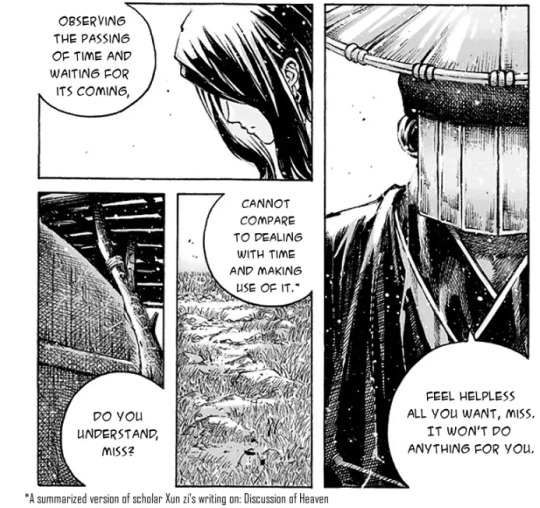
“observing the passing of time and waiting for its coming, cannot compare to dealing with time and making use of it” – This throws us back in time, as far as the early chapters go, when Yun had an internal monologue about waiting for someone who would change and save the world. Around that time, 8th was persuading Huo’s loved one about how meaningless it is to just wait for something. Perhaps Huo would have undergone 8th’s path if he were to study as a genius to save the world instead of waiting for someone else to do it, but at the end of the day, he managed to understand where he belongs to.
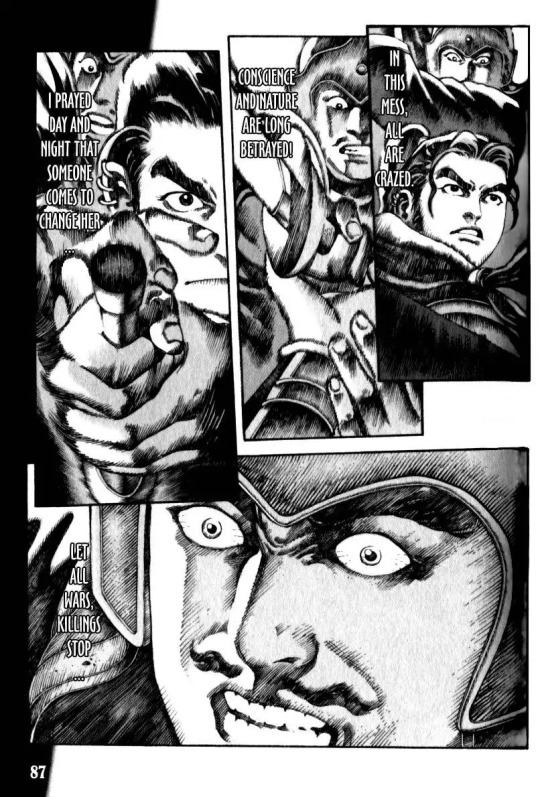
Huo was waiting because he did not see himself as someone who could really make a difference in the world (“if martial arts would have made a difference, then the key positions in the world would already be dominated by various schools”). Meaning, that only “grander” things affect the world (such as Jesus and Dragon). but 8th begs to differ, with an argument that the delusions of grandeur should be broken for people and that even “books”, as tiny as they are, can affect the masses (for example, how Sun clan was hiding the true Art of War for themselves)
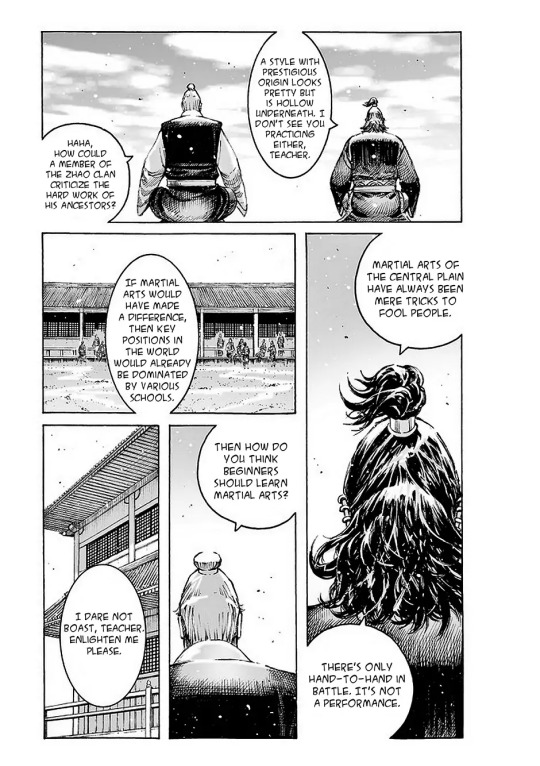
“what we need to learn now is observation and patience” – still paid off in Huo’s case and so it did for another Yun as well, as he was busy all these years, observing not only the human nature but the hidden meanings and uses of certain things, such as the literature as a tool of lying (“you won’t understand history without knowing how to lie”). This also foils how Zhuge was “waiting” and cultivating the illusions about Liu Bei for all these eleven years.
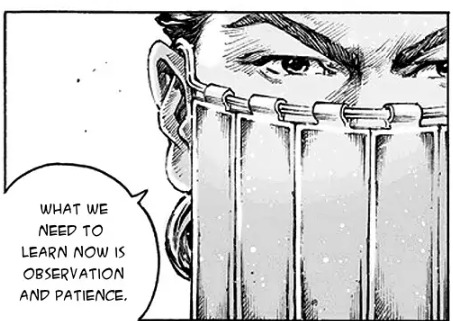
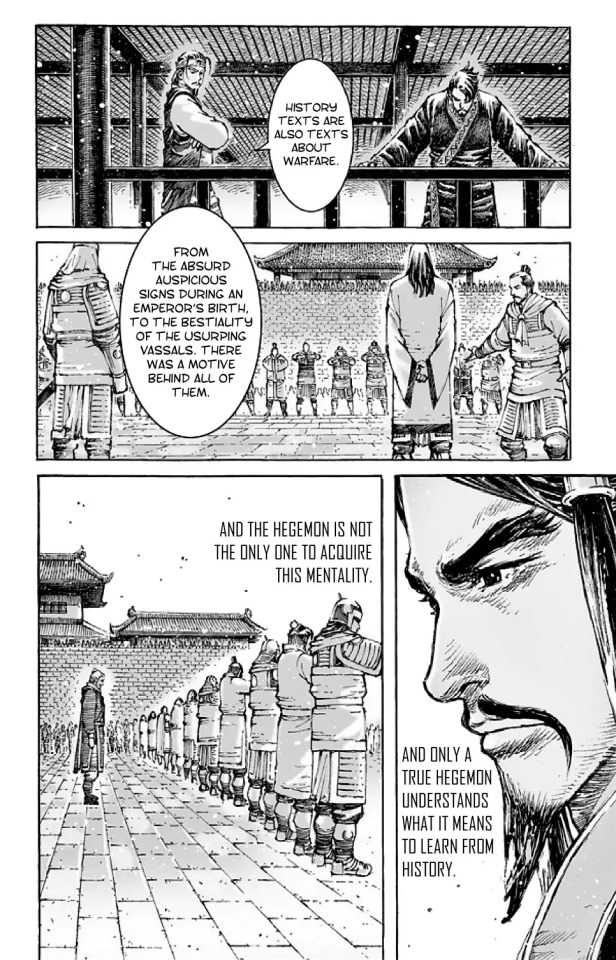
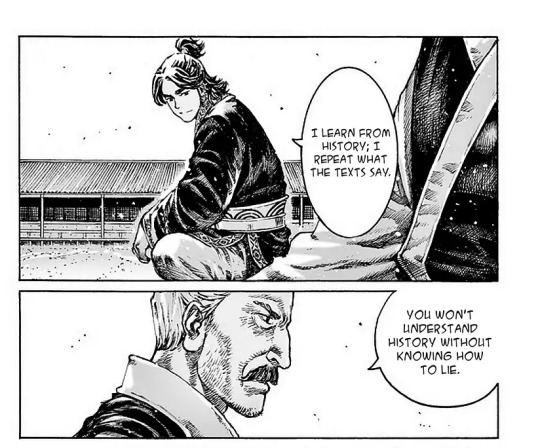
It is quite ironic and contradictory when 8th is talking about how important it is to know “where one stands” and yet he lacks identity and that helps him to stand (“infiltrate”) in any faction, at the same time. But us not knowing the identity of 8th further empowers my approach. Matches well with Huo trying to suppress his emotions and forget himself, thus becoming numb and losing his identity, as he won’t even get credit for his heroic deeds.
Basically Zhao brothers can be seen as the Yun’s identity crisis, a conflict between his duality of nature (Fan – wanting a normal life with his loved one. 8th – wanting to go with Liu Bei). And Huo killed Fan by his own hand, so killing the “longing for a personal happiness” also took a life of his loved one at the same time, by 8th mirroring his hand.
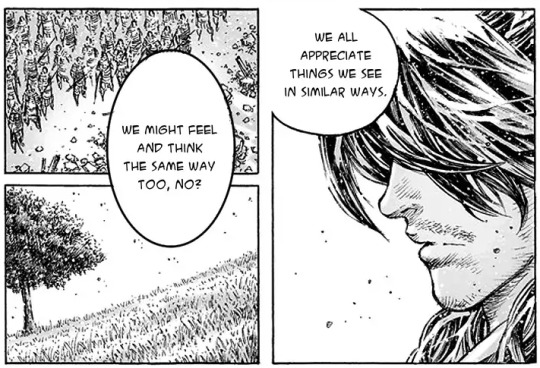
(8th casually hinting that both of them are named Zhao Yun)
The point of mirrored life is that he was always suffering, is currently suffering, will continue suffering, and would have suffered even if he were to make different life-changing choices in the past. But he will continue to live and will carry all the weight, as he already accepted it. It is as realistic as it gets – no matter what you are going to choose, the history is going to fix itself.
As to how similar 8th is to Liu Bei, we can talk about that right now. Meanwhile, 8th was judging the character of an assassin, Liu Bei was also being busy by judging the character of another Zhao and that, you guessed it, allows US to judge 8th as the mirror of our Chinese Jesus as well. To begin with, it is implied that both of them have two oath brothers so that comparison is not really far-fetched.

On the surface, both of them are good at judging the characters and while they are at that, none of them are using their real identities, but the substantial difference between them is that – Liu Bei is using the identity of being the cult of a personality, while 8th is not using any identity at all; Liu Bei is giving away a sincere brotherly love, thus gaining help from them on their own accord and that is something 8th is alien to (Zhao Fan was enslaved to his desire, rather than the aspiration of his brotherhood).
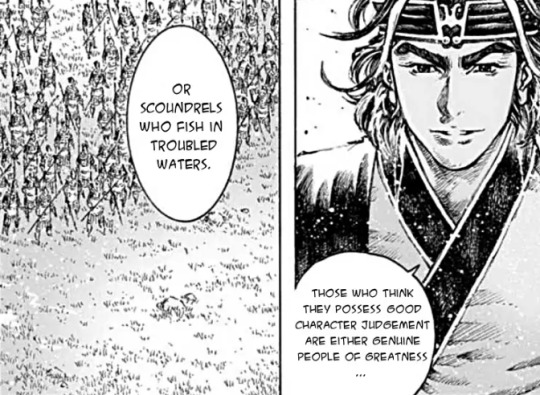
Now it should be noted that even if Liu Bei is getting a warm love and help from his oath brothers is a good thing, of course, Chen Mou has not forgotten that even such kind and heartfelt intent/actions can be harmful to the lofty aspirations. I also daresay that there is a great potential of showing the enormous flaws behind saving the world as a cult of a personality.
The first is directly connected to the relationship between the “savior” and the masses – there will be a part of people, who will have an urge to completely become reliant to the “shelter” that was provided to them and not only lose the sense of individuality in the process, but also get so soft in the process that they won’t be able to stand on their own again so easily.
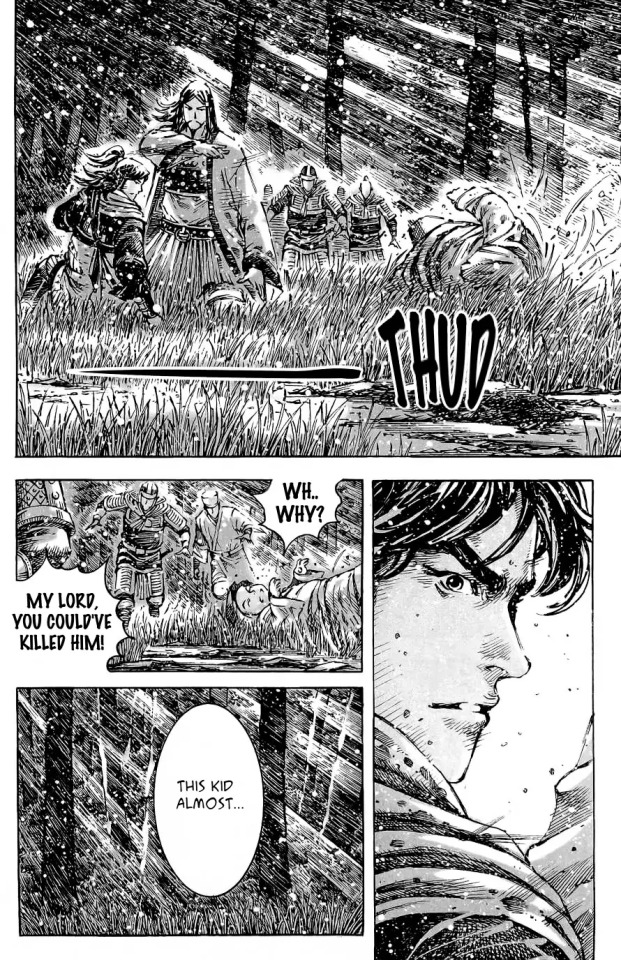
The second problem comes exactly from that and both of these could be depicted in RoT through Liu Shan’s character arc – for the world to be shaped as in the eyes’ of Liu Bei, he has to alienate himself from the garden of earthly delights and the human beings themselves, thus he himself will become a tool, who will only be able to care about his comrades-in-arm. After all, he values them more than his own son.
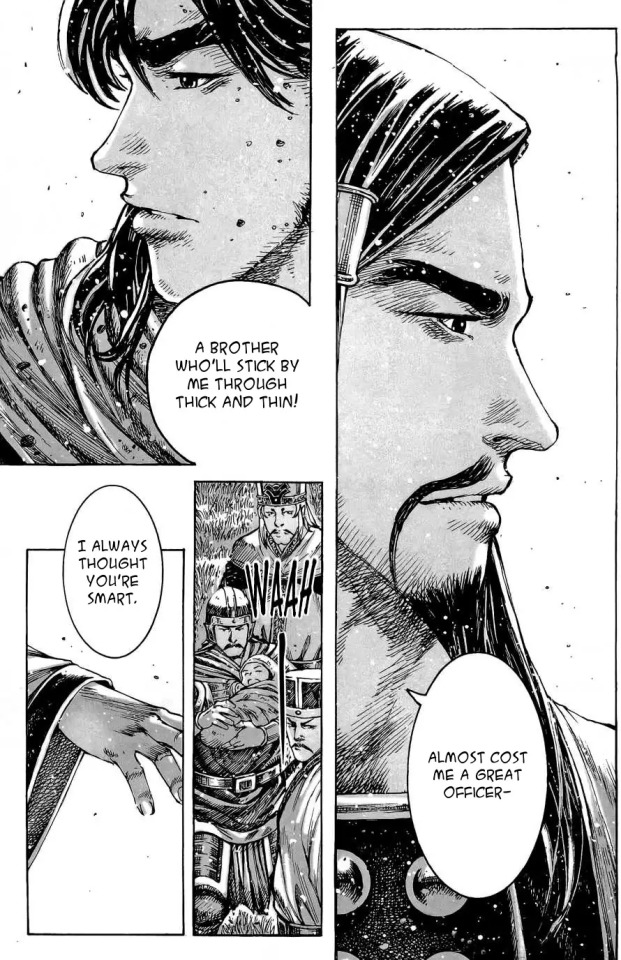
Right in the queue is standing a dragon (aka, not human) Zhuge Liang, who will also drag Liu Bei’s son to the moon. Moon of course represents the principles of Zhuge Liang and he is going to nail them in Liu Shan’s mind so much, that there will be no one to take the child on earthly adventures to gain necessary experience about the reality and human interactions. After all, Liu Shan is neglected to the point of being used in schemes even as a child. Although the role of Sun Shu in this ordeal is still a mystery.
One thing is clear – without Sun Shu, Liu Shan is going to become an anti-thesis of 8th’s ideology.
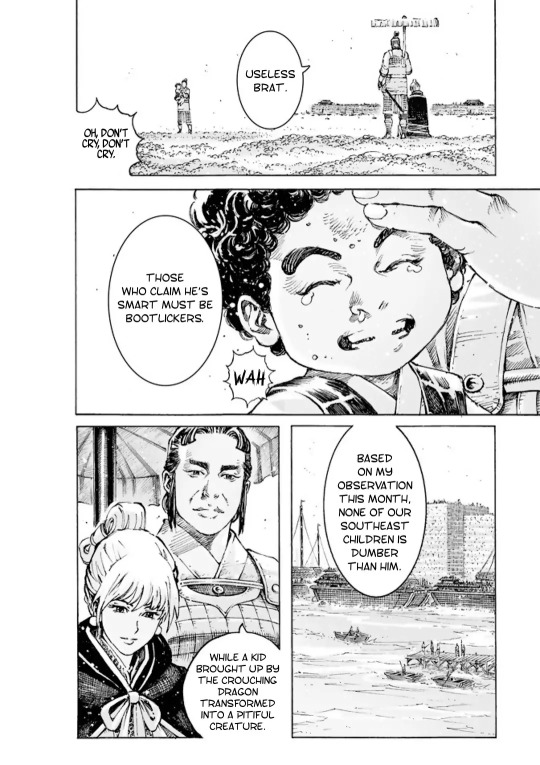
To have a clear idea and understanding of what I am talking about, you could always watch that Ghibli movie named “The Tale of the Princess Kaguya”. The Emperor there is so out of touch, he is not even aware that he should not touch women without their consent.
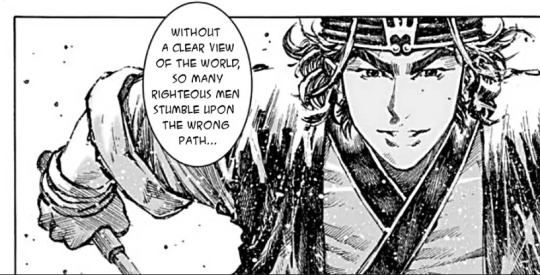
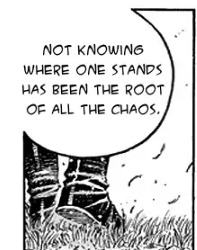
8th’s ideology won’t result in such degradation, but Liu Bei has his own arguments against that world-view. If 8th blames people for having the delusions of their own grandeur, Liu Bei says that people have delusions not about their own selves, but about the world itself, as to how it is “structured”. So, people are not defiled, they are just following the wrong path and guidance could fix that. Zhao Tong depicted as someone who is not being as educated and well-read as Liu Bei further nails the point.
(Thanks to the translator Merc, who told us that this idea was conveyed through the wordplay that was lost in translation)
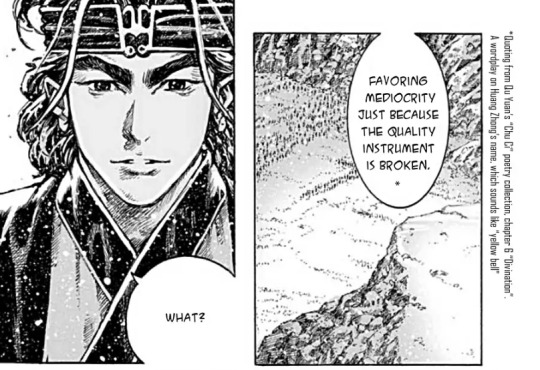
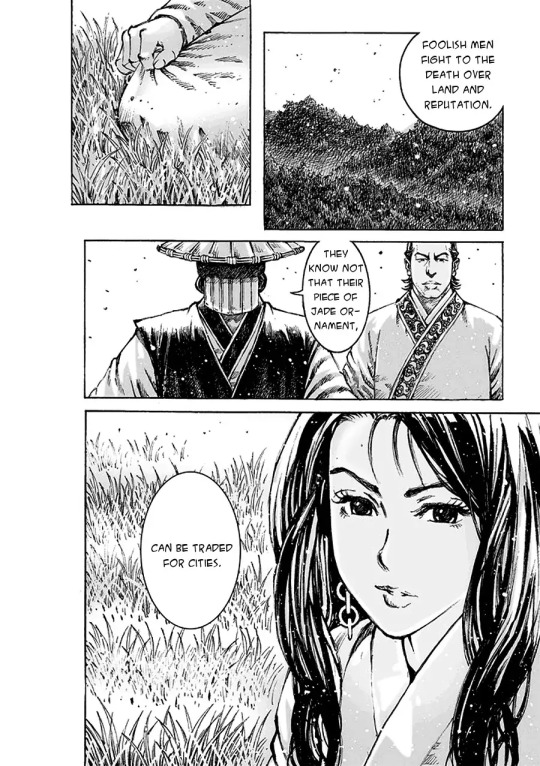
Surely, they won’t settle about the definition of the right path so easily. If 8th thinks that people should start valuing whatever they have and whatever they are able to do. Basically, the idea of saving the world won’t ever be fulfilled, because the world will only be saved after people save themselves – Liu Bei answers that one does not have to choose necessarily a mediocrity (in 8th’s case, broken people that he chose, such as Xiao Fan) and give it a value, just because the world in their eyes is ruined. Basically, gems still can be found in every corner, but they won’t polish themselves, so the world is still worth saving and could be saved if only we showcase what they can value.
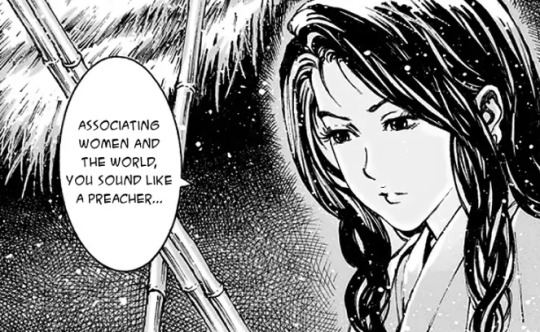
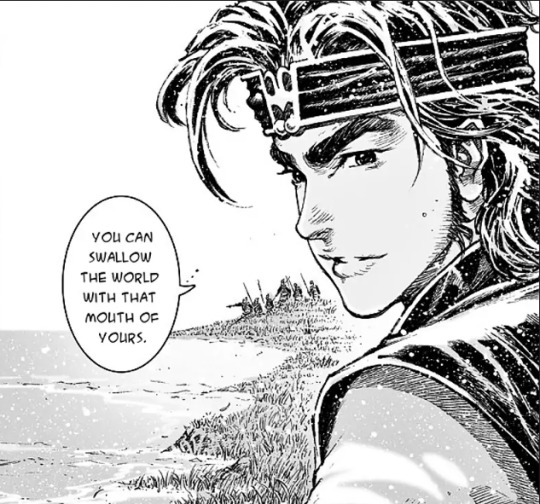
In short, 8th thinks that everyone could have their own things to find value in, but Liu Bei wants to create one general “shelter” that everyone will find value and solution in (and our boy Huo got both)
What makes the feud between 8th and the Shu compelling could be summarized in two features
1) When Cao camp is full of elite soldiers who were trained for what they are doing and Sun clan is fully family oriented and thus chains the family members, Liu camp is full of opportunistic individuals that choose their path on their own. On face value, 8th should be quite fond of them, but divergence comes when the said individuals view someone else’s path as something grand and enslave themselves, forgetting to why even they want a better world and are sacrificing themselves just for someone else. Despite that, they still remain as somewhat respectable in the 8th’s eyes.
2) The inherent duality of men, as both of these approaches find their justification within the human nature and, at the same time, it also serves as a counter-argument to each other – in times of order, people are going to seek disorder and in times of disorder, people are going to seek disorder, hence comes the pivotal point in the dynamic between 8th and 7th – If one wants to make use of human’s longing for peace through crafting the fake cult of personality, which will achieve stalemate and turn into status quo, another one wants to make use of human’s craving for desire through the dispersion of their delusions of grandeur first, by which people would lose interest in waging meaningless wars over meaningless lands and reputations.
After all, “winner takes all” is but a surface level aspect of how Ravages of Time deals with its roots - Poetic tragedies, with proper emotional baggage to convey the horrors of war and an exploration of the inevitability of history and the meaninglessness of our struggles when confronted with it.
Of course, we are not finished here, because aside from Shu, 8th has enough potential to foil Sima clan as well.
Let us start with Sima Yi himself. I'd argue both are exceptional men from powerful clans destroyed by forces beyond their control. Sima Yi being set up by Pang Tong and Sima's destruction changing him irreparably into a darker man. Like Hamlet the main driving force of the story is his revenge and just like Hamlet his actions unknowingly cause a similar tragedy to his own occurring. Sima Yis actions destroyed the Zhao Clam just like Pang Tong eventually destroyed the Sima as a scapegoat. Both attempt to gain revenge and return their clan to greatness. Yet while Sima Yi joins a future kingdom the eight opposes one and fails with his oath brother being forfeit. The irony being that Sima Yis entire life changed by one tragedy yet he doomed another man like him to the same fate unwittingly at the very start of the series. One was Zhao Yuns best friend while the other is arguably his most dangerous enemy now. I think there's a surprising amount of similarities and parallels between the two even this early. Oh, and both killed a woman Zhao Yun loved. Sima Yi by inaction and the eight in a moment of direct revenge. I'm perhaps not articulating this the best but the aptest dramatic comparison I can think of is he's the Leartes to Sima Yis Hamlet. Whether they will end up having the same conclusion as those two characters is up in the air though.
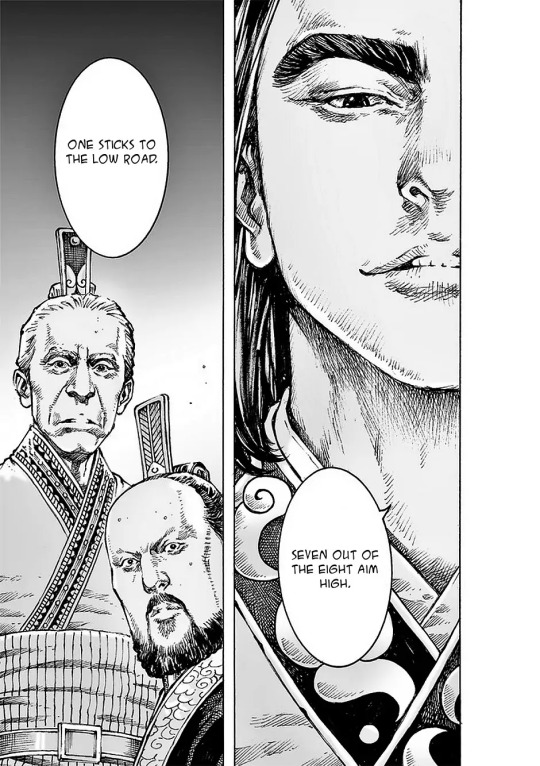
And meanwhile, 8th was concluding his not-so-grand spectacle, another member of Sima clan was introduced in the story – Sima Min, who is also an eighth member, rather polite and even was detached from other seven for quite a while and are considering as some kind of anomalies. After a line “seven out of the eighth aim high. One sticks to the low road”, even comes a hat of the 8th, whom we, in fact, described as someone who stands out by sticking to the low road. If I were to speculate, Min is going to be the one defending his own brothers, but 8th is going to be the one attacking his own brothers.
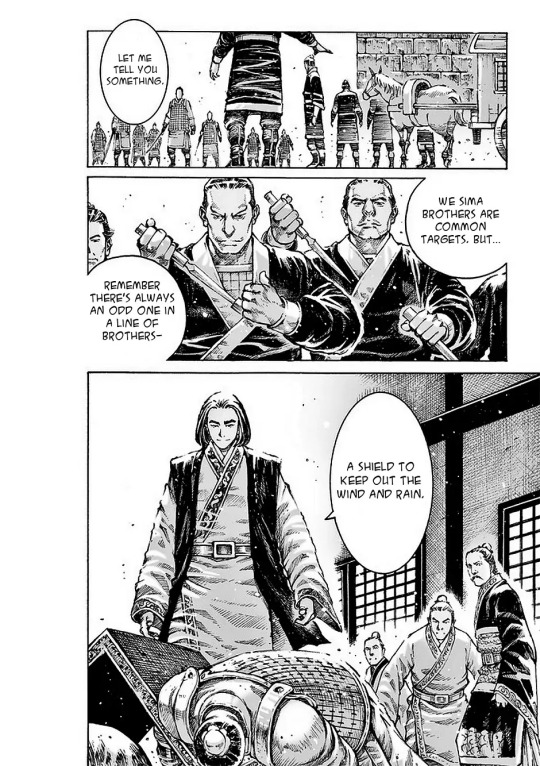
Both of them also serve as the premises for the next arc, even if they are not participated much in it, as of now: “Breaking the tradition” and the lies behind the books about warfare.
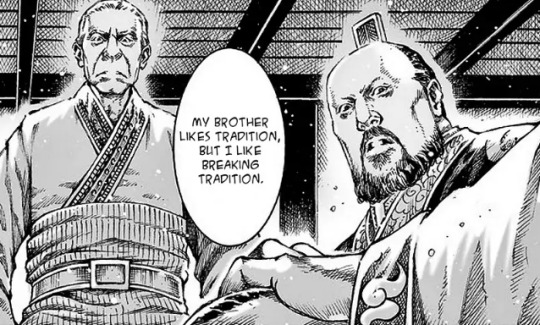
Now let’s come back to the long-postponed theory-crafting of mine.
-In the 468th chapter was revealed a dungeon that was used for torturing people. It belonged to the 8th who was gathering information about the routes of Shu. Then in 483 was revealed that Zhuge Liang had the exact same dungeon.
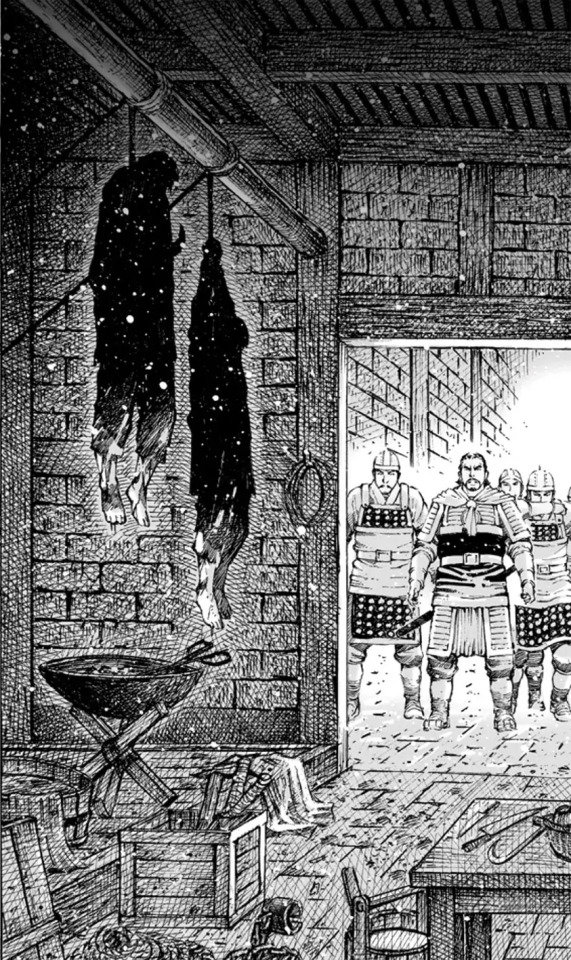
-In the 480th chapter on the other hand was revealed that Zhang Song was brought a fake map and thus Zhuge, who thought that Song was aiding Cao Cao, set a trap for him. There was someone special near Liu Zhang who was manipulating the information as if Liu Zhang was incompetent. That was a trap for Shu.
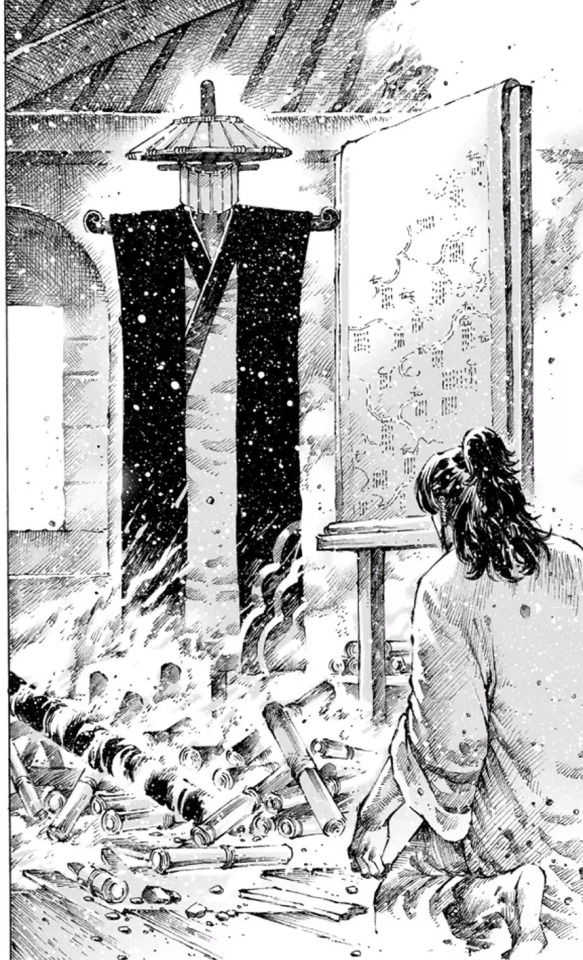
-Now in 483th Zhuge started a discussion about Zhang Song and 8th at the same time. After all, in the 468th chapter was also found a map, which was most likely made by the 8th. Key point was, that both of them were made in the same style, thus were made by the same person. The difference was, that the map made for Shu was fake, and the map made for 8th – was legitimate.
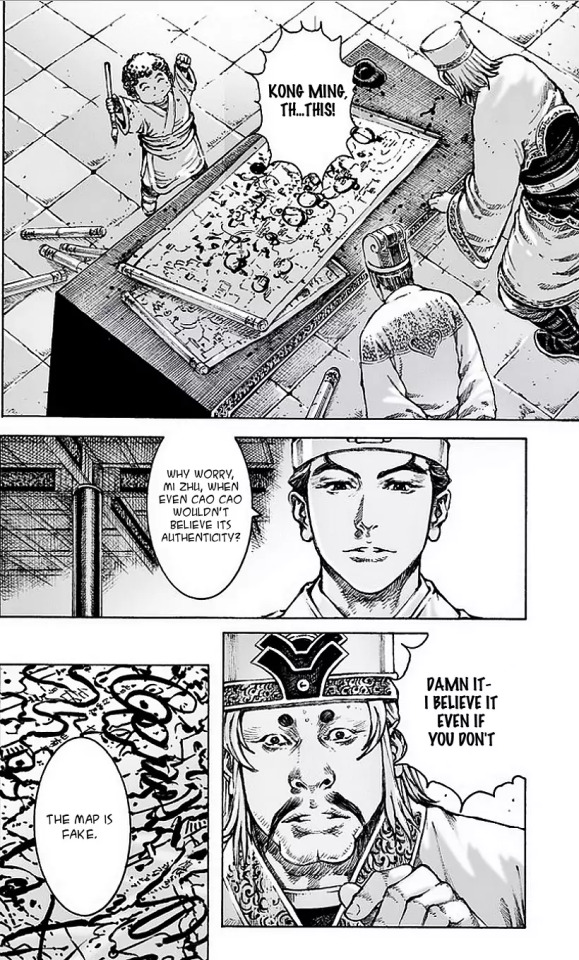
-At the start of the 483 chapter, Zhuge mentions how hard it is to track 8th and unless he announces his name, no one will know and yet, as a result of what was mentioned above, Zhuge deduced that 8th indeed graduated. Meaning, he has actively participated in the ravages of time already.
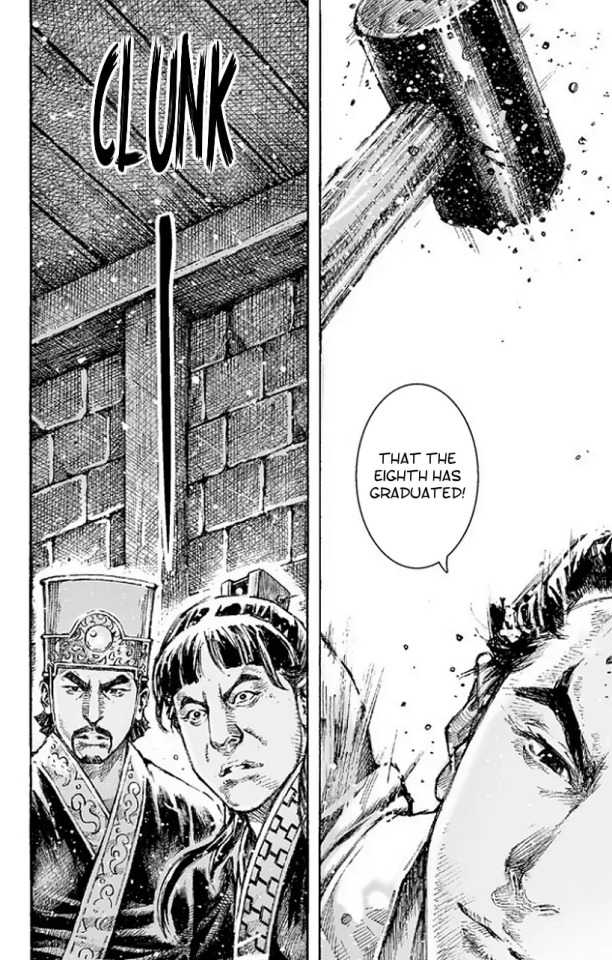
-In 483 Zhuge also did deduce that this man was merely “named” as Zhang Song. Meaning, his actual name is different. Now, how did 8th managed to convince him to not reveal that even after the torture session is a mystery. I can only think of “eccentric magic” (which I think is exactly what 8th needs for his plans, but it is also something that he wants the least) or heavy psychological pressure (considering that one guy with the damaged psyche in his chamber, chapter 468)
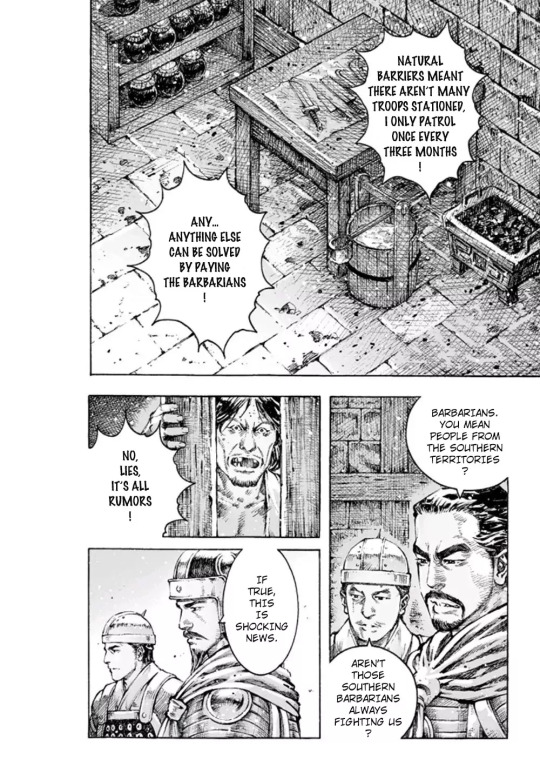
-Even more interesting came into the play after several chapters. It was revealed that there is another Zhang Song, who was aiding Ma Chao (who was also getting help from the Sun clan) and whose face was not revealed suspiciously. Why would there be several people with the same name? That’s rather CLOUDED (excuse the pun). One thing is certain, 8th is behind Song tricks, whether he is the one using that name, is actually named that or is cooperating with original Zhang Song – is another mystery. Zhuge did ruin his plans AGAIN (was it the third time?), but he still is cultivating his influence.
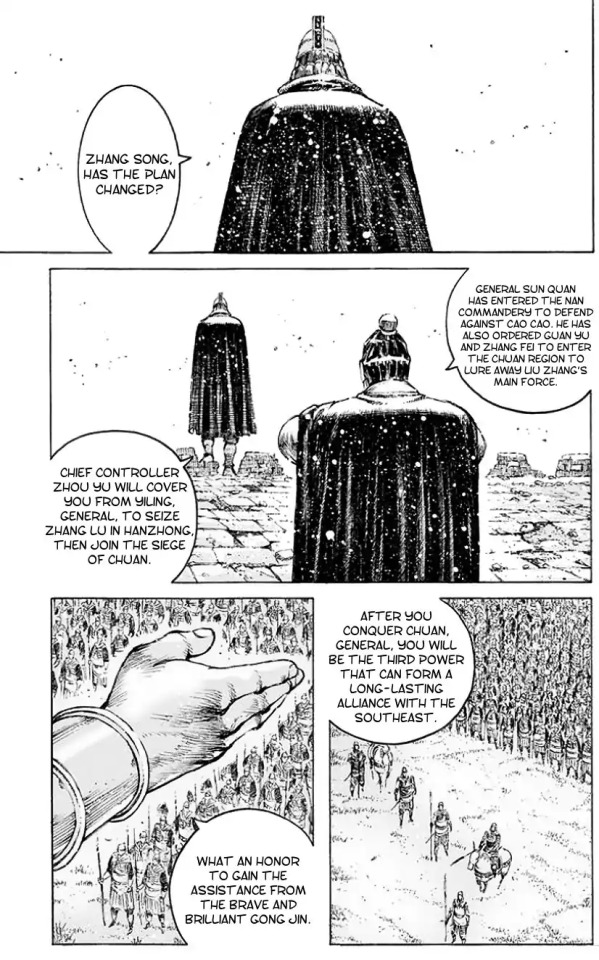
To conclude the analysis, let’s get back to the titular topic with a little hierarchy.
On the first level, there are stories with a black and white morality. Usually, black side is cartoony cynical, with no redeeming qualities and white side is cartoony idealistic, with irrelevant flaws (being hot-blooded and etc) – and the Ravages of Time even features such “stories” in deceptive schemes and labels them as “propaganda” (social commentary)
These “black” sides sometimes tend to be “justified” as if they were realistic (for example, for some reason, it is ok to have such characters if the setting is in the middle ages). Such explanations completely ignore the fact that no fiction is realistic and that every “realistic” being has redeeming qualities.
On the second level, there are stories with seemingly grey morality, through the presentation we do not actually see this moral ambiguity, so the presentation falls apart just because the characters’ words (what is talked) and actions (what is shown) contradict each other so much, that story does not seem self-aware anymore – a prime example would be a good guy, who wants to achieve a stalemate, but his actions tell otherwise and no one is actually calling him out on that hypocrisy. Also, everyone he faces is clearly inferior to him from a moral stand-point.
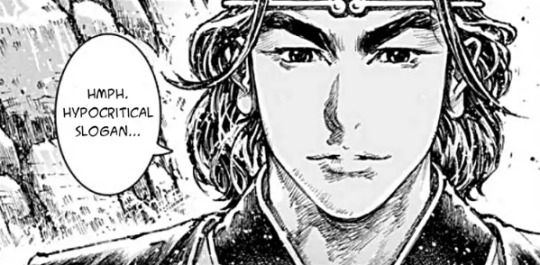
In such stories “black” sides may even have characters that were abused and victimized in childhood and now they are apparently pointing out the flaws in the system by blatantly indulging themselves in atrocities (for some reason). This is not only a cheap emotional manipulation but completely superficial and immature, as they are whining about the system by being worse than it and do not offer any solution to fix the system or a better alternative – they are merely amazed by the fact, that the world is imperfect and cannot accept it.
On the third level, there are stories with seemingly grey morality, but now they are doing the opposite. Characters constantly talk about the loss of humanity for the greater good, but they never commit to it and even if they were to do some questionable things (that most likely are glorified), they would still whine how bad the “greater good” is, despite not finding (or even trying to find) any better alternative. Here lies a huge contradiction in the presentation – It is preachy propaganda of “necessary evil” and, at the same time, does not want to acknowledge it, thus the story has a hypocritical point.
In such stories, “black” sides tend to be THE flaws of the system, with no redeeming qualities. They will be one-dimensionally incompetent and just abuse their power just for the main characters to have an excuse to commit “necessary evil”. In such cases, people tend to close their eyes on them being one-dimensional “as soon as they fir the narrative”. Such readers/watchers forget why it’s relevant for characters to not be one-dimensional – it is not realistic, considering you can be a flaw in a system and still have positive dynamics to something/someone else. It also lacks artistry, considering how crystal clear will the stance of the author is going to be by implementing such cartoony characters in his story. So… if the writing is so implausible… how are we supposed to trust the author on his beliefs and preferences, if he can’t implement said beliefs and preferences in an organic way even in his own world?
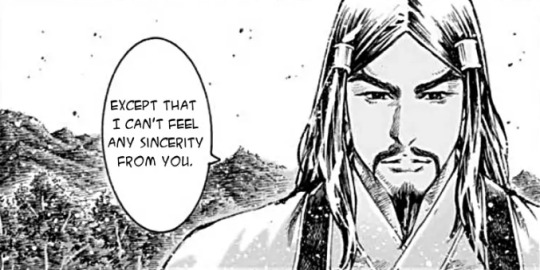
On the fourth level, there are stories with actual grey morality, where every character AND organization has its pros and cons properly presented. Without further complications, focuses on two sides of the conflicting ideas and naturally tells a realistic story, full of plausibility (Eureka Seven and Terra E, as examples)
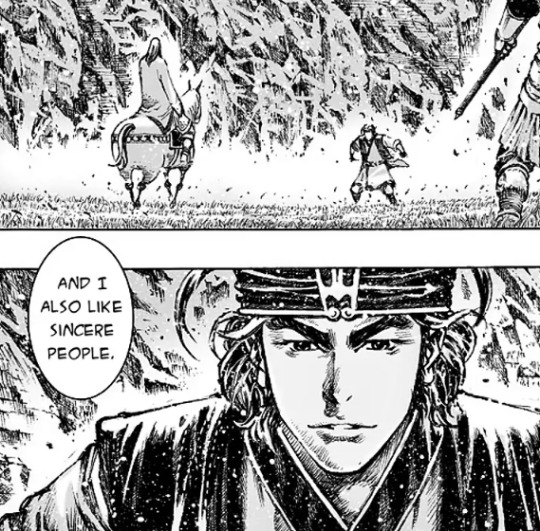
On the fifth level, there is the Ravages of Time, conceptually exploring said contradictions. It not only has more than two sides with full of characters with their own agendas, but they all are making use of various “contradictions” and that is something I wanted to highlight through the Eighth Genius, who is full of contradictions externally, but fully self-aware internally.
Now it is not outright said that contradictions are bad. Quite the opposite – even if they are full of shortcomings, they are also full of benefits and if everything can be used your and someone else’s good, why would contradictions prove the exception? After all, if any effort is futile and doomed, what it all meant to you and how content you were at your death’s bed is all that matters. Which is another contradiction, because on face value, there is no objective reason to do anything if everything’s meaningless, but at the end of the day, you at least accumulated the experience for the future generation, who will also have to postpone the passive decay of the world (but the said shared experience will lead to even more bloodfest, which is unfortunately inevitable in any case)
Failure of self-loathing stories is not seeing beyond the fixed framework. Ravages’ point, on the other hand, is that – contradiction, like anything else (for instance, loyalty), is simply a method and it was set as a framework to fit someone else’s agenda. Of course, merely trying to step out of a framework is not enough, as you are going to meet others who already did that. That’s exactly what’s so alluring about this piece of art – it not only examines a single contradiction with a hopeful solution (Self-loathing Zhuge not raising Liu Shan as a hypocrite), but offers plenty of other alternatives.
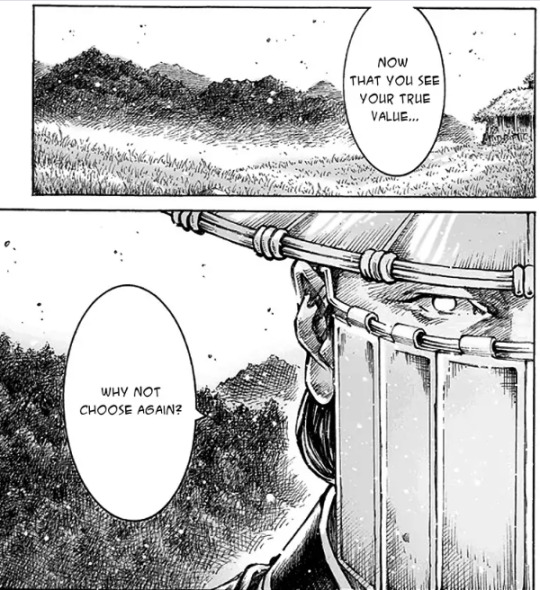
15 notes
·
View notes
Text
Friends. I am so unable to have coherent thoughts about Arrow at this point. I wanted to do a little 7x19 review (not much to say, tbh fuck I lied), but then again I also wanted to do a 7x18 review, and a 7x17 review, and...also talk about Arrow ending and EBR leaving. Yeah, ‘cause I still haven’t managed to do those things.
I keep thinking I have to have all my thoughts in order and arranged before I can say anything valuable, but the problem is my thoughts won’t comply. They refuse to be orderly and arrangeable. (Also I’ve tried just typing whatever is in my brain, too, but all I have to show for it is about 10,000 words of semi-coherent babbling hanging out in my Drafts. Probably never to see the light of day.)
So anyway 7x19 (🤞 that I stay on track here - update: I fucking failed! 😱😱😱): it was okay I guess.
As we draw to the end of the season - of the show, really - a few things keep bothering me, and unfortunately they’re coloring any and all enjoyment I may be able to squeeze out of the episodes so I have to just get them off my chest:
1. I keep getting stuck on the terrible production value. I can’t help it! It’s gotten to the point where I cannot help but see the production as much as I see the story, and it’s so jarring. I see the sets, the stage, where I only used to see the setting. It’s the (lack of) camera angles, the lighting, and the very obvious reliance on sets, rather than location shoots.
And I can’t help but think: it didn’t used to be like this. Seasons 1-3 were so immersive, so atmospheric. Stylized? Yes, but in a way that was purposeful and enhanced the story.
The most recent seasons make production feel only like a means to an end.
I think the production budget got cut a little after season 3, but seasons 4 and 5 still felt epic and captivating enough. But season 6′s production values were abysmal. And I thought it would finally improve in season 7 with the new showrunner, but instead it has only gotten worse and I realize now that it must have everything to do with budget. (And maybe this is my bitterness talking, but I can’t help but suspect that part of it is that increasingly, more and more of each year’s budget is being used to fund the crossovers. 😠)
The EPs seem to have forgotten something critical about filmmaking - production is always going to be a crucial aspect of story-telling, whether it’s intentional or not. There’s no such thing as an “objective” camera angle or edit. Every non-decision has as much an impact on the story as a decision would have, and by forgetting that, they have vastly reduced the overall quality of the show.
Anyway, I feel like I have to make one thing clear, since after all, I WAS ON THE SET and I MET THE CREW - literally shook hands with and spoke to camera operators, lighting people, and all other sorts of production people: they work hard and take their jobs seriously and in no way am I trying to suggest that any of them are bad at their jobs. They were truly lovely and professional and I was so impressed by them. I truly think the lapse in production values is entirely due to decisions made at the very top about money. It just has a very unfortunate, very obvious impact on the quality of the show they’re making.
2. I can’t help but see and lament the effect of OVERPLOTTING and a lack of emotional foregrounding.
I comment all the time about how tight the story was in seasons 1-3:
Big Bads who had a personal connection to Oliver
seamless interweaving of the Flashbacks and the present
a clear, consistent, well-paced evolution of Oliver’s character that paralleled the action/plot
excellently-plotted storylines where all the characters were relevant to the plot - so that we had a reason to care, and focus on character actually forwarded the plot.
a good mixture of villains of the week that were both interesting unto themselves, and provided much-needed wins/breaks in the overarching plot, and allowed for plenty of character moments
generally, because of all of the above, a perfect sense of pacing and an excellent balance between plot and character, where plenty of time was given to dialogue and quiet character moments - which only served to enhance the plot
But then season 4 came along and things went south quickly, mainly due (in my opinion) to writing decisions that put plot over character, resulting in some seriously out-of-character stories that unfortunately had a huge impact on the show going forward. But even aside from Oliver’s uncharacteristic lying and Felicity’s unlikely decision to call the whole thing off, season 4 was already suffering from a clear lack of the things (above) that made seasons 1-3 so good.
It was the first time the BB had no real connection to Oliver’s past, which meant that suddenly the villain arc had to pull double-duty - drive the present-day plot and also somehow establish an emotional reason for us to care. Unfortunately, rather than pulling those two threads together into a tight, single focus, the writers created a sprawling story - a messy, confusing present-day arc and the absolute worst flashbacks of the entire show.
And it also saw the deliberate introduction of more comic-book elements to the show, with Damien Darhk’s (and Constantine’s) magic, which was a wrenching change in tone from the first three season’s grittiness. (I know a lot of the haters like to blame this shift in tone on Olicity - and even I will admit that the suddenly happy-go-lucky Oliver was a little too heavy-handed - but I fully believe the tonal shift has everything to do with the introduction of magic. And, of course, the horrible, clunky, meta-heavy crossover, which for the first time was used as a vehicle, rather than a chance for us to enjoy interactions between characters we loved.)
Then there was season 5. Lots of people love season 5, and I agree there were good elements, but for me it still suffers from a lack of those things that made seasons 1-3 so great:
most of all, with NTA there were suddenly too many characters - and they didn’t have a legitimate reason to be there. Their stories were arbitrary, inconsistently explored (or, more accurately, not explored), and had nothing to do with Oliver. And (maybe worst of all), their backstories/stories had nothing to do with the overarching plot of the season. So, again, the show’s focus was pulled in a million different directions, rather than the earlier brilliance of plot and character working together to drive the narrative.
the introduction of metas as major characters in Arrow (rather than only being used in the crossovers) continued the cartoonish atmosphere which, in my opinion, made the consequences of all actions feel slightly less real, less impactful. To me it felt like a betrayal of Arrow, at its core. Because Arrow was solidly gritty for the first 3 years - even the League of Assassins storylines of season 3 felt grounded and real. Even The Count, Cupid, the Clock King - comic book villains to the core - still felt gritty and real within the universe. But (for me at least) the casual reliance on metahuman abilities let the writers be sloppy and careless with their plots, their resolutions, and their consequences.
and I know most people love Prometheus, but I never loved him for two main reasons. First, while I appreciate the fact that they tied Prometheus’s origin to Oliver, the personal connection just felt forced to me. Prometheus, Talia, all of it felt untethered and hasty. I think they could have done a much better job grounding the story, planting the seeds earlier, but they didn’t. Second, Prometheus just won too much. The show had spent 5 years making us believe in Oliver’s abilities - as a fighter, an archer, and a strategist - and it was suddenly as if he were a bumbling idiot. The show made him seem incompetent in order to make Prometheus be always 10 steps ahead, and it was not only disheartening, it was unbelievable. Because not only did Oliver have 5 years more training than Prometheus did, he also had a team behind him.
Season 6 failed spectacularly in all ways, in my opinion. It was the ultimate example of overplotting, where the writers basically took everything that was so great about seasons 1-3 and did the opposite. Too many characters, uneven pacing, a sprawling, unfocused villain arc, and a lack of any given reason to care about any of it. And of course, everyone acting counter to their long-established characteristics.
I was really, really hoping that Beth and the new writers would use season 6 as a counterexample: what not to do in season 7. But (and again, I am not trying to place blame - I have no idea who is really in charge of these decisions, plus at this point there are already so many balls in the air that a lot of it is probably out of the writers’ hands anyway) as season 7 winds to a close, it’s clear to me that they’ve basically repeated a lot of the same plotting problems of season 6.
Which brings me to 7x19. (And all of 7b actually, if I’m honest.)
Because this was supposedly a JOHN DIGGLE-centric episode, but it was way too little, way too late. (Setting aside the absolute tragedy that it’s been 7 years and this is the first chance we’ve gotten to look in-depth into John’s backstory beyond Andy.) Like others have mentioned, the focus on John felt superficial at best. We have a character with 7 years of characterization to explore, but the episode hardly touched on John’s character, his emotions, at all. And the little we got felt superficial.
Instead, the episode was plot-heavy, convoluted, and tried to accomplish too many things. Things that, for the most part, had not been adequately emotionally foregrounded. By that I mean:
John’s story with his stepfather could have been awesome, except we’ve never fucking heard John even mention his parents before this episode. They planted and harvested those seeds all within a single episode.
Felicity’s struggle with her legacy...WOW. That was the first time we’ve ever heard her specifically say that she wanted her own legacy more than as Overwatch. Yeah, we have the “beacon of hope” stuff from 4x17, and some references here and there this season - and I don’t mean to be ungrateful - but I feel like there were ample opportunities to do a better job foregrounding Felicity’s struggle, yet they just haven’t.
Emiko and Dante. Yawn. Too little, too late - both in the season and in the series.
Emiko and Oliver. Same.
I have strong feelings about why it’s all going wrong, and for the most part I think it’s this: the writers aren’t trying to tell a complete, emotionally fulfilling story in season 7. Rather, season 7 seems to be divided into two discrete storylines:
7a, the prison arc, was pretty much its own thing. Sure, the writers attempted to establish a connection to 7b through the flash forwards, but it’s a very weak connection that relies on illusions and attempts to obscure the audience’s perception of events (mainly to do with the attempt to make us believe that Oliver’s prison stint caused a fundamental change in Felicity, making her become a villain in the future). But in reality, the 7a arc was pretty much self-contained - and, in hindsight, all the better for it.
7b, on the other hand, has lacked focus and direction, and as the season has worn on it’s become increasingly clear that rather than having purpose and emotional fulfillment of its own, it’s being used as a vehicle:
to drive the flash forward story, and/or
to drive next year’s crossover storyline, and/or
to drive season 8′s storyline.
(I’m using and/or there because I pretty much suspect all of those things are one in the same.)
Seasons 1-3 (and even 4 and 5, to some extent) built upon each other. The writers planted seeds in seasons 1 and 2 that didn’t pay off until much, much later, meaning that we were invested in that payoff. We were adequately prepared, through plot and character, for those stories. But rather than continue to reinvest and build on elements of the earlier seasons, the latter seasons - especially 6 and 7 - have gone off in completely unprecedented directions. And for season 7, this means they’re trying to do accomplish too much at the very end. Too much plot, too late in the game, with too little emotional foregrounding.
We have THREE EPISODES LEFT after this - only THREE EPISODES left with Felicity - and there are still so many unanswered questions. Not only for the season, but for the show. And somehow each episode still manages to feel stagnant, refusing to answer our pressing questions, or worse - introducing new ones.
And I guess that’s what’s really getting to me now. Because did I hate 7x19? No, not really. Aside from the general decline in quality discussed above, it was fine. I like the Team Arrow moments, I liked Olicity in the bunker, the team within the team. This is the sort of action and stories I wanted more of last season, and all this season too. It’s nice to finally have it again.
But it’s time for resolutions now, and we’re not getting them. It’s time they start answering our questions about the flash forwards, time they start resolving the Emiko storyline - or at least building up to that resolution. (Remember how tight 1x19 through 1x23 are? The threads unraveling, the ever-heightening intensity?? Nothing like the plodding, disconnected feel of these late-season 7 episodes.)
All of which makes me think they’re not really intending to resolve these questions this season at all. Rather than giving us a satisfying, complete story, they’re just rushing to the next thing - the next crossover, the next season.
And it just bothers me, because this is the end for Felicity. We deserve character moments, goddammit.
The showrunners seem to have forgotten that it was always character that made this show great. And it just makes me sad that it seems they won’t remember it in time to give us the proper ending that Felicity (and Oliver, and John) deserve.
#arrow meta#my meta#arrow 7x19#arrow 7x19 meta#holy shit what have i done#top posts#selected favorite posts#on television#on production#on tv production#on television production
59 notes
·
View notes
Text
Homespork Act 2: The Racism of the Conductor’s Baton (Part 2)
FAILURE ARTIST: We don’t get much time to mourn with Dave because the comic flashes to a weird wizard statue. This statue is ZAZZERPAN THE LEARNED. Wizards are another recurring theme in Homestuck. Andrew Hussie once artfully defaced this cheesy book called Wizardology (warning: lots of really offensive humor). Anyway, Rose hates the giant statue and the other wizard paraphernalia her mother collects and believes her mother does this only to spite her. On a platform is a bronzed vacuum (with a place to put alcoholic beverages) that Rose gave her as an ironic present. On the couch there’s a life-sized princess doll that Rose has attached a Cthulhu-type head to. All these things set up Rose’s troubled relationship with her mother. Rose believes her mother is taunting her and Rose taunts her back.
BRIGHT: This scene also establishes that some things (the Cthulhu doll for one) are too big to be captchalogued.
CHEL: Actually, that was noted with the harlequin doll earlier but we forgot to mention that.
FAILURE ARTIST: Rose goes to the kitchen. On the fridge is a crude picture of her late cat Jaspers, who turns out to be more than a family pet. There’s more signs of this cold war between mother and daughter on the fridge.
CHEL: Also, numerous liquor bottles in the kitchen and comically exaggerated displays of wealth, such as a fifteen-thousand-dollar picture frame.
FAILURE ARTIST: After fussing with the fridge, Rose tries to leave the kitchen only to run into her mother. She tries escaping but lands comically in some wizard statuettes.
CHEL: Mom Lalonde is mopping the floor, with no water in the bucket, holding a martini in her other hand. The woman clearly has a problem. Again, this is an issue with the portrayal of the parents; this is pretty funny, but were a real mother behaving this way, it would seriously mess up the kid, and whether we’re supposed to take it as Rule of Funny or not later becomes inconsistent.
BRIGHT: I think a lot of the humour here is supposed to come from the implication that Mom Lalonde actually is a loving if clueless (and drunk) parent, and Rose is reading her badly. On the other hand, something is clearly very wrong, and while Mom Lalonde may indeed be loving the situation is definitely having an impact on Rose.
TIER: Say whatever you want, but when putting on the late game Cerebus Retcon goggles there are probably non-humorous questions to be asked about how screwy Mom Lalonde is as a parental unit if her daughter has ended up interpreting most of her actions as mocking or backhanded towards herself. Like, kids don't just decide that.
ARE YOU TRYING TO BE FUNNY?: 3
CHEL: Back to Dave, he’s chatting with GG and they’re being adorable. GG comments about her birthday present to John, the green box we saw in the car earlier, and…
GG: no!!!!!!! GG: he will not open it GG: he will lose it!!! TG: oh TG: uh TG: wow sorry to hear that i guess? GG: no its good actually! GG: because he will find it again later when he really needs it GG: which of course is why i sent it in the first place! TG: see like TG: i never get how you know these things GG: i dont know GG: i just know that i know!
I think here is when we start to get inklings of the kids’ unusual abilities - I mean, unusual in the context of the weird world they live in. A bit more is established about GG’s home life and Dave’s attitudes, too:
GG: i have to feed bec which is always a bit of an undertaking TG: man TG: if i were you i would just take that fucking devilbeast out behind the woodshed and blow its head off GG: heheheh! GG: i dont think i could if i tried!!! TG: yeah TG: say hi to your grand dad for me too ok GG: ._. GG: yes i guess an encounter with him is almost certain GG: it is usually........ GG: intense!!! TG: well yeah isnt it always with family TG: but he sounds like a total badass
“Intense” in a world where attacking your father with a hammer isn’t worthy of comment sounds worrying. We’ll see how that goes.
FAILURE ARTIST: Dave has the tiniest of smiles here and in Hussie’s annotation he says that one pixel created Dave/GG. Whether or not their connection is romantic, Dave obviously feels great affection for her.
CHEL: Interactions between all four of the kids are really sweet, honestly. Dialogue and character interactions are one of the strongest points of the comic overall. Personally I have a soft spot for the OT4.
TIER: In my unprofessional opinion, the beta humans are by far the most functioning and tight knit group of the various groups within the comic, for what that's worth considering the overall dysfunction junction. They're sweet to one another is what I'm saying.
CHEL: Dave talks to John, who mentions the creepy trails around his house and how he thinks he’s seen monsters, which we the audience have definitely seen; creepy little black imps with fangs and, oddly, jester outfits. They bear a striking resemblance to the Wayward Vagabond, in fact. Dave makes fun, but at least pretends not to disbelieve him, and urges him to keep his hammer at the ready. Dave can’t find his Bro, but can find “Lil Cal”, implying Bro is nearby.
TG: lil cal is the shit EB: that's fine, you are entitled to your opinion, i am just saying that being a white guy who is a rapper with a ventriloquist doll is not cool by any stretch of the imagination or by any definition of word cool, ironic or otherwise. that's all i'm saying. WHITE SBURB POSTMODERNISM: 5
Would a non-white rapping ventriloquist be any cooler? I’m struggling to see how. Ventriloquism, by definition, sucks the cool out of any other aspect of the thing. And now I’m picturing Carlton from Fresh Prince trying to rap with a ventriloquist’s doll.
BRIGHT: Back at the Lalonde residence, Rose attempts to ‘Youth Roll’ out of the front door, but her escape route is blocked by her mother, who appears with martini glass in hand. Time for our second Strife of the comic! (And can I say that I really like the music for this one?)
As with John’s strife with his dad, this strife tells us a lot about Rose’s relationship with her mother. John had the AGGRIEVE and ABJURE options; Rose also gets AGGRESS (PASSIVE) and ABSTAIN. It’s pretty telling that one of these options is an EMPTY SUICIDE THREAT, and ‘Abstain’ has Rose fending off her mother’s insistent offer of the martini glass.
FAILURE ARTIST: I liked the EMPTY SUICIDE THREAT at the time but now I think it deserves an ARE YOU TRYING TO BE FUNNY?
BRIGHT: Mom Lalonde may be intended as loving-but-clueless, but she’s offering her thirteen year old daughter alcohol, over Rose’s protests, and something is clearly very wrong if suicide threats are a normal part of life. (Something similar will come up in the future, but in that context it isn’t played for laughs.)
ARE YOU TRYING TO BE FUNNY?: 4
On a lighter note, ‘Abjure’ has her mother offering her A BEAUTIFUL PONY. Rose reacts in the moment like this is terrible, but does later pat the pony’s nose.
At any rate, the strife ends when Mom Lalonde apparently gets bored and decides to do some dusting. This takes all the fun out of using the front door, so Rose goes around the back to make her break for the generator.
Meanwhile, John is trying to read up on weaponizing sylladexes (sylladices?), but is being nagged by a voice to turn around — which he finally does, just in time for a monster to ram into him so hard it turns the panel pixelated. Strife time!
John’s bout with the Shale Imp kicks off with the monster threatening the Con Air bunny. John’s efforts to defend it are intercut with Rose’s progress out of the house and through the rain to the mausoleum. I think this interplay works quite nicely — it keeps both things moving without letting the reader get impatient -- but your mileage may vary.
The imp aggravates John by punching the bunny in the belly and waving it at him. John attacks the imp and breaks his hammer, then attacks it with the handle and gets knocked flat. Finally he weaponises his sylladex and chucks his inventory at it until it explodes into a shower of grist.
PUT THE BUNNY BACK IN THE BOX!!!!!! Now why couldn’t he put the bunny back in the box?
Because he’d set it as his strifekind, it turns out.
In true video game style, defeating the imp causes John to level up! In Homestuck, this is done by ascending one’s echeladder, a series of player levels with whimsical, old-fashioned names. John climbs two rungs, from Greentike to Plucky Tot, and earns 125 Boondollars.
Note how efficient this is: In one panel we can see that the echeladder is a levelling system, that Boondollars are in-Game currency, and that levelling up has increased John’s amount of grist and how much of it he can carry. He’s also got a new kind of grist called ‘Shale’. Hussie does take an extra panel to clarify the grist capacity expansion, but that makes sense as it’s a small part of the original panel. Compare this to the dozens of panels we’ve had laying out how sylladexes work. These panels are much more information-dense, and the comic flows better for it.
CHEL: Exactly what “grist” is and what it does beyond allowing changes to the house, why those changes are needed, and what “boondollars” are for hasn’t been explained yet, but will be soon, and it’s clear they’re something to do with the game so it’s not outright confusing.
BRIGHT: John spends the next few panels sorting his strife specibus out, and stashes the bunny in there for safekeeping. There’s something amiss, but he can’t quite put his finger on it...
Meanwhile, Rose has reached the mausoleum and prepares to activate the generator. The taxidermied corpse of her beloved pet lies in state, dressed in a tiny suit. A sad fate for an animal who should have peacefully decomposed in a flowerbed. Rose kicks it off the pedestal to make room for the laptop.
John discovers what’s wrong when a bucket of water perched atop his door lands on his head. The culprit behind this sudden dousing?
"[S] WHAT THIS IS SO OUTRAGEOUS (HD)" (Watch on YouTube)
Apparently the sprite has a sense of humour.
Next up is a pesterlog between Rose and Dave. There are hints that all is not well in the Strider residence.
TG: hey TG: dont tell john this but i think he might have been right about the puppets TG: theyre sort of starting to freak me out a little TT: You're referring to your brother's collection? TG: i mean dont get me wrong i think its cool and all TG: the semi-ironic puppet thing or whatever TG: or semi-semi ironic TG: man i dont even know TG: im just starting to think some of this shit is going a little far and its kind of fucked up TT: I've seen his websites. TT: I like them. TG: haha yeah well YOU WOULD TG: oh man i wish lil cal wouldnt look at me like that TG: with those dead eyes jesus TG: sometimes i dream that hes real and hes talking to me and i wake up in a cold sweat and basically flip the fuck out
Well, not so much hints as flashing neon signs. Dave’s gone very quickly from insisting that everything his brother does is cool and Lil Cal is awesome, to admitting that he has nightmares about Lil Cal and is freaked out by his brother’s ‘semi-ironic puppet thing’. We don’t know much about Bro’s websites yet, but we do know that Rose has a morbid streak, and Dave is clearly disturbed by the content.
Dave leaves to find his brother’s copy of the game, and we return to John, who, to quote Rose, has ‘just had a bucket of water dumped on his head by the ghost of his dead grandmother, who also happens to be dressed like a clown.’
And yes, that is indeed John’s dead Nanna, returned to help him on his journey through The Medium and beyond -- or at least, she claims she is. John has to take her word for it, as he doesn’t remember her at all. According to his Dad, John was pretty young when she died. Speaking of his Dad, he’s been kidnapped by the forces invading John’s home.
Nannasprite gives John the background of the game and what’s going on. His house is now in the Medium. This place was created by the game software, but is physically independent of it -- and no, he’s not inside a computer. The Medium floats in the Incipisphere, a place outside the normal flow of time in the kids’ universe. Above the Medium is the realm of Skaia.
According to Nannasprite:
Legend holds that Skaia exists as a dormant crucible of unlimited creative potential. What does this mean, you ask? I'm afraid my lips are sealed about that, dear! Hoo hoo!
Nannasprite is somewhat like a tutorial assistant for the game -- she helps guide John and provides information, although she’s somewhat cryptic.
We are getting a lot of new words here, but Hussie is defining them pretty well as we go, so I don’t think it merits a point.
At any rate, Skaia is defended by the forces of light, while forces of darkness plot its destruction. These two forces exist in an endless stalemate on a stage at the centre of Skaia until a player with a prototyped Kernelsprite enters the Medium. Then the prototyped Kernelsprite splits, with one Kernel carrying the prototyping information up to a kingdom basked in light, and another Kernel carrying it down to the kingdom of darkness. Each kingdom has four Spires, and when the Kernel reaches one, it propagates the prototyping information to the kingdom’s forces.
This is why the imps were dressed as jesters: John prototyped his Kernel with the harlequin doll, and whatever the other players prototype with will influence what forms the soldiers take. When the first Kernels reach the spires, the battlefield gets bigger and the war begins for real.
Oh, right -- and the forces of light are always destined to lose.
So what’s the point? Apparently, that’s for John to find out. For now, though, he needs to head towards Skaia, going through the first of seven Gates. The first Gate is situated directly above John’s house, but the others are going to be harder to reach. We now find out what all that Build Grist is for: To get to the Gate, they need to build the house higher to reach it. And then they can rescue John’s Dad, solve the ultimate riddle, and save the Earth from destruction!
...or not.
Nope, according to Nannasprite, Earth is doomed. Done for. Kaput. There is nothing they can do to save it.
John is pretty bummed about this. He isn’t cheered by Nanna’s assurance that he has a much more important purpose than saving the planet, although she fails to elaborate on that point and instead floats off to make cookies.
CHEL: I think here we earn another couple of points.
HURRY UP AND DO NOTHING: 2 HOW NOT TO WRITE A WEBCOMIC: 11 Failing the Turing Test - wherein the character has no reactions whatsoever While the emotional lives of characters should not be described in their every tiny wrinkle, characters must have emotional lives. When someone boos them off a stage, they should experience chagrin. When they fall from a tenth-storey window, they should feel alarm. The writer should not count on dialogue like “Yikes!” to get the point across.
Brief confusion and feeling “bummed out” by the news that one’s entire planet is doomed does not count as an adequate reaction. I’d expect more fear, more concern. As pointed out before, doesn’t John have any friends other than Dave, Rose, and GG? His Dad has friends, wouldn’t he be concerned for them on Dad’s behalf? If nothing else, more curiosity about this “more important” business?
BRIGHT: Now, I could actually buy this in some circumstances — John is a teenager, doesn’t seem to have close connections outside those we see on screen, and he’s been having one hell of a weird day. I wouldn’t be surprised if grasping the scope of destruction was simply beyond him at this point. It’s a lot to take in, and it’s only been a few hours since life went to hell in a handbasket — not to mention, he’s in an active combat zone. There’s a lot going on, and if he was to shove it out of his mind while he dealt with the immediate crisis, I could see that as pretty realistic.
Of course, that would depend on him actually reacting at some later point, when he had a chance to slow down and it could sink in. As it stands...well, if that does happen, we never see it.
CHEL: Does this also count as “Oh, Don’t Mind Him” for the How Not To score?
BRIGHT: I think so, yes.
CHEL: Then here it goes!
HOW NOT TO WRITE A WEBCOMIC: 12 Oh, Don’t Mind Him - where a character’s problems remain unexplored In real life, people are riddled with chronic problems that are not addressed for long periods of time, if ever. But in fiction, all problems are just the opening chords of a song. If there is a brother who has a problem with alcohol, a child who has lost her dog, or even someone whose car has simply broken down, the reader will worry about those people and expect the author to do something about it.
Technically, this could count for seven billion or so points, minus any people who successfully entered their own game sessions, but we don’t want to get out of hand here and it really only counts as one big problem.
However! I am very fond of this idea in theory. The obvious option would be that the purpose of the game is to save the player’s homeworld. We’ve all seen the “save the homeworld” idea in scifi and fantasy before. Here, the homeworld is beyond saving, but there is another option, and exploring that is the storyline. The forces of light cannot have a traditional victory; the protagonists must find a victory on the terms they have. It’s not a theme one sees often, and I like it.
FAILURE ARTIST: John and the other Beta Kids’ lack of angst of the destruction of their planet doesn’t stick out as much here as it will later when almost everything else is milked for angst.
CHEL: I’m not really sure the planet being destroyed is a great basis for a Rule-of-Funny-based story if that was what he was going for, to be honest. “Billions died, lol!”
#homestuck#let's read homestuck#homestuck meta#homespork#homestuck reread#homestuck review#sporking#literary critique
3 notes
·
View notes
Text
Act 2 (Backtrack through 251-264)
(I am better understanding the appeal of reading Homestuck liveblogs because now I really wanna go read how other people dealt with this lil reveal.)
So...one thing that didn't occur to me in my many previous Thoughts was that the Vagabond might not be here accidentally — I may have been unduly influenced by knowing them by the name "Wayward Vagabond." They might have been searching for the SBURB bunker precisely so they could interact with the kids/the past; they might even have arrived or been summoned here on this specific day so they can do so. Or they might be the Skaia-survivor I hypothesized, who was out of the bunker running errands, and we joined them as they were coming 'home'. Though the impression that the Vagabond was curious and wary and exploratory and Not At Home was pretty strong, so I dunno. (Also, I would think if they were in on the plot, they'd understand more about John/the game/the lingo.)
But the Vagabond DOES recognize that they can communicate with the boy on the screen, DOES know how to operate the console (simple as it appears to be), DOES know how to read and write and type (although not to turn off the Caps Lock). Which perhaps adds weight to the notion that they were alive/educated in the Before Times?
Also, this console is clearly designed to let someone communicate with those on screen — but Skaianet also clearly had the technology to allow even more extensive interaction, à la John's magic chest on the roof of his house. So why is the connection only via the command line, why not a full suite of SBURB-style fixit tools? It could be an inherent limitation related to: a) the time disjunct, if "years in the future" is true; or b) a place disjunct cos we have no idea where either John or the Vagabond are; or c) an internet disjunct cos we have no friggin clue how their computers are communicating with each other at all (especially since John's house shouldn't even have power). Obvi, the command-line could simply be the default function, and the console is capable of other things that we and the Vagabond don't know about yet, but we shall see.
Because the arrival of the "BOY" Voice coincided with the division of the Kernelsprite and creation of the the Harmesperm, I made an assumption that the Voice was the Sperm's voice (and I imagine I ain't the first). I do speculate that the coinciding wasn't completely coincidental, though.

The first image the Vagabond sees is just after John took the bite of the apple and got his house ozzed to wherever he is now. So I wonder if that's where this mysterious connection between their computers starts — maybe the Vagabond couldn't have watched any of the pre-Meteor stuff in John's house, or interacted with him before then?
As to HOW the connection started, or whether the ability for them to interact has anything to do with the KERNEL or the SPRITE? On that I have no guesses yet.
One curious thing is why the Vagabond's commands are reaching John as a "voice in his head." John is reporting this to Rose as new and troubling, so he didn't experience the previous reader commands in the same way, even if his "free will" occasionally argued with those commands. I've been told Hussie doesn't use dialogue in his comics, that all information is conveyed through Pesterlogs, command lines, narration, etc. So why did he choose to have the Vagabond's words manifest differently than the other reader commands, and differently from any other form of communication we’ve seen? I think the most important part is probably John saying “i feel compelled to do these weird things i don't really want to do,” that commands coming from that particular console/place are ones he can’t disobey?
If those commands had been communicated in a different way (like appearing on John’s devices) it wouldn’t have allowed for confusing the Vagabond's Voice with the SPRITE's, I suppose, and would invite more questioning from John as to who was 'on the other end' of the computer, but still interesting distinctions.
So — going to re-read from that first "BOY" on page 251, and capture any deeper/revised thoughts along the way.
Firstly, "the two halves go their separate ways, leaving behind the SPRITE portion" — I see that I misread that the KERNEL was the dual clown-silhouette things and the SPRITE was the mandala-thing left hovering in midair. But I see now the KERNEL was the circular "container" for the clown, i.e, the portion that existed before it was prototyped, and the SPRITE was the now-spermy clown-bit left after the seed-potential-power parts split off to go fulfill whatever that potential is. (dum dum DOOM!)
On to the weird interactions within the Flash…
Calling John "BOY" reinforced the impression that the Voice didn't know who he was, or much of anything else yet, which made sense if it was a newborn SPRITE. But now it means the Vagabond also doesn't know who John is — just a boy on a screen. So why are they so imperious in the way they talk to John, so sure that John needs to listen and obey? (How much does Vagga know about why this boy is on this screen at this moment? What do they know about what happened before, or what could/should happen next, for Earth's survivors? And are they friendly or foely to our heroes? Or to Skaianet?)
And who exactly is talking back (in the Green Boxes in the Flash version, or in plain text between black+orange Command Boxes in the non-Flash), calling the Voice a "nincompoop" and "sophomoric?" It seems to be our narrator, the one who used second person to start the story with "Your name is JOHN. As was previously mentioned it is your BIRTHDAY", addressing the character of John for the most part, but also the reader/player in some ways. But to have that narrative voice talking directly to another character is quite strange. (Although much of the response to the rest of the Voice's "EXAMINE"-type commands is back to our familiar narration style.)
"TIER PROTO TYPE THE SPRITE, OR THE THING YOU SAID. DO IT." Again, Vagga seems pretty sure about this being important to do, when they don’t even know the right words to describe it, or know that John can't do it himself.
Weird inconsistencies like not having enough Earth-context to call it a "towel", but enough to call it a "small Persian rug"? Familiar with "sewing machine" and how big it should be, but not with "totem lathe."
It's not the SPRITE that loathes clowns and harlequins, but the Vagabond.
(Housetrapped is still funny.)
"On the other hand, you would probably benefit from [NANNA's] elderly wisdom now…"
“UGH, NO.”
“So coy. So mysterious."
Twas an odd enough interchange when poking around the Flash the first time, thinking it was the SPRITE talking. But is there an implication here that Vagga knows (and dislikes) NANNA somehow, or the idea of John talking to her?
"A YOUNG STUPID BOY." On what grounds is Vagga judging John stupid?
Regarding the clowns in dad's study, the Voice says "IT HAS A KNIFE. BE ALARMED BY THIS." and "I SEE TREACHERY IN HIS EYES." — rather paranoid, aren't they? Worrisome in a newborn SPRITE, leaning towards interpreting it as inherently suspicious and violent, if not evil. Not really surprising, though, in a post-apocalyptic/post-traumatic wanderer (although it certainly doesn't rule out violent or evil).
Back to the main stream of the story, at 256: “NOW JOHN. RESPOND TO YOUR FRIEND UNIT.” Again, Vagga knows the word ‘friend', but not how to use it in a sentence. (is it because they've never had a friend?? are they a poor lonely, suspicious, violent cinnamon roll…???)
My curiosity about the Voice knowing the contents of the Pesterlog remain — is Vagga actually reading Homestuck, as it were, viewing John's screen/Pesterlog "over his shoulder" the same way we are? Or does the Skaia-built interface allow for more ‘camera angles’ than we have, or other direct access to the content this screen is meant (but by whom?) to show?
The narration on 257 that says "Oh well, you're the boss." has so many implications, doesn't it? But still notes that the commands are "awkwardly worded."
The Vagabond doesn't understand the difference between what John can do and what Rose can do.
(I just caught up to the fact that when John was fucking around with the Alchemiter, he could only create Perfectly Generic Objects because the dowel he had was Perfectly un-Lathed, with no distinguishing data points. You know how it is, it was all so new and confusing then… cause yeah, I'm WAY less confused now, right?)
But they get a platform built, and again the Narrator and the Voice tussle over commanding John and considering his feelings — the Narrator now seems protective of John, rather than objective. (That is, it has generally seemed objective before now, except in matters of taste and humor.)
The double "==>==>" commands that the Narrator was getting salty about make a lot more sense, imagining the Vagabond flailing at their keyboard.
John sensibly wants to go back inside, away from the aching and windy void, but Vagga says, "NO DON'T DO THAT. HOP OFF THIS LEDGE ON TO THAT CAR." This is the first time they've really suggested an action they came up with themselves, rather than responding to John mentioning prototyping, or encouraging him to follow Rose's instructions. (I'm not counting all the EXAMINE THIS and DESTROY THAT that helped us explore the Flash-House — those were still essentially passive responses to John's environment.) So I’m thinking that the mail in the car is really important in some way (I mean, I didn’t think it had been placed there as a time-wasting whim — it was the only real plot point of John’s excursion outside the house), which probably means the SBURB host software John can presumably use to rescue others the way Rose-as-host rescued him. (GG’s green gift might be important too but harder to guess how.) But that brings us back to the question of how the Vagabond knows about the software and its significance if they don’t seem to understand the game itself, or even how they know the software’s location in the car.
"==>==>==>==>==>" — and I thought two was impatient!
[hee, the Vagabond's keyboard does have the CAPS LOCK key lit!]
Right-Eo… long post, but more because I had a lot more musings to capture than because there was significant re-interpretation to do over whose Voice it was. Still worth the trip in my book. My blog, I mean.
The Kernelsprite has only actually attempted to communicate twice, right? Once with strange square textury symbols, and then after Harmequin-typing, with assorted Mardi-Grahdy fleurs-de-lis? (Floor Da Lease? Flurry d'Elise? Lorida Fleas? Flour Day Lilies? Stopping now.)
Gonna bet someone in HS fandom tried some pre-empty-ve code-breaking on the comparison between the two, but Ima keep on keepin on, trust that we'll discover what the Sprite is tryin' to say sooner or later in the story.)
Left-Eo then, backtrack completed and Yawnward Ho!
2 notes
·
View notes
Text
Thank you OP for allowing me to do my two fave things: Dunk on Fallout 4 design and examine RJ MacCready :D
TL;DR: I disagree and I would like to add missing context about the quest and how I feel RJ would react. I do have bias as I write RJ-centric fic, hopefully it doesn't mean analysis from me means I "see him with rose tinted glasses" or I am a "stan" :P
TL;DR x2: The affinity system in F4 sucks; taking care of your own/putting your own family first doesn't mean it is tonally consistent to approve of the choice that needlessly kills a child, it is a totally reasonable reaction to get the feeling that the affinity reaction is discordant with RJ MacCready's story
I am more on the side of inconsistent character writing for RJ via the character reaction/affinity system than the character reaction being true disavowal of Sole's decision to give Austin the medication.
Something this post, all due respects OP, glosses over is Austin dies without the cure, whereas Sole and anyone in their party receives a "potentially permanent" -10 HP, an amount that's insignificant in comparison.
Austin is on the verge of death and keeping the (ostensibly single-use) cure for Sole to use doesn't really "fix" much. We're keeping the cure to do less net good for no reason, and RJ approves of it which.. Well, approving taking a cure that would then result in death that could have been avoided doesn't sit well with who RJ MacCready is. I think knowing Austin would die would change his opinion on wanting to take the cure. And I blame the affinity system for causing the problem to begin with.
In general the affinity system skews in strange ways for negative reactions across many questlines, which (for me at least) raised more confusion about characters than solidifying their opinions or personalities.

Why would any of the characters have anything other than a good-to-neutral/nothing reaction to giving Austin the cure? Why does almost everyone - barring a pure neutral from Danse and a "like" from Deacon - feel "eeenh" about splitting the cure? Why do Codsworth, Deacon, Hancock, Piper, Preston and Valentine REALLY like giving him the cure when Curie, Danse and Strong have a "normal" like? Why does Gage hate giving Austin the cure? Why does Curie dislike but not super hate you for keeping it, as a doctor who can see the medically obvious response to the cure being within arm's reach of someone who needs it is to give that person the medicine, yesterday? Why does Strong react the exact same whether you keep or give the cure?
The answer is there's virtually no context to any of the affinity reactions except Bethesda needed characters to react in different ways to some events in-game, regardless of character story or motivation.
So we end up with a strange problem where, yeah, RJ MacCready has a tonally inconsistent reaction when it comes to dealing with Austin.
RJ MacCready is a kid who came from the wrong side of the tracks who knew his way out of a damp cave was connected to caps and ammo. He became a mercenary to support his family after having a child at a young age and made a lot of mistakes along the way. He's willing to steal, but he's trying his best not to cuss because he's trying to be a better person for his child. He's a desperate father willing to travel great lengths to save Duncan and it doesn't parse that the affinity system implies he can't extend the same empathy to a another child in need.
Consider the following: Wouldn't he want a complete stranger to help Duncan and provide the cure, if they had it?
You can't roll a gold star dad and a deadbeat who couldn't care less about the welfare of kids into one: if anything, you'd think he'd be emotionally spurred to care. If the affinity system is meant to imply otherwise and that Austin's situation reminds him too much of the hard things (as in, "maybe he gives a dislike reaction because he is uncomfortable with the matter at hand"), well, it would have been a very good room for this line to proc in-game, wouldn't it?

Considering that, wouldn't it take a particular level of cruelty and a lack of empathy for this character to say "hey kid go die" when he should be seeing a lot of parallels to his own life in this decision encounter?
If Fallout 4 was a TV show with an ensemble cast, the episode handling Austin and Vault 81 would be a great time to make connections and flashbacks to RJ's past, to show him having more sides than being cranky and a cap obsessed merc. I just don't see him responding in such a cold way: I see him emotionally distraught here. I see this quest with Sole making him wish they took someone else along so he didn't have to experience the reminder. I see him quieter and snappier than normal on the way home. I see him needing a beer and some alone time to process what bullshit irony he had to experience, that he had to accompany Sole to find a cure for someone else's kid.
Finding a cure for someone else's kid, and not Duncan. Wouldn't that mess with a parent in his shoes?
Alas. He also has no comment during quest at all.
Does putting your own first preclude helping others for RJ, or approving of the outcome that kills a child? Life has been tough on him, but I don't feel as though RJ MacCready is the type of jaded to say "tough break, kid", walk off with the cure and let Austin die.
Surely putting his own first, and having a little bit of empathy with Austin's fate can and probably should coexist for RJ to make sense as a character, and allowing Austin to die doesn't make sense for RJ MacCready?
Does only being able to count on yourself mean you say "fuck you, got mine" when the molerat cure has no endgame or benefit to RJ? The cure wouldn't be a likely help for Duncan either (his illness goes canonically unexplained, his canon cure is Prevent; Curie says the mole rat cure only pertains to the diseases they were studying in mole rats anyway) and the mole rat bite problem appears localized to Vault 81, so there's not much profit in reselling it for caps. Even if he did think the cure had a chance of helping, it would be based on imperfect information.
Even if he wanted to profit from the sale of the molerat cure for 400 caps: I have a hard time seeing MacCready being quite that cold if it means a kid dies.
Putting your own affairs first doesn't mean doing so to the point of allowing needless death to happen to someone else's baby.
Of Molerats and Mac
So, I've seen some folks in the MacCready tag talk about how his reaction to sharing the molerat illness medication with Austin seems off. Their reasoning is that in general, he really likes it when you help kids and the like, and he does, *BUT* there is one important element to consider. MacCready full on takes care of himself, and the people he cares about, *first*.
Most opportunities to help, especially the kids, don't usually involve self-sacrifice. Except maybe like, putting yourself in danger, but that kinda comes with the territory of his job so, negligible.
When you get the cure, it is damn near impossible to finish that quest without getting sick yourself. I have tried so MANY damn times, if you bring a companion? guaranteed to get sick. SO when you are asked to give up the cure, you are forgoing your own health and safety for a stranger on a purely moral basis and for little benefit.
If it were *him* he would have taken the meds himself and said "sorry, charlie" to that kid. Which is why he doesn't like it when you give up the meds. Doubly so if he is friends or lovers with the Sole Survivor. He would rather see the person he knows and cares about be safe over a rando, *even* a child rando.
I know some of his stans kinda see him with rose tinted glasses, but I think the reality is much more interesting. He's not a bad guy, but he's not a saint either. He has learned the hard way his entire adult life that he can only count on himself, and others are not likely to help for nothing. So, he acts in kind.
#Fallout 4#Fallout#MacCready#RJ MacCready#robert joseph maccready#fallout headcanons#fallout design#vault 81#fallout 4 companions#fallout meta
37 notes
·
View notes
Text
September Tarotscopes: What Will Happen To You ?
September is HERE!
Pumpkin Spice & Ankle Boots, find out what is coming up this Fall
LEO
JULY 22 – AUGUST 23
CARDS: Six of Swords/ The Fountain
If you're looking to find what your medicine is for this month it would be filed under "Release and Receive" You're moving into the unknown territory where the land is fertile and fruits abundant, this could be a figurative or literal manifestation. Your willingness to ask for help and your receptivity to be guided is humbling, this is actually a huge catalyst for change, a new chapter in life. A beginning that brings resolution and harmony to the soul.
This Month's Advice
Don't hold back and don't look over your shoulder. Those that are ready for a new beginning will ride with you, the ones that choose to stay where they are still have work to do. Focus on your healing and on your personal growth, it's going to bring in big bills and emotional/ psychological stability.
AQUARIUS
JANUARY 20 – FEBRUARY 18
CARDS: Nine of coins/ Page of coins
What ever happened last month made you realize you're abundant and self fulfilling. You don't need anyone, and you'll do just fine on your own. Your self worth and internal self talk is expanding and a better reflection of your inner self is manifesting. In fact, you're happier than you've been all year because you realize you can create anything you want and all you'll ever need is right there with you. I know feeling like this is new to you but don't be shy, explore the world with those new eyes and new feels. You're seeing things differently, the same way you see yourself.
This Month's Advice - Nurture the new you, explore your feelings, flirt, and be playful by dancing and using your body as a way of self expression. Set yourself free, and be you.
PISCES
FEBRUARY 18 – MARCH 20
CARDS: The hanged man/ Knight of wands
You're going to receive a little message from the Universe that'll helps bring in a new perspective on an action you've been meaning to take. Once it comes in, you're going to want to jump at the first sign of an opportunity. But wait, sit a while with this revelation and plan out your next moves. Its great that you recognize this as a goal, but what steps will you take to get there? Think this through so you don't have to go back and retrace your steps, it'll save you time and disappointment.
This Month's Advice
Take the time to digest and process what this revelation means for you, then take calculated and grounded steps forward.
CAPRICORN
DECEMBER 21 – JANUARY 20
CARDS-Ace of wands/ The empress
This month you're in tune with your softer side, the emotional side that you tend to overlook. Not only will it inspire you to create from the heart space but this is a perfect opportunity to express your feelings. Maybe you'll do both simultaneously, express yourself in ways that come fluid to you. You'll see there are things youve tucked away thinking they wouldnt show up again, but good thing it does. You'll have an epiphany this month that puts those feelings in motion so you flow with them not against them.
This Month's Advice Paint, write, sing, most importantly feel the love and divine feminine energy ignite the fires of passion within you.
ARIES
MARCH 20 – APRIL 20
CARDS: Ten of swords/ King of Cups
The new you, will cost you the old you. You're resisting the freedom you're looking for by choosing to stay small, I know things are looking and feeling a bit different for you but learn to let go. Trust, the waves of emotion wont drown you as long as you build your thrown upon what you felt would once sweep you off your feet. In fact, that might be what you're subconsciously asking for so that you don't have to take responsibility for the mess you've made. Pick up the pieces and hold yourself accountable this month. You've got so much to offer and people really do want to listen the moment you start honoring yourself and taking your word and emotions seriously.
This Month's Advice - Treat yourself the way you want others to treat you. Your hard work is paying off, don't self sabotage now that its getting good. It comes off as inconsistent and who wants that?
TAURUS
APRIL 20 – MAY 21
CARDS: Three of coins/ Two of coins
If you're working on expanding a business, look back on your progress but especially take a good hard look at the mistakes you've made while on the come up. Learn to balance both your personal and career life/goals and be careful not to mix them up unless you're going to keep it professional. Work on boundaries, and discernment because not everyone is your friend and not everyone wants to collaborate with your best interest in mind.
This Month's Advice
Don't blame this realization on anyone else but yourself, and this isn't necessarily a "bad"thing it just means you need a bit more structure in life. This is a lesson/blessing in disguise that's showing YOU what not to do to protect your ASSets for the future.
GEMINI
MAY 21 – JUNE 21
CARDS: Three of swords/ Six of wands
You're doing an amazing job at getting over your hurdles, especially the ones that make you feel the most vulnerable and put a spot light on your insecurities. Your willpower and intention to get it done, and prove "them" wrong is giving you so much strength. That strength is showing you that when your mind and your heart is in alignment; when you're devoted to growth, expansion, and progress you will overcome because YOU say so. Get out there, and show the world that disappointments don't matter, you will pick yourself and try again. This time you get it right, this is a breakthrough.
This Month's Advice
Do it all, do what ever it takes.
CANCER
JUNE 21 – JULY 22
CARDS: Four of cups/ The High Priestess
Open your eyes and trust everything will work out fine, you've chosen to look away instead of looking within. Things have been lackluster lately, but that's cause you've isolated yourself from the world manifesting exactly what you don't want. This month get out there and connect with people, trust your inner voice to guide you out of feeling left out. The veil is lifting and you're understanding the bigger picture, that your external reality is a reflection of you and your internal reality.
This Month's Advice
Stop hiding from the world, and show your face. Spend time with family and friends the way your heart yearns to. Meet new people and expand your circle, you're going to meet some great people this month that will open the door to possibilities . Show the Universe you have way too much to offer to keep it to yourself.
VIRGO
AUGUST 23 – SEPTEMBER 23
CARDS: Five of swords/ Seven of cups
Be on the lookout for any switch ups with anyone close to you this month. They've shown you their true colors before and they're trying to win you over at all costs even if it means using manipulative tactics. Pay attention to your inner voice, and don't let anyone's unsolicited opinions cloud your judgement. Stay grounded so that you can discern between your voice and those of the people who speak kind words with the tongue of the snake. You feel the truth in your gut, protect it at all cost.
This Month's Advice -When you feel confused and unbalanced take a moment to presence yourself and meditate. The truth always comes up to the surface the moment you're ready to acknowledge who and what is best for you despite what anyone else says. No one knows you better than yourself.
LIBRA
SEPTEMBER 23 – OCTOBER 23
Cards: Three of cups/ Seven of wands
You have genuine, loving people around you who are serving as your mirror and there are people who are doing everything in their power to watch you fall. Believe it or not they're your medicine, have compassion for those who are envious of your position and where you stand. Kill them with kindness, and show them your ways so they never say you didn't give them a chance. If you've ever questioned your tribes loyalty boy are you in for a surprise, you wont fight your battles alone. Thank your heart, and the consistency of your words and actions. There are people willing to fight the good fight for you and alongside you, the way you've done for them. Also, ain't nobody throwing you off your thrown...
This Month's Advice - Stay in alignment, and be careful how you react to what is directed your way. Be the graceful Libra you are and let it roll off your shoulder, people will always try to test you to see what buttons bring out the worst in you.
SCORPIO
OCTOBER 23 – NOVEMBER 22
CARDS: Death / Eight of swords
Resist all you want, but there is no stopping the laws of Nature. Your lessons will keep showing up till you decide you're tired of the repeating the same cycle. Take the blindfold off so you see this sense of despair, and hopelessness is nothing more than a mirage. The situation you're facing this month makes you feel like you're between a rock and a hard place, but the choice is yours. You can either stay where you are because you feel the situation is beyond your reach, or let this lesson bring in the warrior spirit of the new you so you break through this victim mindset. Don't be afraid of allowing this death/ rebirth to bring out all the super powers you need to make you your own hero.
This Month's Advice- Don't make excuses for how people treat you, especially what they say. Words hurt, but they're beneath you, and not a judge of your true character. Pick your chin up, you know your truth.
SAGITTARIUS
NOVEMBER 22 – DECEMBER 21
CARDS:The Tower Rx/ Strength
If you want to achieve the amount of change you aspire to manifest your going to have to build up the strength to take risks. Stalling doesn't change anything, and all it does is make the grounds you're standing on less stable. True strength comes from facing the fear of everything falling apart, trusting the inner knowing you'll be okay in the end. You've had an intuitive knowing somethings up, trust your gut so you know what to expect. Prepare for the worst, and hope for the best. I see there's victory amidst this downfall.
This Month's Advice -Stay hopeful, and take preventative measures this month so that your'e covered from all angles.
For more check out @opalsaura
#HOROSCOPES#FASHION#EDITORIAL#TAROT CARDS#FASHIONISTA#BLOG#BLOGGING#WEBSITE#PSYCHIC#WHAT TO DO#WHAT IS HAPPENING#WTW#WTD#SIMPSTYLE#SIMP#SIMP HOROSCOPES#SIMP STYLE#LIFE#COLLEGE#CAREER#CAREER TIPS#COLLEGE TIPS#FASHION TIPS#AQUARIUS#PISECES#CAPRICORN#ARIES#TAURUS#GEMINI#CANCER
4 notes
·
View notes
Note
So, I’m writing a fanfic and in the show, people with powers are forced to join a Mafia. One character talks about helping to torture enemies. Eventually, they stop torturing and do see what they did as wrong (among other crimes they committed before defecting from crime). How might someone differ if they’d been forced to harm others as opposed to starting it on their own? And eventually they see violence as necessary in the Mafia but don’t thrive on it. How would I make this realistic?
I’ll help as much as I can, but I think sometimes source materials canleave fans in a pretty awkward position.
Ifeel like that review of the use of torture in Captain America: The WinterSoldier is relevant here.
By which I mean that sometimes, if we’re choosing to write fanfiction orcreate fanworks, we need to engage with and deal with problematic elements inthe source material. I can cover that in more depth if I know the sourcematerial (it’s worth mentioning a name but also giving details of the situationin case it’s something I haven’t seen).
There are elements of this canon that seem…if not unrealistic then‘dubious’. I guess what I’m trying to say here is that there might not be a wayto make this totally realistic because of the canon you’re working within. Butthat’s really not on you. How you engage with it in your own work is.
I don’t think there’s necessarily one ‘right’ way to approachproblematic canons. As with any writing it depends on the story.
Some people just ignore or rewrite the canon for their story. Somepeople stick to it and change their story around the canon. Some peopletechnically stick to it but twist it as much as possible to support the storythey want to tell.
None of those are ‘bad’ approaches in and of themselves though I thinkthey can be ‘bad’ for particular stories.
The thing that’s standing out for me is the idea of someone being forcedto torture. Because from the details you’ve given……..it sounds like a narrativecop out. It gives me the impression that the creators wanted people tosympathise with this character andhave them do horrible things so they wrote a very lazy abuse narrative where thecharacter doesn’t have moral responsibility because they ‘had to’.
I don’t think attempting a cheap sympathy grab for a torturer is ever a good idea.
No ever has to.
The idea that this character needed to be forced but at the same time didn’t regard tortureas wrong seems especially off kilter to me. It seems to come with theimplication that participating in torture ‘made them’ think it was OK. Andthat’s not how torture works.
You really can’t force someone to change their mind. We can’t be forcedto think that something we find abhorrent is ‘alright’.
People can be pressured but ultimately they make a choice. That choicetells you something about what they value. Some of those choices might be moreunderstandable to society at large: a great many would probably empathise witha character who choose to do something horrible because their own life or thelife of someone they loved was threatened.
Do attacks like that happen? Yesbut they’re usually one off incidents within a larger context of torture, abuseand genocide.
That’s because this is a really badway to have an organisation operate. If you need to threaten or torture yourtorturer every single time you want them to do something you may as well lockthem up and just employ the person you usedto threaten them.
There’s leeway here, though it partly depends on the character andhow…wedded you are to the idea that they’re a good person ‘really’.
The first thing that comes to mind is removing the element of force.This doesn’t necessarily mean the character decided they wanted to torturepeople. They were put in an environment where torture occurred regularly. Theysaw this and they realised that theythought they were less likely to end up as a victim if they became a torturertoo. (In reality this isn’t really the case but that’s another subject-)
The character then managed to escape from that environment- defectingfrom crime. They’re no longer in such a threatening situation and suddenlytheir past actions might be a problem. What previously kept them ‘safe’ nowputs them in danger. So they twist the truth and say they ‘had to’, they wereforced.
It’s not their fault ‘because’ they were afraid too.
You could also probably write it as them making a conscious choice, notout of fear but because they thought joining the torturers would allow them toescape more quickly. That’s a smart and ruthless decision which, if it fits thecharacter, could also easily be tied into them outright lying about their rolein this ‘Mafia’.
Another possibility is using the idea that they were threatened or hurtthemselves before attacking others. That they chose to torture to avoid beingtortured. But I think then you should stress just how useless that would be.The character would be less physically capable of torturing because of theirown injuries. Other character would have to ‘waste time’ doing this repeatedly.It would take a massive toll on the character’s physical and mental health-
I wish I could come up with more scenarios but I feel as if the canonhas hobbled you in that regard.
As for the effects- well this does come back to issue of ‘force’.Because realistically the more likely scenario isn’t ‘forced’ but ‘pressured’.
There’s less scientific study of torturers generally. And torturersaren’t, as a rule, ‘forced’ to do what they do.
If there are differences I don’t have any sources that cover them.
I suspect that there wouldn’t be a lot of differences though. Theunderlying mechanism that we think causes symptoms in torturers would act regardlessof whether the torturer wanted to torture. It would act on someone who wasn’ttorturing but had to stand in the same room while the torturers were there.
We think that torturers areaffected for the same reasons that people who witness traumatic eventssometimes are. Witnessing violence against human beings repeatedly istraumatic. It creates an automatic response in our brains that we can neithercontrol nor reduce. And no amount of belief changes the way we’re wired.
So- perhaps predictably- the effects are going to be exactlythe same ones discussed in the Masterpost here.
And looking at the Masterpost again has actually given me one finalidea.
Memory problems are incredibly common in torture victims. They’re rarelyportrayed in fiction and when they are portrayed they’re not usually used accurately.
Victims often have trouble remembering new information in an everydaycontext (forgetting appointments, keys, tasks at work etc). They sometimes havememory loss surrounding their torture (this is not commonly of the tortureitself but events immediately before and after though forgetting the tortureitself can happen). They often have intrusive memories, very vivid memories ofbeing tortured that are triggered by everyday things causing great distress.
But the last major category of memory problems they experience is false memories.
One of the experiments I’ve read on pain and memory really highlightedthis. They had a ‘high stress’ interrogation group who were asked to identifytheir interrogator the next day. Between 51-68% of them identified the wrongperson (the variation is down to which methods was used to id the interrogator).
They were pointing to the wrong person and completely convinced theywere correct.
In a torture context this effect can cause a lot of problems forprosecutors. Victims are oftenconfused about timings and about who exactly did what. They might also givecontradictory accounts of things like the rooms they were held in or really anydetails surrounding torture.
So my suggestion is this- if this character chose to torture and was thenabused by someone within this organisation it’s perfectly possible that theymight come away believing their abuser ‘forced’ them to do it.
It would be unusual, but this sort of memory problem can operate in thisway.
You could suggest it in your writing by having the character giveinconsistent accounts of what happened to them, or by having what they saycontradicted by other people who were there.
Discovering that they have false memories would be incrediblydistressing and the character might insist that their memories are all accurateand that other people are lying, or that video evidence etc ‘didn’t happen’.
Whichever option you chose to go with (including just accepting thecanon, which is not particularly realistic but is a valid choice for fan fiction) the character would havesymptoms associated with being a torturer.
Pick somewhere between 3-5 from the Masterpost and try to show themconsistently throughout the story. The character would probably learn to copewith and navigate their symptoms over time but that’s not the same thing as thesymptoms vanishing.
For a fanfic I’d look to the canon to see if there’s any suggestion ofparticular trauma symptoms, however poorly handled. For instance if I waswriting a Marvel fanfic I’d probably choose to give Tony Stark addictionproblems because multiple canons have him struggling with alcoholism. If I waswriting Voltron I might choose to give Keith mood swings and show Shirodissociating, because again that seems to fit what the canon shows of thecharacter’s reactions.
Beyond that my advice is the same as for any other fiction: choosesymptoms that you feel add something to the story or character. Things thatfurther the narrative and provide interesting challenges.
I hope that helps. And if you’d like to discuss this story in moredetail feel free to send in more questions when the ask box reopens. :)
Disclaimer
#tw torture#torturers#effect of torture on torturers#torture apologia#fanfiction#problematic canons#pain and memory#memory#Anonymous
34 notes
·
View notes
Text
here’s a big rant about The Child Thief
ok i have a big confession to make
I’m kind of obsessed with the book The Child Thief.
It’s not a particularly good book. In fact, I would go as far to say it’s poor. The writing has the cadence of 15-year-old-going-through-their-novelist-phase. I guess I could say it reads like fan fiction. The plot is very messy. The characters are badly written. It feels like a book that wasn’t edited. The word “magic” is used a lot, and it’s embarrassing. There’s a part where a character slams their fist on the ground and yells “WHY?!” and it’s embarrassing. The dialogue feels like it came out of a 1990s teen adventure fantasy movie trying to imitate the success of a Corey Feldman/Haim movie. Several times throughout the book the thought, “Why did the author do this?” popped in my head. However, the author is a fantasy illustrator, so the descriptive writing is a plus. He knows how to illustrate the landscape with words as well as he would in painting. The book is not a special unit dumpster fire piece of shit insult to literature; in fact, as far as I know a lot of people like it and it has gotten a decent amount of praise. It’s just not very good, in terms of the surface level writing. But I can easily see a lot of people enjoying it for basic entertainment value.
So that would be my YA-focus blog summary review of the book.
My public outcry summary review of the book is this:
I’m obsessed with the book because it’s so fucking weird.
It’s so fucking weird in that it’s a perfect shitstorm of the author not knowing what he’s doing, and thinking he’s knowing what he’s doing. Like a perfect bad B-movie that exhibits textbook schlock where the director is incompetent and clueless but lacks any self-awareness, in terms of style, layout, and production.
But also, the author thinks what he’s doing is…cool.
The book is about evil Peter Pan.
I could end this whole thing right there. But I must release these hounds. I’ve been needing to let all this out.
My wretched insanity craves affirmation.
This book should be a carbon copy of every other average to below average dark fantasy novel that you see on the bookstore shelves and never heard of and wonder what the author is doing now with all their not-fame. This book should be one that could’ve been written by anybody and it wouldn’t have made a difference. This book should be one of sixty million examples of nothing special. In a way, it is definitely 100% yes definitely yes all those things. The universe decided that I would be the bearer of the burden of having much stronger feelings about it then necessary. I probably feel more strongly about it than the author ever did. It is in my life now.
The biggest thing about this book being so fucking weird is the mind boggling tonal inconsistency. There are a number of shifts in universe-encompassing moods, which go from “Christopher-Nolan-but-also-kind-of-Stephanie-Meyer-dark-gloomy-the-world-is-unhappy-and-I-like-it-that-way”, to “David-Fincher-the-world-is-ACTUALLY-awful”, to “Oh-right-this-is-a-Peter-Pan-story-whimsical-fun-Goonies-meets-Disney-Channel-original”, to “A-worse-version-of-The-Hobbit-movies-with-some-redeeming-qualities”, to “Quentin-Tarantino-literally-wrote-this.” This isn’t hyperbole. The writing language can be REALLY EMBARRASSING and straight out of a Disney movie. That tone of a fun romp for the whole family is cradled by an abundance of swearing, unsettling fantasy-horror, and extreme, shocking violence.
You know when you’re watching Beetlejuice, and you’re like “Okay this movie is for children” and then out of nowhere Michael Keaton goes “NICE FUCKIN’ MODEL” and grabs his dick.
In The Child Thief, THAT washes over you every time you finish reading a sentence. Only, it’s as if you’re watching Hook, and at one point Robin Williams slices a person’s face off, and the camera stays on the faceless person for a minute and Steven Spielberg walks into frame and points to the gurgling faceless head and describes to you how you can still see the holes where the mouth, nose, and eyes were.
(Yes that actually happens in the book.)
Or if you’re watching Neverending Story and at one point you get expository dialogue explaining how Atreyu was pimped as a boy and had to live on the streets because his mother was, uh, a drug addict or something?.
(That also happens.)
Or if you’re watching Indian in the Cupboard and the film opens with a little girl about to get raped by her dad.
(I’m serious.)
Or if you’re watching Hocus Pocus and Bette Midler is a vampire and she preys on a 6-year-old kid and neither of them have shirts on.
(I swear to god.)
Or if you’re reading a modern re-imagining of Peter Pan and the story involves blatant themes of gore in acute descriptive detail, mass murder, torture, and scenes with naked women and perverted fantasy-creature-men.
(Oh, wait.)
You’re probably thinking, “All those themes are found pretty much everywhere in every medium, especially the naked women and perverts. Big whoop.” I’ll add, then, all those themes, involving children.
Now you’re thinking, “Jenna don’t you love that movie Drag Me To Hell which involves a child being murdered within the first 2.5 minutes?”
Just hear me out and yes.
The Child Thief is entertaining in how CAPTIVATING the strangeness is. The tonal mishmash of kid-friendly meets rated-R is something I actually like, when it's a hit. I like things that have a quality of whimsy amidst dark themes. Movies such as Temple of Doom, Gremlins, Return to Oz, Darkman have this quality…basically almost every movie from the 1980s during the period when audiences had grown up with movies after censorship was abolished and half the world said “think of the children” and the other half said “no.” There are tons and tons of other examples in every medium of how general tonal contrast makes for unique and effective works of art. My point is, this specific type of tonal contrast also can be done well.
But those movies don’t open with attempted child rape, and they don’t end with children literally being mowed down in a grisly battle scene (I’m serious). I’m making a lot of comparisons to movies because the book almost feels like a movie, in that the author isn’t a novelist, he’s a visual story-maker who wrote a book because he knew that no movie studio would pick this shit up. Maybe the films I listed didn’t intend for tonal contrast to be a calculated driving element for their stories, but the subtlety of tones in those movies allows for one encompassing, harmonious tonal blanket to wrap them in. There is no subtlety in The Child Thief.
The tonal confusion of The Child Thief is, I almost wanna say coincidental. I think the author just didn’t know how to write well, but he’s a very dark visual guy and had all these dark visuals in his head ready to be unleashed. All the horrible violence and awful themes are fine in and of itself, but they aren’t earned if the attitude of “I’m gunna turn the children’s book foundation on its head” isn’t committed to, and “I’m gunna subvert everything you know and love about Peter Pan” isn’t calculatedly plotted out. The author has a bad sense of humor, a poor understanding of what is required of an epic storyline, and treats violence, horror and revenge less like a literary device and more like a fetishization of coolness in a vulgar display of power as a writer.
The misguidedness goes as far as the character writing. None of the characters’ motivations make sense. The author couldn’t keep track of either committing to one motivation or the other, a lot of the times for the sake of the plot. Especially with the Peter Pan character. He’s basically literally the anti-christ (this is 100% canon, if the author says it isn’t then he’s a liar and an idiot) and written like a “troubled villain” but then gets these VERY polarized directions of unrelenting psychopathic Cause It’s Die Motherfucka Die Motherfucka Still, Fool villainy and ham-fisted humanism and victimhood. It’s a case of like, the author meant for him to be the charming bad guy who tricks the audience into being on his side because that’s what Peter does to the characters in the book. But the author found him too cool and wanted to be his friend, but in order to justify being friends with a character who wants to murder everybody, he inappropriately gives him remorse and forces the reader to feel bad for him.
And like all the kids in the book are supposed to super love Peter Pan but the version of Neverland is like this horrific, NIGHTMARE HELL of a place and the kids are basically being used to fight in a war, and all the kids are totally okay with it, because their lives in the real world were really awful and the whole thing is that Peter “saves” them and they’ll do anything for him. And it’s like, okay???????????????????? But wouldn’t it be cooler if the kids were like okay this guy is a fucking psycho and Neverland is a horrific, nightmare hell and I’m learning a lot about myself right now having once trusted him???? And then in their retaliation Peter would show his true colors and enforce aggression onto them in serving as his personal enslaved militia? And it becomes like this inner circle of conflict? And since Peter is the only person who can bring them back to the real world, they play ball but hope to steer their own agenda out of the situation? OH, right, that DOES happen, but with ONE of the characters. ONE. Conveniently, the main character. And god knows there can’t be more than one smart human being at a time.
But if you want to SUBVERT the BELOVED CHILDREN’S STORY FORMAT wouldn’t it be fun to do PETER PAN VS. THE LOST BOYS? Instead of MY CHEMICAL ROMANCE PETER PAN AND THE HOT TOPIC LOST BOYS VS. THE ONLY SEMI-SMART MAIN CHARACTER? Like wouldn’t it be GREAT if the characters WEREN'T DUMB? And the author put in some CONSTRUCTIVE, CHALLENGING CREATIVE EFFORT and treated the interactions like a CHESS GAME instead of a CONTRIVED MISUNDERSTANDING BETWEEN JOEY, ROSS, CHANDLER, RACHEL, MONICA AND THE OTHER ONE? Wouldn’t it be GREAT if ALL THE CHARACTERS TURNED AGAINST PETER but then Peter SLOWLY CHARMED SOME OR ALL OF THEM BACK IN, to make him MORE like an UNEARTHLY MONSTER? Like the lost boys became SELF-AWARE LITERAL VICTIMS OF THE ORIGINAL TALE FORMAT, where Peter Pain is this IMPOSSIBLY CHARMING CHARACTER THAT IS BELOVED BY THE LAWS OF THE UNIVERSE? ALSO, the MAIN CHARACTER is supposed to be the MODEL OF REASON FOR THE READER TO RELATE TO, but the main character still gets CHARMED BY PETER PAN, WHILE WE KNOW AS RATIONAL ADULTS WHAT THE FUCK IS GOING TO HAPPEN? LIKE THAT’S SUPPOSED TO BE HOW READING BOOKS IS? When we KNOW WHAT’S GUNNA HAPPEN? BUT THE AUTHOR WANTS TO BE PETER’S FRIEND SO HE DOES IT ANYWAY? AND LIKE SEVERAL OTHER CHARACTERS THAT THE MAIN CHARACTER IS FRIENDS WITH ARE ALSO SUPPOSED TO BE FIGURES OF REASON BUT THEY’RE ALSO 100% PARTISAN IN SIDING WITH PETER? SO IT’S LIKE HOW AM I SUPPOSED TO LIKE ALL YOU DUMB, DUMB KIDS?
LIKE OKAY, SO HOW IT GOES IS THAT PETER CAN LIKE WALK ACROSS THE DIMENSION BETWEEN NEVERLAND AND THE REAL WORLD AND THAT'S HOW HE GETS THE KIDS? SO AT ONE POINT IN NEVERLAND THEY ALL HAVE TO SCAVENGE FOR FOOD BECAUSE THE VEGETATION IN NEVERLAND IS DYING, AND THEY MENTION HOW PETER USED TO BRING THEM FOOD FROM THE REAL WORLD? AND IT'S LIKE, HOW ABOUT YOU JUST KEEP DOING THAT? OR LIKE, WHY DON'T ANY OF YOU WANT TO JUST LEAVE? YEAH THE REAL WORLD SUCKS, BUT IS IT WORTH STARVING TO DEATH JUST SO YOU CAN STICK IT TO THE MAN? LIKE ARE THERE PEDIATRICIANS IN NEVERLAND? ARE THERE AT-RISK YOUTH SHELTERS? FOSTER CARE? NEVERLAND SOUP KITCHENS? NEVERLAND SOCIAL WORKERS? NEVERLAND CHILD PROTECTIVE SERVICES? NEVERLAND POLICE? NO? JUST MONSTERS THAT PAINFULLY KILL YOU, ZOMBIE PIRATES, NO FOOD, AND LITERALLY THE ANTI-CHRIST?
AND THEN THERE’S RIDICULOUS SHIT LIKE, AT ONE POINT ALL THESE MAGICAL FANTASY CHARACTERS HIJACK A NEW YORK CITY FERRY TO GET TO THE HARBOR AND IT’S LIKE, THIS IS SO RIDICULOUS IT SHOULD BE AWESOME, BUT IT ISN’T AWESOME BUT IT SHOULD BE SO WHY ISN’T IT?
AND LIKE ONE OF THE CHARACTERS IS A FAT USELESS KID NAMED DANNY AND THERE IS NO REASON FOR HIM TO BE IN THE BOOK BESIDES TO BE THE TOKEN FAT USELESS KID NAMED DANNY?
BUT DANNY IS LIKE ALSO THE ONLY OTHER SMART CHARACTER IN THE BOOK BECAUSE HE’S LIKE WHY DID I SAY YES TO THIS WHY ARE WE STILL FOLLOWING THIS GUY WHY DON’T WE JUST LEAVE AND IT’S LIKE YEAH PUT DANNY IN CHARGE BUT NOBODY LISTENS TO HIM AND HE’S JUST COMPLETELY UTTERLY USELESS?
AND THEN CAPTAIN HOOK ADOPTS DANNY AND IT’S LIKE OH MY GOD THE AUTHOR FORGOT HE NEEDED TO GIVE DANNY SOMETHING TO DO?
AND LIKE I DON’T EVEN REMEMBER THE MAIN CHARACTER’S NAME?
AND THEN AT THE END OF THE BOOK, SO, THERE’S THIS BIG HUGE BATTLE SCENE WHERE CHILDREN DIE LEFT AND RIGHT, LIKE THE “ANTAGONIST” (NOT PETER) HAS A HUGE SWORD AND IS SWINGING AT THE KIDS LIKE HE’S HARVESTING WHEAT, OH AND YEAH, BY THE WAY, AGAIN, THE REAL WORLD IS LOCATED IN NEW YORK CITY AND THE BATTLE HAPPENS ON LIKE THE FRONT LAWN OF A LIBRARY OR SOMETHING. LIKE THE STORY KIND OF TOTALLY GOES OFF THE RAILS INTO FANTASTIC SCHLOCK. AND AT ONE POINT THE BATTLE IS ABRUPTLY INTERRUPTED BY NYC POLICE AND IT’S LIKE ARE YOU SHITTING MY NUTS THE NYC COPS ARE INVOLVED IN THIS FANTASY BATTLE THIS IS AMAZING, BUT THEN THAT DOESN’T HAPPEN AND IT GOES NOWHERE. AND ALL THE MAIN CHARACTERS ARE DYING, AND NONE OF THEM HAD ARCS, LIKE NONE OF THEM REALIZED WHAT THEY GOT THEMSELVES INTO OR WHAT PETER REALLY WAS, AND AT THE ACT 3 POST-LOW POINT THE MAIN CHARACTER DIDN’T GO OFF TO DO HIS OWN THING AND TRY TO SAVE THE DAY, HE JUST GOES WITH PETER TO DO WHATEVER HE WANTS, AND THEN HIS ARC IS BASICALLY NOTHING AND THEN HE DIES. AND *PETER* WINS. AND AGAIN HE’S LITERALLY THE ANTI CHRIST SO THE BOOK ENDS WITH HIM BRIDGING THE REAL WORLD WITH NEVERLAND, AND BASICALLY BEING THE BRINGER OF HELL UNTO THE EARTH. AND UP UNTIL THEN THE BOOK HAD ABOUT 68 INSTANCES OF THE READER SWITCHING BETWEEN FEELING BAD FOR PETER AND THEN ACCEPTING THAT HE IS HITLER NURSE RATCHED MAO STALIN. SO WHEN ALL THE KIDS DIE, HE HAS A SCENE OF FEELING REALLY BAD AND THE READER IS SUPPOSED TO BE ALL LIKE AW HE REALLY DOES CARE! AND THEN NEVERLAND GETS BRIDGED INTO NEW YORK CITY, AND HE’S LIKE HA HA HA HA I DID IT I WON. BUT IT’S WRITTEN IN SUCH A WAY THAT LIKE, THE AUDIENCE IS SUPPOSED TO BE LIKE, WHEEEEEE! LIKE THIS THING THAT HAPPENED IS THE DOOM OF MANKIND, AND THE TONE SHOULD REALLY BE “OH GOD NO.” BUT THE AUTHOR WAS HAPPY THAT PETER WON IN THE END BECAUSE HE WANTS TO BE HIS FRIEND, EVEN THOUGH LIKE FIFTEEN PAGES AGO PETER CAUSED THE DEATH OF AN ARMY OF CHILDREN (AFTER ANOTHER 600 PAGES OF ALL KINDS OF OTHER AWFUL SHIT). SO NOT ONLY ARE WE SUPPOSED TO FEEL SAD THAT PETER FEELS SAD, BUT THEN WE’RE SUPPOSED TO FEEL HAPPY THAT PETER FEELS HAPPY. HOW ABOUT GO FUCK YOURSELF? HOW ABOUT IF YOU’RE GOING TO MAKE PETER A CHALLENGING UNRELIABLE ANTI-HERO, DON’T MAKE HIS DARK QUALITIES SO INCONTESTABLY EVIL, OR, EITHER CHOOSE TO MAKE PETER HATED BY THE AUDIENCE, OR MAKE THE AUDIENCE FEEL FOOLISH FOR BEING CHARMED BY PETER AND PARTLY RESPONSIBLE FOR ALL THE BAD SHIT THAT HAPPENED AND GO FUCK YOURSELF?
...
I’ll give a different example of both tonal incongruence and bad character writing.
So, the opening scene of the book that involves attempted child rape, so. What happens is that Peter saves the little girl in time by killing the dad, and gains her trust to go to Neverland. The way the story regards the introduction to Peter is that of wonder and curiosity through the little girl’s eyes, as if it was derived from the original children’s tale. So the opener is meant to establish: a gritty “realness” to the book (which is never earned but i digress), and Peter as a mysterious magical hero. Then, the story carries on into describing Peter’s motivation in saving (the book uses “stealing”) children, which vaguely mentions his villainous indulgence (he’s saving children to recruit them in an army in Neverland to fight captain hook because his mommy is the president of neverland and there’s almost-Oedipal themes going on). Fine. However, the cadence of Peter actually being villainous is very very…undermined. Like the actual voice of the NARRATION is misinformed. Like the narration sounds more like Peter’s inner monologue speaking in the third person. Like the third person is in on it. Like the author is painting Peter as this wicked wrongdoer as if it’s a cool thing and he wants to be his friend (Oh wait).
This is how the voice of the opener is handled: Child rape —> Peter prevents child rape and saves child —> Peter is a good guy for doing this —> Peter is still a good guy for doing this but he did it maybe not for the right reasons. As it turns out, Peter is unquestionably the bad guy. Peter was the bad guy from the start, Peter was the bad guy while he was saving the little girl.
The rest of the book is handled like this: Peter is cool and badass —> Peter is mischievous but still the person we want to follow —> Peter is a psycho...but still cool —> Oh shit Peter has a super awful past and his psycho-ness is the result of being a victim so I forgive him —> Wow Peter’s both a psycho and an asshole—> Okay I dunno about Peter —> The author keeps having Peter save people from being raped as if he’s not an asshole but he’s still a psycho and an asshole so I still don’t know —> The plot has a a lot of stuff so I guess I’m still with Peter —> Okay Peter won but everyone is dead because of him and he’s still an asshole so I still don’t know.
Peter tricks victims of rape, abuse, slavery, etc. into thinking they’re being saved when in fact he objectifies them for his personal needs. Remember how I said this book’s insane tonal confusion isn’t subtle? Well, from the book’s perspective, putting a finger on Peter’s good side and bad side...is subtle. Problematically subtle. Which, on a literary standpoint, sounds like a good thing, but...
This is the part when I say the thing you ACTUALLY SHOULDN’T BE SUBTLE ABOUT is PETER. You CAN be subtle about his tragic backstory. Be subtle about sprinkling his good qualities over his CAKE TOWER of BADNESS. Give him some KICK. Have the flavors INTERACT. Make the audience be like “OOOH, is that cumin?? Interesting! HMMMM! INTERESTING! CUMIN! ON DORITOS! YEAh I am definitely eating Doritos, this is absolutely Doritos, but there’s some CUMIN in there! Okay, back to eating my DORITOS! OOOOH, IS THAT CAYENNE?????” But whatever you do, make it CLEAR what you are SERVING. You should not have a MIXED BAG, a MEDLEY, and try to sell it like not-a-medley. You should NOT make half your plate super spicy and half your plate super sweet and make the audience roll the dice on each bite they take. Peter Pan isn’t some complexass Faustian character study, it’s SUBVERSIVE HYPERVIOLENT DARK FANTASY PORN. IT’S DORITOS
This is how the voice of the opener should've been handled: Child rape —> Peter prevents child rape and saves child —> Peter is the bad guy.
This is how the voice of the rest of the book should've been handled: No matter what happens —> Peter is the bad guy.
I don’t have and never will have the literary criticism credentials to say anything with credible boldness, but I’m going to say this anyway: Using child rape to force the reader to feel a certain way about the tone of the world and the first heroic impression of a character is wrong. Forcing an act of heroism (especially for you to then later say “Just kidding not the hero”) in that context is inappropriate and wrong. That’s like throwing 9/11 into the background of a love story to force the audience to feel extra emotional. 1) There are many, many, many, many ways you can establish “realness” in your opener with or without violence. I’m not saying there is a hierarchy of what kind of awful things involving children are okay to write about, but opening your story with attempted child rape is an unnecessary extreme if parts of your story reads like an episode of Saved By The Bell. Revenge alone isn’t cool. John Wick is cool because of the way revenge is handled. Writing about attempted child rape and then immediate revenge on the rapist is the Epipen-shot-to-the-brain method of forcibly getting your audience to go “I LIKE PETER!”, which isn’t at all earned and probably shouldn’t be in your story… 2) ESPECIALLY if you don’t simultaneously establish with slats nailed on a wall that Peter is the bad guy. The author basically deceived the audience into liking Peter in the worst way possible, ironically, which is what he had Peter do to the other characters. If you want to cleverly deceive the audience into liking Peter, do it through his dialogue, personality, the externalized product of the relationship between him and his environment. Be inventive about it. It’s a book. You got words. Use...words to your advantage. If you want to open your story with attempted child rape at the very least as a way to tell the audience this shit’s serious, don’t.
Just don’t. It’s fine.
The Child Thief can’t be pinned as So Bad It’s Good. It’s poor, but it’s not Tommy Wiseau-acclaim-bad. The only way I can describe it is So Disorderly It’s Weird. But it has potential for being SO Weird It’s Kind Of Genius. Which makes it So Almost SO Weird It’s Kind Of Genius It’s Frustrating.
The book’s biggest detriment is that it takes itself too seriously. The author’s motivating in writing the book (this is fact) was that he recognized that the beloved original tale of Peter Pan has a lot of dark elements, but continues to be celebrated as a children’s story. And he wanted to take that notion and run with it. What happened was that he selectively fell in love with elements of that concept, and instead of writing a story that was meant to pull the rug from under us, he ended up writing a run-of-the-mill edgy dark fantasy that he was obliged to pepper with Peter Pan references. Instead of pulling the entire rug beneath our feet and hauling us onto our asses, he took a small handful of rug here and there and just occasionally tugged at it roughly, so that we’d almost lose our balance and get annoyed and tell him to stop.
The book lacks its own conceptual self-awareness that it built for itself, and the result is two different bodies trying to be forcibly shoved into the same book-sized box, when it should’ve been a new gross, satirical, humorous, unique body entirely.
In that sense, I really think this book could’ve been truly unironically awesome. I love the idea of cartoonishly exaggerating the dark elements (especially the violence) of the original tale that have been culturally ignored, like a lot of (or most) (or all) old children’s tales. My ideal solution to this book would actually be making it even more ridiculous in every way, but strung together with self-awareness and intention, where the author could acknowledge that the absurdity is instrumental, not indulgent. There are many aspects of the book that I really like thematically, and none of them are fully (or at all) seen through to their potential. These ideas aren’t really intentionally presented in the book, but: I like the idea that Peter is a sadistic volatile killing machine because he’s cursed with being riiiiiight on the cusp of hitting puberty, and his body is trapped without that natural sexual/psychological release, turning him into an aggressive animal constantly teased by unfulfilled subconscious heat. I like the idea that the lost boys element would be subverted into an inevitable Lord of the Flies esque shitstorm. I like the idea that the danger and villainy are at first generalized in adults but eventually presented in the children. I like the idea that every single possible fucking thing in the world—both the real world (mostly nyc LoL!) and Neverland—are a threat and are actively trying to kill the children, and the children treat it like an adventure before the horror becomes real. I like the idea of illustrating the outcome of blindly following fun naive figures of leadership. There are even a number of character interaction scenes that I like format wise. Just minus the embarrassing dialogue. That stuff's easy to rewrite in your head as you read it. Also I would take out that part in the book that I described as Bette Midler not having a shirt on while preying on a 6 year old. That part was really fucking uncomfortable. Seriously wtf, Gerald Brom.
I must concede this notion: The writer didn’t set out to create a masterpiece. He wrote the book to have fun. He succeeded, and his readers expected the same thing and received the experience they wanted. Of all the things that could’ve landed in my hands and tickled me in a weird enough way to make me wish it was better, for some reason it had to be this.
I could keep going, but...eh, (sigh).
But lastly—again, the descriptive writing of the world is very lush, and at times effectively horrific. The reading experience is a constant stop and start call-and-response of really great potential, really clumsy writing, and really misunderstood tonal directions. All those things put this book directly on the edge of FRUSTRATING. Uniquely frustrating. It couldn’t have been salvaged by the hands of a more competent writer, because the product came to light specifically out of the author’s unintentional confusion, not his laziness. A lazy product with potential can be salvaged through additions and tweaks, but The Child Thief cannot because the story was seen through the way it existed in the author’s head and heart. It is exactly what it...is. It can’t be imitated, or inspired by, or re-re-imagined. This weirdass fucking book is just sitting on this planet, being read by people, and shit.
…..Anyway. This was all just meant to be the caption for my fan art. http://jennacha.tumblr.com/post/172559227502/i-made-fan-art-of-a-book-i-both-love-and-hate-lol
13 notes
·
View notes
Text
An Absurd Reasoning
O my soul, do not aspire to immortal life, but exhaust the limits of the possible.
There is but one truly serious philosophical problem, and that is suicide. Judging whether life is or is not worth living amounts to answering the fundamental question of philosophy. All the rest — whether or not the world has three dimensions, whether the mind has nine or twelve categories — comes afterwards. These are games; one must first answer. And if it is true, as Nietzsche claims, that a philosopher, to deserve our respect, must preach by example, you can appreciate the importance of that reply, for it will precede the definitive act. These are facts the heart can feel; yet they call for careful study before they become clear to the intellect.
If I ask myself how to judge that this question is more urgent than that, I reply that one judges by the actions it entails. I have never seen anyone die for the ontological argument. Galileo, who held a scientific truth of great importance, abjured it with the greatest ease as soon as it endangered his life. In a certain sense, he did right. . . . That truth was not worth the stake. Whether the earth or the sun revolves around the other is a matter of profound indifference. To tell the truth, it is a futile question. On the other hand, I see many people die because they judge that life is not worth living. I see others paradoxically getting killed for the ideas or illusions that give them a reason for living (what is called a reason for living is also an excellent reason for dying). I therefore conclude that the meaning of life is the most urgent of questions. How to answer it? On all essential problems (I mean thereby those that run the risk of leading to death or those that intensify the passion of living) there are probably but two methods of thought: the method of La Palisse and the method of Don Quixote. Solely the balance between evidence and lyricism can allow us to achieve simultaneously emotion and lucidity. In a subject at once so humble and so heavy with emotion, the learned and classical dialectic must yield, one can see, to a more modest attitude of mind deriving at one and the same time from common sense and understanding.
Suicide has never been dealt with except as a social phenomenon. On the contrary, we are concerned here, at the outset, with the relationship between individual thought and suicide. An act like this is prepared within the silence of the heart, as is a great work of art. The man himself is ignorant of it. One evening he pulls the trigger or jumps. Of an apartment-building manager who had killed himself I was told that he had lost his daughter five years before, that he had greatly changed since, and that the experience had “undermined” him. A more exact word cannot be imagined. Beginning to think is beginning to be undermined. Society has but little connection with such beginnings. The worm is in man’s heart. That is where it must be sought. One must follow and understand this fatal game that leads from lucidity in the face of existence to flight from light.
There are many causes for a suicide, and generally the most obvious ones were not the most powerful. Rarely is suicide committed (yet the hypothesis is not excluded) through reflection. What sets off the crisis is almost always unverifiable. Newspapers often speak of “personal sorrows” or of “incurable illness.” These explanations are plausible. But one would have to know whether a friend of the desperate man had not that very day addressed him indifferently. He is the guilty one. For that is enough to precipitate all the rancors and all the boredom still in suspension
.But if it is hard to fix the precise instant, the subtle step when the mind opted for death, it is easier to deduce from the act itself the consequences it implies. In a sense, and as in melodrama, killing yourself amounts to confessing. It is confessing that life is too much for you or that you do not understand it. Let’s not go too far in such analogies, however, but rather return to everyday words. It is merely confessing that that “is not worth the trouble.” Living, naturally, is never easy. You continue making the gestures commanded by existence for many reasons, the first of which is habit. Dying voluntarily implies that you have recognized, even instinctively, the ridiculous character of that habit, the absence of any profound reason for living, the insane character of that daily agitation, the uselessness of suffering.
What, then, is that incalculable feeling that deprives the mind of the sleep necessary to life? A world that can be explained even with bad reasons is a familiar world. But, on the other hand, in a universe suddenly divested of illusions and lights, man feels an alien, a stranger. His exile is without remedy since he is deprived of the memory of a lost home or the hope of a promised land. This divorce between man and his life, the actor and his setting, is properly the feeling of absurdity. All healthy men having thought of their own death, it can be seen, without further explanation, that there is a direct connection between this feeling and the longing for death.
Hitherto, and it has not been wasted effort, people have played on words and pretended to believe that refusing to grant a meaning to life necessarily leads to declaring that it is not worth living. In truth, there is no necessary common measure between these two judgments. One merely has to refuse to be misled by the confusions, divorces and inconsistencies previously pointed out. One must brush everything aside and go straight to the real problem. One kills oneself because life is not worth living, that is certainly a truth — yet an unfruitful one because it is a truism. But does that insult to existence, that flat denial in which it is plunged come from the fact that it has no meaning? Does its absurdity require one to escape it through hope or suicide — that is what must be clarified, hunted down, and elucidated while brushing aside all the rest. Does the Absurd dictate death? This problem must be given priority over others, outside all methods of thought and all exercises of the disinterested mind. Shades of meaning, contradictions, the psychology that an “objective” mind can always introduce into all problems have no place in this pursuit and this passion. It calls simply for an unjust — in other words, logical — thought. That is not easy. It is always easy to be logical. It is almost impossible to be logical to the bitter end. Men who die by their own hand consequently follow to its conclusion their emotional inclination. Reflection on suicide gives me an opportunity to raise the only problem to interest me: is there a logic to the point of death? I cannot know unless I pursue, without reckless passion, in the sole light of evidence, the reasoning of which I am here suggesting the source. This is what I call an absurd reasoning. Many have begun it. I do not yet know whether or not they kept to it.
85 notes
·
View notes
Text
Mereel, Besany, consent, and polite confrontations
Because fandom doesn’t always know how to look past the “ladies’ man trope” and see the external forces impressing upon a moment that the characters, themselves, would be aware of and acting upon.
Fandom also has a hard time understanding Besany as a character, and as a result finds difficulty grasping what she does, exactly.
But also because fandom has the (very, incredibly backwards) incorrect impression that Mereel is the type of man incapable of accepting no for an answer ... when the narrative shows us that he is the far opposite. Mereel is the type of person to go out of his way to ensure the other person is comfortable enough to say no and feel free to walk away.
And ... because this is so long ... I’m going to make multiple posts. So.
Part One: Where the hell are my clothes?
One of the more apparent scenes that sticks out in fandom’s mind wrt Mereel is the one with Besany. This is also one of my favorite scenes across all of the books, because of how clearly it defines both Mereel and Besany in the moment, shows how their personalities (and their professional strengths) come up to engage in a moment that goes so quick it’s nigh impossible to catch everything that happened on first reading.
Mostly, I love spy novels and stories to do with espionage, and both Mereel and Besany operate in the field of very high-profile espionage (albeit the risk levels and repercussions of their successes are very, very different). ARC Null-7, Lieutenant Mereel, is tasked with the more glamorized spy life that is usually associated with large-scale militarized conflict ... but Agent Besany Wennen operates in the field of Republic Internal Affairs, and Corporate Espionage, with the backing of the Republic Treasury.
Her skills, and the way she processes/reacts to things, are often overlooked, undermined, or overshadowed either by who she’s playing off against (in this case, Mereel), or by narrative inconsistencies.
We’re gonna go piece by piece through that first encounter so you can see how Mereel first:
tests boundaries
uses humor and flirtatious charm to diffuse tension
notes where the boundaries are, and
doesn’t cross them again
We’re also going to address the things people tend to miss about Republic Treasury Agent Besany Wennen:
Sharp attention to detail
the Friend/Foe assessment and why that’s relevant
what her job actually is
Let’s begin.
[Besany] wasn’t even aware of someone walking behind her. But a hand touched her shoulder, and she gasped. Guilt made her spin around to find she was staring into the reflective riot visor of one of the CSF cops.
Her stomach churned. Oh no no no—
“Agent Wennen,” he said. The accent was familiar. “Long time no see.”
But she didn’t know him, she was sure.
--- Republic Commando: True Colors, pp 37
Here we have the very very first 1 to 1 moment. For context, before this passage, Besany had been talking to the CSF officers at a checkpoint, and had noted that there are protesters outside her workplace. A different officer (not Mereel in disguise) offered to escort her through the crowd of protesters, but she refused.
She was very absorbed in her thoughts, ruminating about helping Skirata’s people and giving them unbridled security access which tread some very blurry legal lines --- to the point that she didn’t realize someone was following until he got within arm’s reach.
So. We have Mereel touch her shoulder, and Besany’s reaction is immediate: gasp (startle response), spin around (startle response), internal monologue that we can assume reflects on her expression.
All three point to an exaggerated startle response from a single touch on her shoulder --- something, I’m going to point out, usually flags that the person in question is under some kind of stress. It’s also an indicator of high vigilance (technically a good thing for Besany, since her job alone is dangerous, and then the added danger of assisting Skirata’s clan and getting involved).
Also note that Besany Wennen makes it clear, internally, that she does not know him. Recall, briefly, that back during Triple Zero Besany was able to ID Ordo-in-disguise-as-Corr as Ordo, when she had only met Ordo once (twice?) prior to his infiltration --- and had given no prior indication that she ever suspected the switch. Her ability to discern people, to go so far as to tell clones apart with next to no additional information, is some of the sharpest of any of the characters across the novels.
It’s also necessary to note that a touch to the shoulder is something that people tend to do when the other person they’re trying to speak to doesn’t realize they’re there. Nothing in the moment gives us the impression that it was anything more than to physically get her attention (again, it’s noted someone was following her, but it’s presented in a way that had Besany not been distracted, she would have noticed being followed).
Second thing to note is that Mereel is not in standard issue clone ARC armor. Mereel to Besany, and to everyone else in the vicinity (note that they are in public area with pedestrian traffic) looks like a CSF riot cop.
“Why is that important?” you might ask. Three reasons:
sets the precedent on how Mereel is allowed to approach Besany without drawing undue attention to them
how he’s allowed to speak to her and what they can actually speak about
if anyone is monitoring her, will not bring the kind of suspicion on Besany that absolutely would be placed on her if he was in GAR clone armor
What follows is:
“You have the advantage, Officer.” Men hit on her a lot less than most people imagined. She knew she was striking, but she also knew that she was a daunting prospect because of it. Even Ordo—hugely confident, recklessly unafraid—treated her warily. Her good looks were a curse most of the time. “What can I do for you?”
The cop stood with his fists on his hips. He didn’t look like he was going to draw his weapon.
--- Republic Commando: True Colors, pp 37-38
Everything about this moment points to a rising tension:
Besany knows from personal experience that people do not just approach her on the street (don’t get stuck on the reason, pay attention to the fact that a stranger’s cold approach is framed as a red flag)
She immediately sizes him up, from the riot gear to ID him, and then to his hands to see if she’s under attack
How is this relevant?
Well, for one, Besany (for whatever reason) has “officer may draw his weapon on me” at the top of her checklist. It’s glossed over quickly here, but Besany notes this specific potential action.
Someone who has never had to think about responding to a hostile officer with a weapon would not be aware enough to note if a cop intended to draw their weapon on them or not --- especially if they trust cops and have no reason to expect they would ever respond violently without clear cause.
Noting that he doesn’t look like he’s going to draw his weapon also means that if he intended to draw his weapon, she is prepared to respond in some way. Not necessarily aggressively (it’s made very clear she’s a civilian and a non-violent one), but all the same she is prepared to respond.
Secondly, it’s relevant because Mereel, if he is any good at his job, will have noted that she’s now:
tense
anxious, possibly fearful
checking to see if he intends to accost her
will respond accordingly to the very next thing he says, so he better pick his words very carefully
“But that’s a lot to take in in such a short time, Izzy. Don’t you think you’re reading too much into the details?”
Well, firstly, any conversation in which Kal Skirata is present and working to find a person’s weakness, is always contingent on the most minute details --- details exactly like these, so no. The narrative already sets the precedence that details matter.
Secondly, IF it were any other two people (not including Kal), then idk, maybe. But, these are not any two people --- it is a brief, tense engagement between two very detail oriented people who operate in espionage.
To rephrase: This is a conversation between two trained spies.
“Besany isn’t a spy, though?” Well, actually ...
Quick digression, but necessary. You can skip down to the next break (”How does Mereel respond”) if you don’t want a recap on how and why Besany Wennen is, to put it simply, a spy.
Triple Zero specifically defines her job as corporate espionage with her acting as a spy for the Republic central government. It is VERY easy to miss and confuse because we are never given her POV, we don’t even know what she was doing there, or why she was there --- it was assumed she had always worked in the administrative position Ordo encountered her in.
It was only when she literally goes to interrogate the target and gets pulled up in the crosshairs, and then shot by Etain, that it’s revealed she’s:
undercover for the government
planted in that specific office to
investigate personally the discrepancies noticed by the Republic Treasury
which includes gathering information (gathering intel), and
moving on suspicious individuals employed by the Republic
Also important to note: she’s not scared after she’s been shot. She actually IDs Ordo, which should not have been possible, and THEN SHE THREATENS HIM. All while severely injured on the ground.
These are not the actions of an untrained government paper pusher. I need this to be absolutely clear. A general accountant will not have the gettse to look down the barrel of a live weapon that already shot her once and insult, then threaten, a person who she knows (she makes it absolutely clear in that moment that she knows) has every intention (and possibly the power) to execute her on the spot.
An untrained accountant will not have known to say “You’ll be in a lot of shit if you kill me, and my Agency will hunt you down for it.”
She may have barreled right into Skirata’s investigation, but also note that Skirata’s clan also barreled right into hers --- she was not far from discovering the terrorist plot on her own, and she had far fewer resources and way less knowledge on her side.
So. In light of the above, is Besany a spy? Yes, because there’s many different kinds of espionage. Her’s is just far less glamorous, and is mostly focused on enforcing government regulations and civil service.
And no ... she’s not on Mereel’s level, it’s true ... but her work is still dangerous, and she has to be good at reading people to be good at her job. She’s also clearly prepared to be shot in the chest point blank, and not be fazed by it.
So, how does Mereel respond to Besany’s clear and obvious distress?
“Well, I know I’m not quite as unforgettable as my brother, but I thought you’d at least say, Hi, Mereel, how are things?”
“Oh. Oh.” Mereel: one of Ordo’s five Null ARC brothers, Lieutenant Mereel. Besany’s gut lurched in a different way, and she didn’t bother to hide her relief. “I’m sorry, Mereel. Out of context ...”
"So you didn’t recognize me with my clothes on, then?” A couple of passersby turned to stare. He chuckled to himself. “I mean, the armor. Makes a guy look different. Anyway, what kind of covert operator would I be if I was that easy to spot? Come on, can’t stand here getting funny looks all night. Walk this way and I’ll make it worth your while.”
--- Republic Commando: True Colors, pp 37-38
So. I know this moment always sticks out in people’s minds. I will break down the quote to more easily dissect the moment, but I also need the full moment here for my next comment.
“This!” people often say to themselves with fervor, “THIS is how we know that Mereel is a womanizer!”
To which I reply ...no, not really. I mean, yes, he’s very flirtatious and charming, we can see that without a shadow of a doubt. But this isn’t a confirmation that he’s a womanizer ... this is a confirmation that Mereel is excellent at his job.
Mereel is a fucking genius. I might be am definitely biased but damn.
And to use this line just as a confirmation he’s a “womanizer” is to ... ignore everything skillful about this moment, and about Mereel in general. And it’s so easy to miss it, but you’re doing a disservice to Mereel.
Listen. Mereel is a solo covert operator. A spy. Part of his job is to get close with a target (or targets), infiltrate their organization, and either dismantle them from the inside, or turn the leader to whatever side they need them to be aligned to. Often Mereel has to do this alone, without any immediate backup, and work with some very, very dangerous people.
What Mereel is doing, here, is diffusing a tense situation with a disarming charm, framed as a self-deprecating joke.
“How is it tense?” Look at Besany’s exaggerated startle response. She’s flighty, alarmed, visibly panicked --- in a place where there are notable passersby, not far from a place packed with protesters and CSF riot cops, whose uniform Mereel is currently wearing.
What would the average citizen walking by remember in that moment? A lone, terrified woman cornered by a riot cop not far from a protest.
And he’s fully aware they have an audience. He’s working with multiple handicaps in this moment, but look at how skillfully he navigates them:
“Well, I know I’m not quite as unforgettable as my brother, but I thought you’d at least say, Hi, Mereel, how are things?”
“Well, I know I’m not quite as unforgettable as my brother .... ”
He IDENTIFIES himself to her immediately by relation and name.
This is huge, not just in the world of espionage: it’s a clear sign that he trusts her, entrusts his identity with her, and is also making clear the connection they have between each other. It acts as a way for her to recognize him as not a threat, and related to someone she trusts, and therefore can trust him in turn.
And he does so in a way that the audience they’ve attracted can discern that they know each other, and that she is not in any immediate danger.
The other thing people miss is that he’s also making fun of himself.
“I’m not quite as unforgettable as my brother” is a type of self-deprecating humor. Self-deprecating humor operates a little like physically disarming one’s self. It’s a verbal signal that he is not a threat, and is inviting her to laugh at him with him. It is an invitation to let her guard down around him --- and it works.
“Oh. Oh.” Mereel: one of Ordo’s five Null ARC brothers, Lieutenant Mereel. Besany’s gut lurched in a different way, and she didn’t bother to hide her relief. “I’m sorry, Mereel. Out of context ...”
Besany’s reaction to it is incredible: relief, and then an apology. He is so effective at knowing exactly what she needed to hear to relax, and then gave it to her, while also masterfully responding to the people watching them in the same line.
Also, Mereel is the one who startled her, so technically he should be the one apologizing --- yet his humor is so contagious that she does, in fact, allow her guard to not just drop but plummet to the center of Coruscant and bridge a connection with him immediately, and apologize when she shouldn’t have to.
And then ... what does he do with that apology?
“I’m sorry, Mereel. Out of context ...”
“So you didn’t recognize me with my clothes on, then?” A couple of passersby turned to stare. He chuckled to himself.
He gently rebuffs it, with another joke further flagging himself as a victim of his own apparent easily forgettable quality.
And not only does he rebuff it, he’s also inviting their audience in to engage with the joke and respond. He has effectively disarmed himself twice, flagged himself as harmless, to everyone in the vicinity.
There’s so many layers to this.
Most people, that I’ve seen, have taken it completely at face value. “THAT’S how you know he gets around!” But it’s ... not that at all.
The biggest thing about this line is how most people tend to completely miss the fact that he is directly responding to the wording of her apology. His flirtatious suggestion is taking the “out of context” that she says, and gently turns it into a euphemism that takes them out of context. It’s meta, lmao.
And by doing that ... they also miss, completely, the nuance of her response. While Mereel is masterful at playing with words and phrasing, Besany is masterful at addressing a situation indirectly, and she’s doing so in a way he understands.
So, when she says, “Out of context,” multiple meanings are conveyed:
she didn’t recognize him in his disguise (out of context)
she thought he was a cop (in context)
she’s out in public in a place she didn’t expect to meet (out of context)
she wasn’t expecting to be contacted in person (in context)
All of this can be inferred in the build-up to this moment: her preoccupation with Ordo (and the rest of the clan) to the point of distraction, the way she sizes up the riot cop in the breadth of a few seconds, the way she readies herself to respond to an escalation, her immediate and obvious, clear, relief upon learning who he is, and the exact words she uses: “out of context.”
It’s not a natural phrase to use in the common person’s conversation ... but, it is an appropriate one to use when one needs to allude to the fact that there’s both an in-context and and out-context to the situation at hand, one that cannot be addressed in present company.
And Mereel ...
“I’m sorry, Mereel. Out of context ...”
“So you didn’t recognize me with my clothes on, then?” A couple of passersby turned to stare. He chuckled to himself. “I mean, the armor. Makes a guy look different. Anyway, what kind of covert operator would I be if I was that easy to spot? Come on, can’t stand here getting funny looks all night. Walk this way and I’ll make it worth your while.”
Mereel takes her “Out of context,” and immediately addresses both her apology and some concerns she has:
he acknowledges he looks very different from when they last met (both in and out of context)
he rebuffs the apology by explaining he’s not meant to be recognizable (in and out context)
The fact is, he’s skilled enough to know how to pick the right disguise to be hard to spot (riot cop during a protest both conceals his identity behind the visor and allows him to disappear into the sea of uniforms, literally making him indistinguishable from the scenery), and he’s aware he’s not recognizable.
The fact is, he’s effectively saying You don’t have to apologize, it was a joke; I’m not supposed to be recognizable and I definitely wasn’t expecting you to recognize me.
And, on top of that, as I’ve said before: he’s invited their audience into their joke --- and he laughs to himself about it. He genuinely finds the situation funny, and he finds his own joke funny. Look at this nerd, laughing at his own jokes.
It’s also, again, a self-deprecating joke. He’s once more alluding to the first part of the interaction where he’s admitting that he’s easily forgettable --- but this time, he’s positioning himself to be objectified, as opposed to just forgotten. It is, again, a way to verbally cue himself as non-threatening, to everyone in the vicinity --- it’s also a subtle way to acknowledge that they have an audience.
The line just doesn’t work as a one hit wonder of womanizing confirmation because he’s specifically playing off of an earlier theme (she didn’t recognize him), and responding directly to her comment. Had she said something else, the line just wouldn’t work --- and it wouldn’t be funny.
To rephrase: he’s catering his response to maximize de-escalating the situation on multiple fronts, while also taking the position of “don’t be afraid of me, I’m virtually harmless.”
And further ... he’s also handing power over to Besany.
“What do you mean, Izzy?”
Let’s go over what he’s done so far:
he identified himself by name and association
he’s arranged for them to meet in public
he’s called attention to their audience, reminding Besany that people are watching them
he met her apology with an inferred apology
he joked, twice, in a way that deflates his own ego and importance
he phrases the reason he came to meet her as a request, instead of a demand
Identifying himself by name and association is always regarded as a potentially dangerous thing to do, in their world of covert ops. It doesn’t matter that Mereel most likely trusts Besany, it is still handing over to her what little of his autonomy he has for her to use against him, should she choose to do so, and trusting that she won’t.
The next bullet point is another thing people miss. They’re currently in public, in an area that has pedestrian traffic, not far from an area where there are more CSF nearby.
Shortly after this conversation, it’s noted that Mereel knows where she lives. Note that Besany does not actually know that he knows, in this exact second.
But even though he knows where she lives ... he picked a place where:
they have many witnesses
she’s within shouting/running distance of CSF to assist her if she needs
he’s called attention to her that they have an audience
And then he ... politely asks her to walk with him.
“Come on, can’t stand here getting funny looks all night. Walk this way and I’ll make it worth your while.”
But it’s more than just asking her to walk with him --- he’s indicating that he has information to discuss with her that cannot be shared with the people who may overhear it. And it’s all implicit in the phrasing. I’ll make it worth your while is a euphemism, to be certain --- but it plays off the expectation of their audience who has noticed them and can hear him: that he’s hitting on her because they have history between each other, nothing to see here folks.
But the meaning hidden within the request is clear to Besany: he has some things to tell her that he can’t discuss with their audience in hearing.
AND HERE’S THE THING THAT GETS ME:
Besany, in this moment, has the power to decline his invitation.
Not only can she decline his invitation, but if she does choose to say no, he has to walk away. He doesn’t have a choice, lest he cause a scene.
Yes, he is still in CSF uniform. He might be able to arrest her --- but that will cause a scene, because they have witnesses that he’s already called attention to and given material to bite him in the ass with ... and Besany is familiar with the CSF tasked with guarding the building she works in, and they’re only a short distance away. Take into consideration also that a person like Mereel does not put in all the above effort to then cause a scene and ruin it. That’s like ... the opposite of the goal.
Mereel’s modus operandi is literally finesse. It’s insulting to think he would resort to anything less, frankly.
So, again. To reiterate: Mereel and Besany are specifically in a place where Besany can say no and walk away.
I need to be very clear here, because this seems to be a thing that is obscured somehow when it comes to Mereel.
Mereel specifically chose to approach her in a public place. He assuages her fears and acknowledges her apology, even giving an unnecessary explanation in return. Then he frames his request as a yes or no question, and positions Besany in such a way that she has all the power to decline his invitation and he has no power to stop her from walking away.
This moment, this conversation, could not be more focused on Besany’s comfort.
And I know, she is in a tough situation, and a no here is a dangerous rejection because of how she is entangled with Kal’s clan ... but I also need it to be understood that Mereel has gone above and beyond courtesy in a way that has not been done (and will not again be done by anyone else).
There is literally nothing stopping Mereel from simply showing up at her apartment, or showing up at her workplace, or accosting her when she’s in a less busy, less open, less trafficked street.
Instead of doing that, he still chooses a place that gives her the most opportunity to leave him with a no. SAFELY.
But people, even reading this scene, still somehow misinterpret him as someone incapable, or having an issue, with accepting no for an answer. And a big part of that, I think, is because they fixate on what he says, but not the why, or the how, or the where --- or the who.
Mereel is also in a tough situation --- he clearly wants to extend courtesy to Besany. He even greets her by her title right at the start.
“Agent Wennen,” he said. The accent was familiar. “Long time no see.”
--- Republic Commando: True Colors, pp 37
“Agent Wennen” instead of Besany. It’s a clear, immediate, sign of respect while at the same time letting her know that he knows her. He is respectful, not using her first name even though he knows it. “Agent Wennen” is another verbal cue, it is inserting professional space between them.
He is, in every. single. way. possible. in every feasible way he can, extending as much professional courtesy and implied space that he can possibly offer to her, with them still being trapped in their shared situation. This is, quite literally, out of his way.
A person like this does not set up this kind of meeting to then have a hard time accepting no for an answer. That’s ... literally the antithesis to all of the effort involved in this conversation. That kind of thinking employs no logic to understanding his character.
And the fact that it appears so effortless is another shining example as to how Mereel is just that fucking good at his job..
That he offers her some incentive to walk with him is just that: it’s an incentive. But he limits the appeal of the incentive in such a way that she can still consider it as not that important --- and also not divine anything important from his request, so that everyone in question remains (relatively) safe.
To rephrase: Besany doesn’t learn anything new about them in their conversation and can safely walk, and Mereel extends every courtesy to her without endangering anyone but himself.
And, the funny thing is ... he goes through all this effort, puts in all this finesse, arranges everything to make sure she’s COMFORTABLE, and she ............... doesn’t even think about it. lmao
“Okay.” And there she was again, just dropping everything and wandering off to do the bidding of a black ops unit. This wasn’t how the Treasury investigation team worked. She had rules. “Can I ask—”
“Ordo’s fine and sends his best wishes. He’s doing a little job with Kal’buir at the moment.” ....
--- Republic Commando: True Colors, pp 38
She’s just like “yeah ok let’s go, but also ... I got questions.”
In a way, she’s both agreeing to go for a walk, but she’s also returning his courtesy --- “Can I ask” is a way for her to politely impose terms on their engagement, setting up rules for their conversation. It’s not an empty yes, it’s a yes that comes with limitations.
And Mereel, just as he’s done before, graciously responds to her rules of engagement --- going, once more, above and beyond in their following conversation to answer her questions and give her everything that she requires, without endangering her, him, or anyone else.
But this is already long enough, so I’ll get to that in the next part.
#Besany Wennen#Mereel Skirata#Republic Commando#RepComm#Agent Wennen#izzy talks repcomm#meta#meta: repcomm#fair warning this is like over 4100 words so click read more at your own risk#meta: Besany#meta: Mereel#the fact that people think Mereel is someone who has a hard time accepting no for an answer is really ... disconcerting tbh#bc Mereel; of all the characters in the novels; goes OUT OF HIS WAY to make other people comfortable#he goes OUT OF HIS WAY to give Besany Wennen the opportunity to safely say no to him#when he literally does not have to#and yet people still interpret that as him have problems with boundaries?#that he would somehow have problems with consent?#and it's just not the case ... but i admit it is easy to miss#so hopefully this helps people ... unmiss that#meta series: polite confrontations
56 notes
·
View notes
Text
Thinking Like a Scientist and Skeptic - Honing Your BS Detector
Richard Feynman said that the fundamental principle of science is that you must not fool yourself, and you are the easiest person to fool. Scientists like Feynman understand the value of good reasoning, skepticism, logic and rationality. Yet as Carl Sagan argued the benefits of such traits and tools aren’t merely benefits to science, they apply just as necessarily and just as effectively to everyday life.
The intention of this post is to be a guide to encouraging scientific thinking and skepticism within your normal life, to inducting the tools into your mental toolkit. In the previous post I argued that while the most intellectually responsible thing to do is to vet each piece of information you encounter, in practical terms this is not possible. It is simply not feasible to look up every last claim that passes your way. There is a real, tangible benefit to having good heuristics, to having a finely honed BS detector.
This post will be broken into three parts - The first portion is Carl Sagan’s Nine Principles for scientific and skeptical reasoning, from The Demon-Haunted World: Science as a Candle in the Dark. The second is a list of common logical or rhetorical fallacies, these are in no particular order, but they are what I have found to be the most common. The final part is 12 questions that you can ask of a claim to help determine how likely it is to be viable (its chance of being BS), adapted from work done by Skeptic magazine.
Part 1 – Principles for Scientific and Skeptical Reasoning
Here are Sagan's Principles for sound reasoning and scientific thinking:
1. Wherever possible there must be independent confirmation of the “facts.”
(Try to see if a source other than the source making the claim has verified/reported the facts in question. The more sources you can find independently verifying these facts the better, as a single source might be biased .)
2. Encourage substantive debate on the evidence by knowledgeable proponents of all points of view.
3. Arguments from authority carry little weight — “authorities” have made mistakes in the past. They will do so again in the future. Perhaps a better way to say it is that in science there are no authorities; at most, there are experts.
(No doubt we can all think of authority figure who is wrong about something. Though I should note that this does not mean that experts should just be dismissed out of hand, they are more reliable than not as they have spent their lives investigating a topic, just be sure not to take expert opinions are set in stone fact.)
4. Spin more than one hypothesis. If there’s something to be explained, think of all the different ways in which it could be explained. Then think of tests by which you might systematically disprove each of the alternatives. What survives, the hypothesis that resists disproof in this Darwinian selection among “multiple working hypotheses,” has a much better chance of being the right answer than if you had simply run with the first idea that caught your fancy.
5. Try not to get overly attached to a hypothesis just because it’s yours. It’s only a way station in the pursuit of knowledge. Ask yourself why you like the idea. Compare it fairly with the alternatives. See if you can find reasons for rejecting it. If you don’t, others will.
(Acknowledge the bias you have for ideas that are yours or that you hold dear. If you leave it up to others, you will be expose… and then laughed at.)
6. Quantify. If whatever it is you’re explaining has some measure, some numerical quantity attached to it, you’ll be much better able to discriminate among competing hypotheses. What is vague and qualitative is open to many explanations. Of course there are truths to be sought in the many qualitative issues we are obliged to confront, but finding them is more challenging.
7. If there’s a chain of argument, every link in the chain must work (including the premise) — not just most of them. A single weak link in the logical chain can doom the entire theory.
8. Occam’s Razor. This convenient rule-of-thumb urges us when faced with two hypotheses that explain the data equally well to choose the simpler.
(Only use Occam’s Razor when two hypothesis explain the data equally well, don’t be tempted to fall for a simpler sounding solution if it explains less.)
9. Always ask whether the hypothesis can be, at least in principle, falsified. Propositions that are untestable, unfalsifiable are not worth much. Consider the grand idea that our Universe and everything in it is just an elementary particle — an electron, say — in a much bigger Cosmos. But if we can never acquire information from outside our Universe, is not the idea incapable of disproof? You must be able to check assertions out. Inveterate skeptics must be given the chance to follow your reasoning, to duplicate your experiments and see if they get the same result.
Part 2 - Common rhetorical or logical fallacies
No doubt you have heard of one of the many logical fallacies observed in the tragic landscape that is internet arguments. There are many logical/rhetorical fallacies out there but the following are (in my perception) some of the most common.
Ad hominem – The ad hominem attack is an attack on the person making the argument, it does not respond to the argument at all. - Ex. Insults and attacks on the person’s character.
Argument form authority – This is the reliance on the fact that the claim came from a perceived authority figure, rather than on good evidence or reasoning. - Ex. “My dad works at Microsoft and he says they are putting chips in all their products that steal your soul!”
(This is something you will often see in claims made by alternative medicine. They will frequently have proposed experts touting the effectiveness of their products but frequently those PhDs were earned in something completely unrelated to any medical or biological fields.)
Appeal to anecdotal evidence – Relying on personal anecdotes as evidence. The argument is often made by someone who believes that their personal experiences reflect the nature of the entire world, not realizing they are not statically representative of the world. - Ex. “My neighbor hates road noise and still would never vote for a city noise ordinance.”
Appeal to ignorance – An argument that if something is not known to be false, it must be true. - Ex. “There is no compelling evidence that UFOs are not visiting the Earth; therefore UFOs exist.”
Argument from adverse consequences - Saying that because the implications of a statement being true would create negative results, it must not be true. - Ex. “Legislation to reduce greenhouse gases would negatively impact certain companies, therefore greenhouse gases do not negatively impact the environment.”
Weasel Words - The usage of vague, non-specific terminology or references. "They don't want you to know about this…" "Some people have gained massive benfits from our products..." Who’s “They”? Which people, specifically?
(Frequently used to make outrageous claims without having to provide a specific example, especially if it would seem dubious or improbable if a concrete example were offered.)
Special pleading – When the maker of the claim argues for special considerations for a particular premise of theirs. Usually this is because in order for the argument to work, they need to provide some way to get out of a logical inconsistency. Very frequently the sign that an argument is logically foundering. – Ex. “People who drive drunk should receive prison time, but you should overlook it in my case since I am usually such a good person.”
Observational selection - Focusing on evidence that supports your case while ignoring evidence that disproves it. This is a form of selection bias, where you count the hits and forgetting the misses. – Ex. When a person notices something they never noticed before and wrongly assume that the frequency has increased.
Misunderstanding the nature of statistics – Simply not understanding how statistics work. - Ex. Being surprised that half of all Americans have an IQ that is below average of 100 when 100 was set as the average score in the first place.
Confusion of correlation and causation – Simply put, correlation does not imply causation. Two things can be correlated without having any causal relationship between them. - Ex. If a friend of yours came to you telling you about this awesome new hydra repellant they bought, and they know it works because they haven’t seen a single hydra since buying it, they are confusing correlation and causation… you should also probably stop talking to them.
(Related is the post hoc ergo propter hoc fallacy, which is thinking that something caused something else simply because one thing came first chronologically.)
Excluded middle or False dichotomy – Asserting that there can be no middle ground between two options, that you can only pick one option or the other. – Ex. “Buy our product and live, or don’t buy it and die horribly.” And most famously, “You are either with us or against us.”
Suppressed evidence and half-truths – Suppressing or leaving out relevant information when making a claim. Frequently seen in the debate surrounding global climate change. Climate change deniers like to argue that there is still debate amongst scientists over whether anthropogenic global warming is real. This may be true but it is 99% of scientists debating that last 1%. What was ignored is that the overwhelming consensus on the issue is that global climate change is a very real phenomenon.
Slippery slope – Condemning something that is loosely related to something that is morally wrong via asserting that negative consequences will necessarily result from allowing the first thing. – Ex. “If we continue to allow legalized abortion, soon we will be euthanizing people under 18 years of age.”
Tu quoque – “You do it too!” Claiming that since the source of an argument has acted in ways inconsistent with the argument it must be wrong. This focuses on the hypocrisy of an individual rather than dealing with the argument the individual made. A person may have sincere beliefs and good reasoning/evidence to back up their position, but still not be able to follow through on it due to lack of willpower.
Strawman – Making a dishonest characterization of somebody’s argument, misrepresenting their argument to make it easier to defeat.
(The internet’s favorite person to argue against.)
As a final note, keep in mind while that an argument may use a logical fallacy this does not mean the conclusion of that argument is wrong. It is possible to get to the correct conclusion of an argument by incorrect means, so don’t completely toss out an argument simply because of the presence of a logical fallacy. However, it does mean that you should pay very close attention if a fallacy is spotted.
Part 3 - Skeptical questions to ask about a claim:
Does it align with the way the world usually functions:
Is someone offering you something extraordinary for little to nothing in return? Has someone contacted you offering to give you 100,000 dollars if only you’ll pay them 500 to help them get across the country? There’s very rarely such a thing as a free lunch, and if it sounds too good to be true it probably is. Beyond that remember that extraordinary claims require extraordinary evidence.
Approximately how reliable is the source of the claim?:
Learn about the source of the claim. If they show you a bunch of data and there are errors in the data or claim (and there often is), the errors shouldn't skew in one particular direction or another. They should not be making incorrect claims but only on one side of the argument for example. Keep an eye out for potential bias and potential conflicts of interest.
Have claims been independently verified by someone else?:
Remember that scientific claims should be, if at all possible, testable and repeatable. Likewise facts and reports should be independently confirmed by others unrelated to the person or group making the claim, to eliminate possible biases and confabulation amongst like-minded group members. If there’s a hot new item out on the market making really bold claims, but nobody else seems to have tested or reviewed it yet, you should be suspicious and you probably want to hold onto your money for a while.
Have people tried to disprove the claim?:
What are the counterarguments to the claim? Remember that scientific claims should be, if at all possible, testable and repeatable. If other people have managed to replicate an experiment, you can be more assured of its veracity. Remember that science works by trying to disprove a claim, the more people have tried to disprove it but it survives, the more likely it is to be true. There are countless tests of the theory of gravity everyday, and nobody goes on about it being “just a theory”.
Is there a preponderance of evidence?:
There should be many multiple pieces of evidence, not just one. Look for concordance between varying fields of study. One of the reasons the theory of evolution is so compelling is because it is supported by multiple fields of investigation. It isn’t backed up by only the fossil record, it’s backed up by DNA research and morphology. The more evidence you can find coming from more places, the better off you are.
Are the people making the claim providing positive evidence?:
“My inability to disprove your theory is not at all the same thing as you having proved it true.”
The people making the claim need to have actual positive evidence of their own. If they are simply just dismissing evidence presented to them and unwilling or unable to present evidence of their own, that should raise serious questions about the validity of their claim. Consider how hard it is to prove a negative. I can’t prove that the interior of Neptune is not filled with mole-like robots, but that does not mean you should suppose that claim to be true. The burden of proof is on the one making the claim.
Do personal beliefs influence the claim being made?: People have biases, including scientists. (And me.) But science tries to do all it can to help account for those biases. This is the reason for anonymous peer review boards and double blind studies. Watch out for claims being made that seem to be pushed forward by personal agendas.
Does the source often make claims of a similar sort?:
Very often people who make extraordinary claims tend to believe in other extraordinary things. A Bigfoot hunter may not only believe in Bigfoot, but also Nessie and hundreds of other cryptids as well, all of which have a low likelihood of actually existing. In addition they may believe in UFOs and alien abductions. This suggests they are unlikely to be following a trail of evidence to a conclusion, but are instead cherry-picking data which supports favored and similar phenomena to support a particular worldview.
Are the individuals making the claim behaving in a scientific manner?:
Are those behind the claim behaving like scientists? Are they testing their claim, trying to falsify it? Is it falsifiable? One of the hallmarks of a conspiracy theory is that it is, by its nature, not falsifiable. Any evidence levied against it can always be waved away as part of the conspiracy. Someone who is behaving in a scientific manner is always open to reviewing evidence that might contradict or falsify their claim. Scientists are always trying to find alternative explanations for a phenomenon. Pseudoscience often looks for evidence then fits the evidence into the theory they want to support.
Does the new theory being proposed account for as much phenomena as the old theory?:
In any theory there may be a few things that are mysteries or unexplained phenomena. Science will continue to try and improve on the theory to account for these discrepancies. Yet often a new theory that may one phenomena at the expense of all the other currently explained phenomena, which means it is not as good of a theory.
Is there a reliance on jargon or obfuscation?
If something has many unfamiliar words or phrases, or else seems to contain a lot of scientific sounding terms in inappropriate contexts you ought to be suspicious. One of the hallmarks of pseudoscience is that it often has scientific trappings. As an example, in physics the term “energy” only means an objects ability to “do work” – to move something or affect a change. Yet a lot of, shall we say, new age-y types tend to use the term energy to refer to some form of mystical vitality or lifeforce. There is similar abuse of the word “quantum”. To be clear this does not mean whenever there is a term you do not understand that you should be suspicious, merely that you should exercise caution if terms are misused or else a passage seems to be constructed with a deliberate attempt to confuse/mislead.
Is it too simple?
Let’s propose that somebody came to you selling a mysterious black box that claimed to fix everything wrong with your car. Would you but it? No, you wouldn’t because you understand that the various things wrong with your car each have their own unique cause and need to be addressed individually. Similarly, it would not be a good idea to buy a cure-all potion that promises to fix all your health problems. The world is a complex place, there are no cure-alls. Once again, if it seems too good be true, it probably is.
---
There you go, there’s your BS detection kit. These nine principles, a handful of logical fallacies, and twelve questions will help you be a more skeptical, rational individual. If you learn them and employ them you will be well on your way to shining light on so much of the misinformation and falsehoods that pervade life. We can’t all be perfect skeptics and rational people every moment of everyday, but this is a good first step.
#critical reason#reason#bs detection#bs detector#fake news#echo chambers#skepticism#rationality#science#logical fallacies#logic#pseudoscience#carl sagan#richard feynman#critical thinking#thinking tools#intuition pumps#scientific thinking#skeptical
1 note
·
View note